The Best of the Boardroom Issue featuring Aída Álvarez, Roel Campos, Arnoldo Avalos, and a listing of 100+ Latino corporate board directors
THE INTELLIGENT EDGE

As CEO of HPE, Antonio Neri brings a creative, bright, and worldly charisma to the tech industry P76

Be brilliant. Together.
Inclusive cultures can embrace individuality and give voice to a broad range of perspectives. Because nothing outshines authenticity. See what inclusion powers at deloitte.com/us/inclusion.

BEST OF THE BOARDROOM
“Imagine how diversity on boards could be increased if other board members also accepted the challenge of identifying at least one qualified minority candidate, including Latinos/as, to be considered and interviewed for the next board vacancy.”
ROEL CAMPOS , Guest Editor, Chair of the Latino Corporate Directors AssociationConversations at the Top:
Antonio Neri
In an interview with Ruben Navarrette, the CEO and president of HPE explains why cultivating a global view—as it applies to business, art, and technology—is crucial to the maturation of any leader

AT THE SERVICE OF EAST HARLEM
As CEO of NYC Health + Hospitals/Metropolitan, Alina Moran wants to ensure that Latinx leaders in healthcare understand the importance of giving back to their communities

STEER YOUR OWN SHIP
Rob Negron, lead director and associate general counsel at Equitable, believes you can take your career wherever you want it to go—because that’s exactly what he’s done

THREE GENERATIONS OF GROWTH
Alfonso Arguindegui Leyendecker invests in the legacy created by his father and grandfather at Arguindegui Oil, while mapping a route of how to move forward
A NEXT LEVEL OF OPPORTUNITY
At Danone, Yvone Nava pursues progressive sustainability efforts as she continues to focus on implementing supplychain efficiencies
READY TO SEE UBER FLY
Ariel Ruiz appreciates that Uber built its reputation on ridesharing technology. Today, the senior litigation counsel is helping the company redefine access to services.
A WORLD OF DIFFERENCE
VP of International Tax Ingrid Berner stays nimble as she shepherds AT&T’s global tax operations and manages efficiencies across her teams
EDUCATION WITHOUT BORDERS
Miami-based Ilumno has expanded higher education access in Latin America—and for CEO Nuno Fernandes, the mission is personal
A Letter from the Publisher
IN MORE THAN TWELVE YEARS OF MEETING Latino executives and sharing their stories, I have noticed a pattern emerge among these professional narratives. Perhaps this pattern has been understood in the Latino community and it is just new to me.
This consistent theme found in our success stories can only be explained as something stemming from our DNA; that we Latinos are uniquely positioned to lead in a global marketplace. As members of the Latin American diaspora, we have an innate global perspective that, one could argue, gives us a competitive edge.
Pedro A. Guerrero CEO of Guerrero Media Publisher of Hispanic ExecutiveOur unique position is clearly found in the stories of executives who were born in Latin America, started their professional careers abroad, and then reestablished themselves here to help lead US-based global corporations.
That’s what I see when I read the story of Graciela Ivonne Monteagudo, featured on p.88 of this issue, who started her career working in marketing roles at a Mexico brand of Procter & Gamble. Later, she became the first Latin American fellow of the International Women’s Forum and has since dedicated her career to advancing the understanding of US Hispanic and Latin
American consumers. "Critical target markets for CPG and retail companies,” she says.
It is the exact story of our cover subject, Antonio Neri (p.76), who was born in Argentina, raised between Argentina and Italy, and, at the age of twenty-seven, hired by Hewlett-Packard for his technical prowess despite failing an English test. Twenty-three years later, he was promoted to president and CEO of Hewlett-Packard Enterprise—a position in which he thrives today.

There is a dynamism to the transnational, Latino-specific dialogue that occurs between US Latinos and Latinos who start their careers abroad. Though there are as many differences between the two groups as there are identities—differences in upbringing, socioeconomic status, politics, and even culture—there is also a shared experience and an understanding that can unite us: Latinos from Latin America who are “global citizens,” as Neri calls himself, come to the US to make a home and find labels and stereotypes that many US Latinos have been navigating all their lives.
Latin American leaders born abroad who now lead in the US have, in many instanc-
es, adopted the mantle of “Hispanic” to help in our collective effort to pull up other Latinos. It is a responsibility that comes with the territory and one that should be welcomed by all. It is also a reflection of our diversity and strength as a truly global community, because together we can have a more effective impact on the trajectory of American corporations. After all, a rising tide raises all boats.
On the other side of this transnational dialogue is the one coming from Latinos born and raised in the US: a group with historical richness and equal global relevance. That history reflects the connection our country has with our southern neighbors—connections that push America closer to América
As explained by our guest editor Roel Campos (p.86) when talking about the impetus behind the upcoming Latino Gallery in the Smithsonian’s National Museum of American History: “Few Americans realize that we have had Latinos in America long before the United States was a country, going back to the 1500s. St. Augustine in Florida is the earliest Spanish settlement. . . . There have always been Latinos in America in great numbers. The
US—when it took over portions of Mexico that were previously part of Spain—it took on a population that spoke Spanish and that had a Spanish and Mexican culture and heritage.”
This history anchors our American narrative closer to that of Latin America’s. If anything, it makes the case that the history of the United States is as close to a Eurocentric one as it is a Latin American one.
But what about yet another dimension? One that highlights the impact an Estadounidense can have when the cross-national dialogue starts in the US and heads south?
Like the story shared with me by David Ruiz, an executive with UPS whose career took him to leadership positions worldwide, culminating in the role as president of UPS Florida before he retired. I first heard his story several years ago, and it stayed with me so profoundly that I had to meet him recently just to hear it again.
Ruiz’s parents immigrated from Mexico and raised Ruiz in Chicago. When Ruiz was in college, his father wanted him to be an attorney, so Ruiz studied criminal justice in a pre-law track. To earn money, he worked at UPS, and “got on a list” to become a
driver, supervisor, manager, etc. and rise through the ranks. After graduating, when he told his dad he wanted to stay on at UPS instead of pursuing a legal career, his father found the decision questionable but supported him.
Years later, when Ruiz became president of UPS Mexico, he hosted his family in his new Mexico City home. While drinking cognac and smoking a cigar on a veranda overlooking the splendor of the ancient capital, his father remarked to him in astonishment, “I left this country thirty-five years ago to look for opportunity, and thirty-five years later, my son is back here creating opportunity.”
The stories in this letter are windows into the complex, dynamic, cross-national dialogue on what makes Latino leadership so compelling. How rich is the history of our diaspora and how vibrant that dialogue becomes when we recognize our global relevance and come together to make the idea of American business leadership be one that is truly Américano
“There is a dynamism to the transnational, Latino-specific dialogue that occurs between US Latinos and Latinos who start their careers abroad.”
Latino Representation on Fortune 1000 Boards
The Latino Corporate Directors Association’s latest report shows state- and industry-specific disparities becoming greater than ever
BY KATHY KANTORSKI18.3% Number of Latino Directors on F1000 Boards
2.7%
0.7% 20.5%
of US residents are Latino of F1000 directors are Latino 1 Latino
2.0%
2 Latinos 3 or more Latinos
76.8%
No Latinos
SEPTEMBER 30, 2018, WAS A historic day. It was the first time a US state legally compelled corporate board diversity. The California law (SB 826) passed that day mandating that every public company with principal executive offices in the state—no matter where the company is incorporated— have a “representative number” of women, as Governor Jerry Brown phrased it, on their boards of directors. This translated to a minimum of one woman by the close of 2019. By the end of 2021, if the corporation has five directors, the minimum becomes two women—six or more directors, the minimum will be three women.
Since SB 826 passed, a number of states, as well as federal lawmakers, have considered similar laws. A few of those state laws have been enacted, and even more bills have been proposed, though none have been as binding as California’s.
However, several states have recognized that diversity laws should go beyond gender alone to also include racial and ethnic diversity—which is notably missing from SB 826.
Enter the Latino Corporate Directors Association (LCDA), which serves as an advocate and a resource to corporate boards. In light of California’s mandate, the LCDA directed audit, tax, and advisory firm KPMG to focus a research study on state- and industry-specific data showing Latino representation on corporate boards in Fortune 1000 (F1000) companies.
Tracking Tool
This year, the Latino Corporate Directors Association launched the Latino Board Tracker, a tool on its website that allows users to search by Fortune 1000 rank, company name, location of company headquarters, and the number of Latinos on each board.
“LCDA is filling a gap with the Latino Board Tracker because reporting by race and ethnicity is currently not required of corporate boards,” said Esther Aguilera, CEO of LCDA, in a press release announcing the new tool. “This tool is a baseline; it is our hope that boards and directors will surface with additional information about current board composition that will enable the most accurate data available.”
LCDA Board Chair Roel Campos also noted in the press release that the launch of the board tracker will help companies and search firms identify quality board talent.
The LCDA’s resulting analysis found significant gaps between the Hispanic population of states and their board representation in that state. The significance of these findings is that, as the report states, “The demographics of a state likely dictates the demographics of the company’s workforce, at least for the employees at the headquarters offices. Given the ever-increasing role corporate directors have in overseeing corporate culture and workforce dynamics . . . a comparison of board demographics to those of the state in which the company is headquartered is especially relevant.”
The most noteworthy disparity? California. The state that implemented a legal mandate for equality on corporate boards has only 2.3 percent of F1000 board seats filled by Latinos, when 38.8 percent of its population is Latino.
“Because California has this push to get more women on the board, they have a lot of opportunity to also make sure Latinas are included,” says Esther Aguilera, president and CEO of the LCDA. “But the opportunity is not translating for Latinas.”
According to a December 18, 2019, article in the Wall Street Journal reporting on California’s progress since the passage of SB 826, “244 California corporations in the Russell 3000 index have added at least one female director since the law went into effect, and 41 firms added 2, including companies that already had women on their boards.”
38.8% of California residents are Latino
2.3% of directors on boards of F1000 companies headquartered in California are Latino
The report also found that the technology industry came in at the bottom of the list for Latino F1000 directors, at only 1.3 percent. As tech is one of California’s biggest industries, this both clarifies and compounds the disparity—because US Hispanics are also dominating mobile usage and streaming/downloading content (more than the population at large), according to a 2016 PwC report.
“Many states are looking at legislation to diversify corporate boards,” Aguilera notes, “and so the state data is very timely and
relevant right now for conversations around the country.”
Indeed, the LCDA’s findings provide sobering statistics that aren’t tracked by other organizations; data that shines a spotlight first on poor representation of Latinos on corporate boards nationwide, and then breaks down by state and industry, empowering legislatures and businesses alike to take action.
Taking their findings one step further, the LCDA just launched a new Latino Board Tracker tool on its website, providing the only publicly available resource that tracks
the number of Latinos on Fortune 1000 company boards.
“Latinos accounted for 82 percent of the growth in the US labor force between 2010 and 2017 and GDP among Latinos has grown at a faster rate—from $1.7 trillion in 2010 to $2.3 trillion in 2017—than the overall US economy,” says Roel Campos, LCDA board chair and guest editor of this issue (p.86 and p.143). “It’s clear that while Latinos are a driving force fueling America’s economy, this population remains an undertapped asset for corporate boards.”
Masthead
Featured Contributors
Ruben Navarrette is a contributing writer to Hispanic Executive, a syndicated columnist with The Washington Post Writers Group, author of A Darker Shade of Crimson: Odyssey of a Harvard Chicano, and host of the podcast Navarrette Nation. Read his interview series, Conversations at the Top, on p.76.
Roel Campos is senior counsel at Hughes Hubbard & Reed and serves on the board of Regional Management, Liquidnet, and several early-stage companies. He is also chair of the Latino Corporate Directors Association as well as the Smithsonian Latino Center and Gallery, and is on the board of the Latino Donor Collaborative. Read his guest editor’s letter on p.86.
Creative
VP, Creative
Kevin Beauseigneur
Director, Editorial
Kevin Warwick
Managing Editor, Hispanic Division
Kathy Kantorski
Senior Editor
Frannie Sprouls
Editors
Melaina K. de la Cruz
KC Esper
Julia Thiel
Hana Yoo Staff Writers
Sara Deeter
Billy Yost
Editorial Intern
Blythe Long Contributors
Roland Archer
Corporate
CEO & Publisher
Pedro A. Guerrero
Chief of Staff
Jaclyn Gaughan
VP, Sales
Kyle Evangelista
VP, Hispanic Division
Vianni Busquets
VP, Finance
David Martinez
Director, Client Services
Cheyenne Eiswald
Senior Client Services Manager
Rebekah Pappas
Client Services Manager
Brooke Rigert
Director, Talent Acquisition
Elyse Schultz
Talent Acquisition Manager
Haylee Himel
Director, Strategic Partnerships
Hispanic Executive® is a registered trademark of Guerrero, LLC
©2020 Guerrero, LLC. guerreromedia.com
825 W. Chicago Ave. Chicago, IL 60642
Facebook: @hispanicexecutive
LinkedIn: @hispanic-executive
Twitter: @HispanicExecMag
Instagram: @hispanicexecmag
Reprints
Reprinting of articles is prohibited without permission of Guerrero, LLC. Printed in China. For reprint information, contact Reprints & Circulation Director Stacy Kraft at stacy@guerreromedia.com.
Will Grant
Russ Klettke
Kathryn Kruse
Anthony Ruth
Paul Snyder
Julia Thiel
Brianna Wright
A.J. Zak
Stephanie Zeilenga Designer
Mary Delaware
Photo Editors & Staff Photographers
Cass Davis
Gillian Fry
Production Assistant
Andrew Tamarkin
Krista Horbenko
Director, Business Development
Jenny Vetokhin
Director, Strategic Accounts
Taylor Frank
Director, Research & Analytics
Juanita Vivas
Senior Events Manager
Jill Ortiz
Senior Director, Sales
Ben Julia
Sales Training Manager
Alexa Johnson
Content & Advertising Managers
James Ainscough, Allyssa
Budjoso, Justin Davidson, Norman
Edwards, Nicole Haas, Elif Negiz, Ashley Parish
Industry Partners
MIS SION
Diversity Matters to This Architecture, Engineering, and Construction Leader
BY KATHRYN KRUSEAs the first Hispanic executive at Haskell, John-Paul Saenz is helping the construction company build a stronger future
BUILDING IS IN JOHN-PAUL SAENZ’S
blood. As a child, he would vacation several times a year in Colombia, where his mother’s family owned a civil infrastructure engineering and construction company. On those vacations, he often spent time visiting job sites in remote locations with his uncles.
“Since middle school, I knew I wanted to go into engineering and construction,” Saenz says. “With engineering and construction, you can point to something you made that has improved the community. The impact is both tangible and rewarding.”
Saenz and his family assumed he would eventually join their civil infrastructure business. However, while studying civil engineering at Georgia Tech in Atlanta, he discovered a strong interest in building construction through an internship with a general contractor in the city. Despite his regard for the family business in Colombia,
he realized vertical building design and construction was his passion.
Saenz began his career in Atlanta, but he was soon recruited by Haskell, a global architecture, engineering, construction, and consulting firm with more than $1 billion in annual revenue that is headquartered in Jacksonville, Florida.

Twenty-three years later, he is Haskell’s executive vice president and chief operating officer.
Such longevity is not unusual at Haskell. Nor is it accidental. As COO, Saenz makes employee experience a priority. “The first pillar of our 2025 plan is providing team members with the best jobs of their lives,” Saenz says.
One method for improving that experience is increasing workforce diversity. Saenz, the company’s first Hispanic executive, was instrumental in leading a project
that launched the company into international work. Not long after he joined the team, PepsiCo announced plans to build a Frito-Lay plant in Veracruz, Mexico, and Haskell began looking for a bilingual project manager. Saenz volunteered and headed south to oversee what became a highly successful project.
Since then, the company has grown to more than fifteen hundred employees and expanded into other areas of Latin America and Asia. “When I joined Haskell, if someone told me we’d be working across the globe, I would have thought that unlikely,” says Saenz. These global business demands prompted a pronounced focus on diversity hiring at Haskell. Prioritizing diversity is an important and visible part of the company vision. “Diversity is a pillar of our longterm strategy and an integral part of our culture,” he explains.
KRISTILEE ADLER“Diversity is not about the metrics of a workforce or meeting quotas,” Saenz says. “It’s about recognizing that the best work products come from diverse teams. It means better thinking that leads to better solutions for our clients.” As a solutions-based company, Haskell is interested in exploring different ways of approaching its customers’ challenges. “Design teams that include designers from Asia or Latin America bring diverse ideas and methodologies from their unique backgrounds,” Saenz says. “It leads to better outcomes for our customers.” Saenz has seen this play out in everything from construction materials to installation to contracting approaches. “Even if an idea ultimately is not transferable,” Saenz says, “it makes you question what you think and how you do things, which often presents new possibilities.”

Haskell is now very intentional about recruiting for diversity. “We need to constantly ask ourselves if we are looking broadly enough,” Saenz says. As an advocate of business diversity, Saenz is also a supporter and mentor within the Haskell Women’s Network, a group that promotes gender diversity through organized events during the year.

With far-reaching duties from marketing to execution, Saenz points to innovation and technologies that can help improve processes and services. In recent years, Haskell launched Dysruptek, a company built to explore, invest in, and operationalize new technologies. Saenz is excited about how Dysruptek’s projects, such as job-site safety technology based on location guidance, can positively impact Haskell and the entire industry. “Innovation in engi-
neering and construction technologies is a direct outcome of our focus on diversity,” he says. “It’s diverse experiences and thinking that has inspired the creation of software that uses AI to scan sites for safety hazards. Can you imagine the benefit to improving worker safety?”





Saenz’s ongoing executive mandate is continued business growth, new markets, and new career opportunities for Haskell team members. “It’s not all about repeating or exploiting our existing business,” he says. “It’s also about exploring new business opportunities.” To do this, Saenz explains, he must continue to focus on recruitment, training, and development to help his team grow. “Our biggest and best resource will always be our diverse and talented team,” he says.

While Saenz didn’t join the family business, his family’s influence still guides his work. “My dad came to the United States from Colombia as a medical student to complete his residency in 1965,” he says. “He didn’t speak English and had never traveled outside the country. This was a remarkable and courageous step he took in exploring new opportunities for our family.” Today, that legacy informs Saenz’s dedication to Haskell’s business and his team members. “There is an added level of responsibility to do your best, to work hard, and to be successful when this is your legacy,” he says.

Gunster salutes
John-Paul Saenz and The Haskell Company on all of their accomplishments.
We are proud of our strategic partnership and value our long-term relationship.
Amplifying Action
BY PAUL SNYDERThrough her board work, Vanessa Pegueros aims to serve and give back to her community

She now serves on several boards of directors, including the member-owned, not-for-profit financial cooperative BECU, where she’s an audit committee member. It’s a job that suits her—though not for the reasons that she often hears from others.
“The biggest thing I hear people say about board work is, ‘Oh, it’s a good retirement gig,’ as if I’m just going to go to four meetings a year and get the big paycheck,” she says, laughing. “That’s a huge misconception. There is a lot of research, there are a lot of meetings outside the boardroom, and it takes a major commitment. If you encounter a topic you’re not familiar with, you need to learn it, because you’re making decisions that can affect people’s lives.”
Throughout her career, Pegueros says, she has always strived to be a part of companies and teams that align with her own values and ethics—which is something she thought would be a challenge when she graduated with a degree in mechanical engineering from UC Berkeley.
“I made the determination at the time that I was not going to work for a defense contractor,” she recalls. “It was tough
because in the late 1980s, there weren’t a lot of jobs available, and one of the primary employers for engineering students was defense contractors. I really had to stick to my core values, and that’s continued to be true for pretty much every company that I’ve ever worked with. I think about what they are doing—are they doing good, and do I align with their values?”
Pegueros concedes that it’s not always a perfect science, but that’s also what makes her board work that much more important. BECU is guided by the philosophy of “people helping people” and operates on five key values—members first, do the right thing, know your stuff, own it, and be real—all of which she says resonates with her.
“I am at a point in my career where I want my actions to be amplified in a maximum way,” she says. “If I’m talking to a group of people, I want those people to be incredibly influential. If they have teams of thousands of people, I want my conversation with that individual to have a positive impact on the team. There are a lot of different things I care about, and serving the community and delivering back to society in a positive way are two of them. That’s something I can effect in my role.”
Pegueros says anyone serving on a board has two primary duties: care and loyalty. It’s important to arm yourself with as much knowledge as possible to do the job well, but it’s also about doing the work in service of the organization rather than yourself. It’s a work ethic she says she learned from her father, who worked hard every day and never considered an easy path.
“My dad would always say if you’re sleeping past 6 a.m., you’ve wasted your day,”
Vanessa Pegueros is ready to help make the big decisions. Over the last twenty-six years, she’s had a number of roles in the telecommunications and financial sectors, focusing mainly on information security.
Pegueros says. “He also reminded us to remain honest and to be humble even when you do have great success, because other people may not have the same advantages as you. Those lessons help drive me.”
Her father worked two manual labor jobs to support the family, Pegue-

tionally male-dominated world of technology. Although she’s happy to see more women getting seats on various boards in the field, she still finds subtle (and not-so-subtle) examples of sexist mind-sets.
“Have you ever noticed that when people are talking about others who
ros says, and when she was young, she sometimes only saw him around dinnertime, after he finished his day job and before he headed out to work the night shift.
“It was a lot of hard work, and the importance not only of family but also community working together was really instilled in me at a young age,” she says.
Pegueros is particularly interested in encouraging women in the tradi-
might struggle with technology, they’ll say things like, ‘It’s so easy, even my grandmother could use it?’” she inquires.
“Every time I heard that at meetings, I’ll say, ‘Can we please say, “my dad” or “my grandfather” once in a while?’ It’s a bias—and people don’t even realize they’re saying it or even that they mean it in a negative way, but the more we can get women in the room and have men see that value, I truly believe the better things will become.”
“If I’m talking to a group of people, I want those people to be incredibly influential. If they have teams of thousands of people, I want my conversation with that individual to have a positive impact on the team.”
General Counsel Alvaro Almanza is committed to helping people of great ability, no matter their background
Supporting Superstars
BY SARA DEETERALVARO ALMANZA KNOWS THAT talent comes from everywhere. Unfortunately, that talent doesn’t always get recognized, discovered, or have the means to access the right channels or networks—especially in competitive fields like law. That is one reason why just 5 percent of all US attorneys are Latino, Almanza says. But as general counsel at Kensho Technologies and a leader in the Hispanic community, Almanza strives to correct that disparity: he makes it his mission to support and empower brilliant students and professionals, no matter their background.
A DRIVE TO DO MORE
Almanza’s own family immigrated to the United States from South America when he was just nine years old. His mother had never gone to college—had, in fact, never even finished high school—but still found ways to support the family.
“She taught me the importance of making sure that your family is taken care of and that you’re doing whatever you need to do to make sure that those you care about are OK,” Almanza says. “She managed to keep
us from ever feeling that we were living without. I look back and think about what she had to do to make sure we never had days where we were hungry, and it seems impossible. It’s just amazing.”
Over the years, Almanza says, he met other immigrants and people whose backgrounds meant that they had endured many of the same struggles his family had. “I started to become more and more interested in government policy and socioeconomic divides,” Almanza recalls. “And by the time I was finishing my college degree, I knew I needed to do more to actively help those without means, those from disadvantaged backgrounds.”
FINDING THE PERFECT FIT
Despite a profound love for technology and its ability to “enhance any type of business,” Almanza did not immediately pursue a career in technology law after graduating from Santa Clara University School of Law. Instead, motivated by an attorney’s unique capacity to help others, Almanza began a career as a defense attorney. Within a year, he became a deputy
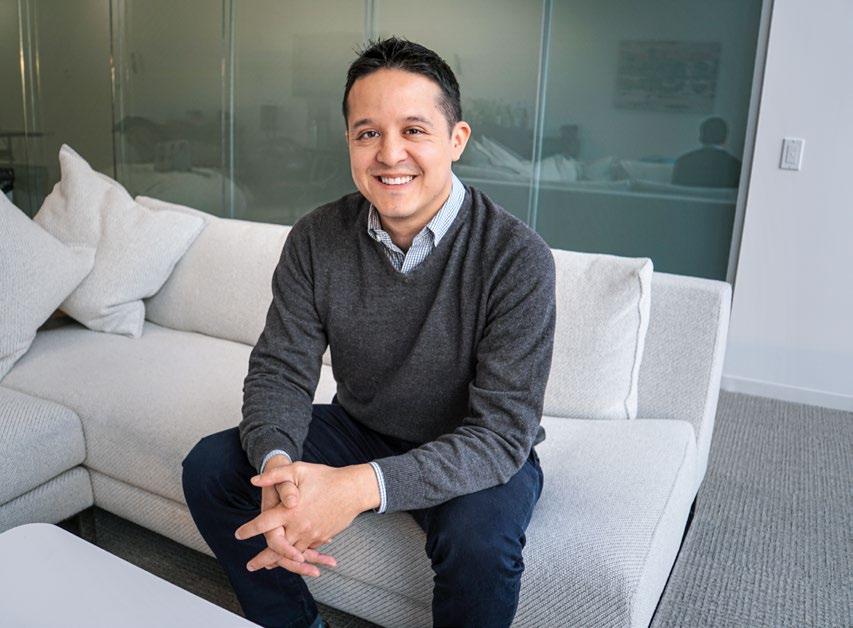
“Never be afraid to have a conversation or to make a connection because of who you are or where you came from.”
Congratulations, Alvaro Almanza on your recognition.
We are honored to partner with you and your team at Kensho Technologies.






Stronger, together.
Serving both the innovators and investors in a rapidly-changing, technology-driven economy, we are committed to promoting diversity in our law firm and in the legal profession.
Learn more at goodwinlaw.com/diversity.
public defender in Santa Clara County and argued and tried cases for half a decade. He also met his wife, a fellow public defender, while collaborating on a complex felony strike case.
In 2014, Almanza and his wife moved to New York City to continue their defense work, a move that (unbeknownst to him) laid the groundwork for his transition to Kensho Technologies. “Our families kept telling us that we worked too much, that we needed to go out and make new friends,” Almanza says with a laugh. “So we went out and tried to meet new people, and one of those people was Daniel Nadler, the founder of Kensho. I started talking to him and bouncing around ideas about IP and tech, and I heard his vision for his company. I think we both very quickly realized that working together felt right.”
Almanza joined Kensho immediately after the company’s Series A investment round, and, along with key guidance from Goodwin Procter, helped bring about its acquisition by S&P Global Inc., which at the time was the largest AI acquisition in US history. Today, Kensho is a multinational, pioneering analytics company whose next-generation financial intelligence products are leveraged by some of the world’s most prominent financial institutions.
To continue with this rapid development of innovative products, Kensho needs to be able to recruit top-tier talent. “But sometimes the perfect fit, the most brilliant person for the job, is not from the United States,” remarks Almanza. In today’s political climate, making sure that those individuals are able to come to Kensho—and stay at Kensho—can be quite a challenge.
As general counsel, Almanza navigates the “very politically complicated” field of US immigration and works to ensure that extraordinary individuals have the opportunities they deserve. “That’s the whole idea of coming to the United States,” Almanza asserts. “It takes a certain type of person to make that journey, and incorporating the brilliance of our immigrants has made us the most successful country in the world.”
DON’T REINVENT THE WHEEL
Immigration laws may at times encumber Almanza’s efforts to advocate for global professionals seeking to join Kensho, but the GC has found other methods of achieving his goal to “do more.”
Throughout his career, Almanza has remained actively involved in organizations such as La Raza Lawyers Association, the Santa Clara County Charitable Foundation, Partners for Justice, and the Hispanic Bar Association.
“I find it inspiring, the way that groups like La Raza enhance and encourage access to both the legal system and law school education,” Almanza says. “La Raza Lawyers formed a charitable foundation, for example, to create scholarships for disenfranchised populations to enable them to go to law school, and the [Santa Clara County Charitable] foundation has grown large enough that it now has a self-sustaining endowment.”
The students who apply for these scholarships are true superstars, Almanza emphasizes. “We have students who have crossed the Rio Grande trying to find a better life, they’ve lost their parents, they’ve lived in fear of deportation—and despite all of that, they’ve graduated at the top of their classes and excelled in law school,” states the GC.
Especially after all they’ve already gone through, these students shouldn’t have to figure out how everything works on their own, Almanza says. “You shouldn’t have to reinvent the wheel. You should be able to get help and learn from people who have already figured out some of the answers,” Almanza points out.
Almanza’s go-to answer? Stay curious and ask questions, even if they seem like “dumb” questions. “There’s a fear that if you ask certain things, you’re going to betray your background,” he reflects. “It’s the fear that you’ll ask a question and hear, ‘Oh, so you don’t know the answer because you’re poor, or because you’re from this demographic.’”
But Almanza urges the students he works with to ask those questions anyway. “You’ll probably hear some negative responses to your questions over the course of your life, but that’s not always going to be the default,” he says. “Never be afraid to have a conversation or to make a connection because of who you are or where you came from.”
Goodwin Procter LLP: “We’re proud to have partnered with Alvaro Almanza as he spearheaded the execution of a series of significant transactions at Kensho
significantly, we are honored to have the opportunity to be aligned with a leader in the legal and tech worlds who embodies the values we hold dear and has such a focus on culture and the importance of diversity in the legal profession.”
—John Egan, PartnerWe are pleased to have partnered with Alvaro Almanza and Kensho Technologies to solve some of their most pressing immigration matters.
Jeff Goldman Immigration is a nationally recognized law firm devoted exclusively to all aspects of business-based and family-based immigration law. Jeff and his team of lawyers are known for crafting strategic employment solutions for startup to Fortune 1000 companies on the cutting edge of the innovation economy, and for their empathetic, transparent and aggressive advocacy for immigrant families’ rights.
LLP: “Alvaro is an amazing and dynamic leader. He is decisive, strategic, sees opportunities where others see problems, knows his business incredibly well, and brings an innovative approach to solving the thorniest of challenges. It has been a true pleasure to partner with him and the entire Kensho team.”
Wilmer Cutler Pickering
—John Butts, Vice Chair Business Trial GroupJeff Goldman Immigration LLP: Looking for the right immigration attorney? Hear this from our client: “Jeff, thank you for helping make this happen. You have changed the life trajectory for our COO and his family, and have measurably increased the probability of success for the company as we grow. For that, mucho gracias!”
 JEFF GOLDMAN Jeff@jeffgoldmanimmigration.com
JEFF GOLDMAN Jeff@jeffgoldmanimmigration.com
 Technologies. More
Hale and Dorr
Technologies. More
Hale and Dorr
Cultivating Growth from a Patent Perspective
As senior patent attorney at Microsoft, Brianna Hinojosa-Smith leads her team with a dual focus on innovation and workplace diversity and inclusion
BY A.J. ZAKIT WAS DURING BRIANNA HINOJOSA-
Smith’s time at BlackBerry that a new job opportunity came to her through LinkedIn. Microsoft—which owns the professional networking platform—reached out to her to gauge her interest in joining the technology behemoth. Today, it’s no wonder that she always encourages people to keep their LinkedIn profiles in tip-top shape.
After years of working in the telecom sector, the idea of shifting to a company that develops a broader range of technologies appealed to Hinojosa-Smith. She joined Microsoft as senior patent attorney in 2016 and now also leads its devices team, which consists of attorneys who support the gaming/Xbox and Surface clients. While her focus is on patent prosecution, Hinojosa-Smith’s daily work is just one factor in her growth at the company.
Microsoft puts an enormous emphasis on a growth mind-set, Hinojosa-Smith says. To her, that means employees constantly learn, challenge themselves, and are not afraid to venture outside of their comfort zones. “When you get to that point of ‘comfortable,’ where you’re doing what you do without making mistakes, without learning, you’re only doing yourself a disservice,” she says. “Stepping outside our comfort zone is what focuses the mind to learn and grow, even if we make mistakes along the way.”
Hinojosa-Smith is well-versed in stepping outside of areas where she feels comfortable. After developing a passion for math and science at a young age, she earned her bachelor’s degree in electrical engineering from Trinity University in San Antonio. Shortly thereafter, while working as an engineer, she started to think about law school. A few years later, she earned her JD from St. Mary’s University School of Law, followed by her MBA from University of Texas at Arlington.
“As an engineer, you have a problem and you figure out the solution. It’s, for the most part, a one-to-one ratio. In the law, however,
it’s rarely black and white. It’s, ‘Here are the different ways that you can approach this and here are the risks to take into consideration.’”
She’s built twenty years of experience in the field of intellectual property law—which encompasses patents, copyrights, trademarks, trade secrets, and more. Her day-to-day work at Microsoft involves understanding what projects the company and its competitors are working on and deciphering the strategic value of pursuing—or not pursuing—patents for a given technology.
Hinojosa-Smith also embodies Microsoft’s commitment to leadership outside of the office. She’s been the intellectual property cochair of the Hispanic National Bar Association (HNBA) since 2018. In 2019, she worked on planning and executing the Intellectual Property Law Institute (IPLI), a weeklong annual program Microsoft spearheaded with the HNBA several years ago. The program brings a group of minority law students to Washington, DC, to expose them to all facets of intellectual property via panels, mock interviews with major law firms and corporations, and visits to government facilities like the United States Patent and Trademark Office. One of Hinojosa-Smith’s takeaways from that experience is that there’s still plenty of work to do in diversifying the IP workforce, which is a Microsoft initiative that she’s especially passionate about.

According to Hinojosa-Smith, Microsoft is not only intentional in its hiring of diverse individuals, but also focused on making sure there is diversity within the partnerships they have with others, such as outside counsel.
“Barta Jones & Foley is one of those firms that demonstrates the D&I perspective we value. They have been intentional about hiring diverse talent and having the attorneys that work on Microsoft patent matters represent that diversity. We don’t just encourage; we incentivize our firms to close the diversity gap by providing bonuses to firms that meet our diversity goals.”
And the team at Microsoft has noticed major benefits as a result of the company’s diversity initiatives, Hinojosa-Smith notes: “We have found that there is huge value in bringing together people from different backgrounds, genders, ethnicities, races, or any other characteristic traits that make them who they are. In fact, having such diverse teams representing us on legal matters has not only produced improvements in decision-making, creativity, and innovation, but has also strengthened our results, lowered our settlement costs, and reduced our legal fees substantially.” She hopes that other companies will tread the same path.
And while diversity is important, Hinojosa-Smith says, inclusiveness is

also key. “It’s not enough to just have more diversity,” she says. “We strive to empower people with the tools for success by ensuring everyone feels included so that people can bring their best self to work and live their best life.” Microsoft makes it a priority to invest in and partner with groups in the legal field like the Leadership Council on Legal Diversity and the Hispanic National Bar Association, which offer programs designed to nurture diverse talent.
“When it comes to D&I, it is not about simply moving the needle forward; it is our responsibility to change culture and behaviors, thus providing momentum for constant progress,” Hinojosa-Smith says.


Reflecting on her past three-plus years with Microsoft, Hinojosa-Smith can see how much she’s evolved as a leader. She credits mentors she’s had along the way, and now she helps others navigate their own paths.
“My philosophy has always been, I want people to grow and step outside their comfort zone; and if they move onto new challenges, either inside or outside of Microsoft, then I’ve helped them defy their status quo,” she says. “I’ve had a couple people on my team move internally to different groups, and while I hate to lose them, it excites me to see them stepping outside of their comfort zone.”
“When it comes to D&I, it is not about simply moving the needle forward; it is our responsibility to change culture and behaviors, thus providing momentum for constant progress.”
At the Service of East Harlem
Health + Hospitals/Metropolitan CEO Alina Moran
BY BILLY YOSTALINA MORAN LEADS THE HOSPITAL WHERE SHE WAS born. Indeed, the CEO for NYC Health + Hospitals/Metropolitan is proud of her special connection to the expansive institution, where she’s worked for three and a half years, while having been part of the greater NYC Health + Hospitals system for more than nineteen.
When Moran was born, her parents, both from Puerto Rico, sought help at Metropolitan because they were underemployed and lacked insurance. Today, that personal connection helps remind Moran to put patients first. It’s also motivated her to partner with organizations in East Harlem to better serve not only Metropolitan’s patients but the community at large.
Moran’s path to Metropolitan started with her acceptance into the National Urban Fellows program, a leadership development organization that focuses on women and people of color. Its stated mission of developing “accomplished and courageous professionals of all ethnic and racial backgrounds, particularly people of color and women, to be leaders and change agents in the public and nonprofit sectors with a strong commitment to social justice and equity” lined up perfectly with Moran’s goals and drive. Through an internship at Bellevue Hospital, she met CFO Aaron Cohen, who Moran says became an invaluable
NYC
ensures the hospital is an integral member of the community
mentor to her, and she was ultimately hired by the hospital as a finance director.
One of the backbones of Moran’s leadership is the importance of mentorship, in part due to the guidance she’s received from not only Cohen but also former Elmhurst Hospital CEO Chris Constantino. “I credit both Aaron and Chris for supporting me, mentoring me, and sponsoring me to become the CEO that I am now,” Moran says.
She sits on the board for the National Association of Hispanic Healthcare Executives and says she’s able to provide both formal and informal mentorship to future leaders.

“I know the importance of mentorship and sponsorship,” she says. “I want to extend my hand to make sure our rising Latinx leaders in healthcare understand the importance of giving back to their communities.”
Moran certainly walks the walk. Metropolitan regularly partners with community organizations in order to better connect the East Harlem community with its citizens in need. One such partnership was with Sista’s Fulfilling Dreams—an organization created by five entrepreneurial women intent on improving their own community—in an event called Wig It For Cancer, which
Alina Moran CEO NYC Health + Hospitals/ Metropolitan“I want to extend my hand to make sure our rising Latinx leaders in healthcare understand the importance of giving back to their communities.”
provides people undergoing cancer treatment with wigs made from human hair. “Wigs are things that, depending on their socioeconomic background, people in our communities can’t always afford,” Moran says. “We were able to provide joy to fifty of our patients.”
Metropolitan also partners with many senior healthcare organizations to provide information, education, and assessments for a growing patient population in need of support. “We want to make sure we’re a partner in all these efforts not only for the hospital, but for our larger community,” Moran says.
Moran connects with her community as a board member of the East Harlem Community Alliance. She says the board is a perfect cross-section of organizations that gather quarterly to share their experiences and work to promote services in East Harlem. Those initiatives include working to better promote the community, strategizing interorganizational opportunities to share resources, and looking for ways to promote the use of services located within the East Harlem community.
While the CEO is often focused on the financial health of the hospital, she also deeply understands the need to be connected to patient experiences. Metropolitan includes a Patient Family Advisory Council that Moran says provides an open dialogue for patients to share their stories. “We love when we’re able to celebrate successes, but we’re also aware that there are opportunities for us to improve, and it gives us the chance to work together in those efforts,” she says. “Our values at Metropolitan [ICARE: integrity, compassion, accountability, respect, and excellence] recognize that our patients and families are undergoing an often uneasy situation, and we want them to have the best experience they can have.”

For the last three years, Metropolitan’s community efforts have been largely focused on the management of chronic diseases like diabetes and hypertension. Supplemental treatment and lifestyle integration opportunities have ranged from apps that measure blood sugar and connect directly with clinicians to cooking classes for those looking to change their diets. There’s even a farmers’ market from June to November; participants receive “healthy bucks” they can exchange for food. “It’s almost a food prescription,” Moran says.
It’s just another way to show that Metropolitan is committed to the community outside of its doors—and Moran is intent on being the one holding open the door.
Crothall people are Passionate about their chosen profession. Passion drives efficiency. Passion drives effectiveness. Passion drives productivity.
Crothall is Passionate about providing Environmental Services, Healthcare Technology Solutions and Sterile Processing Services for NYC Health & Hospital.
We are proud to be a part of your team.
The Real Property Value
BY BILLY YOSTDAVID CHAVEZ, SENIOR ADVISOR AT SVN |
QAV & Associates, has spent the last three and a half decades in the commercial real estate business—a path he says is unusual for someone who didn’t grow up wealthy. Chavez was raised in a mining town in Arizona until the age of nine, when his family moved to the Bay Area. He earned a BA in political science from Stanford University in 1972 and a JD from the University of California’s Hastings College of the Law in 1975, which makes him a part of what he calls the first real wave of Latinos pursuing postsecondary and graduate degrees.
His path after graduation wasn’t entirely clear at first— he didn’t have a lot of role models, especially in the field he wanted to pursue. “Commercial real estate is a pretty gentrified business,” he says. “You may spend the first five years not making much money, and that is a huge hurdle for anyone who has maybe already put off marriage and a family to pursue their education.”
But Chavez was able to put aside a small cushion for himself working in the securities arena while he learned the business, and over the last thirty-five years, he has found ways to make his business interests intersect with public and private projects that positively affect thousands of people every year.
GOOD FOR BUSINESS, GOOD FOR THE SOUL
Over the course of his career, Chavez has managed to consistently find ways to help what he calls “forgotten
communities” through his commercial real estate work in northern California. In the late 1990s, a friend of his who was on the board of the Tiburcio Vasquez Health Center approached Chavez when the center wanted to open an additional clinic that would specialize in treating underserved, typically poor patient populations. Chavez was able to locate a site in Hayward, California, that had the right zoning and was accessible by public transit; the twentyfive-thousand-square-foot clinic now sees more than fifty thousand patient visits a year.
Chavez replicated this success with another clinic of the same size in San Leandro, a neighborhood that had high infant mortality rates, which now serves as many patients as the Hayward clinic. There was an additional bonus. “The big thing for me when these transactions are completed is to go by the site and see all of the people who are getting work thanks to the deal being completed,” Chavez says. “That’s always one of the most meaningful parts of my job.”
In West Oakland, Chavez balanced the needs of a local church congregation in a historically black neighborhood that was also a food desert. After acquiring a warehouse in the neighborhood, Chavez worked with the Mission Baptist Church to upgrade and lease their parking lot to build a grocery store. This deal meant an influx of revenue for a church struggling to maintain its operations while bringing much-needed food access to an underserved community.
David Chavez has spent more than three decades finding ways to succeed in commercial real estate while helping underserved populations in the process
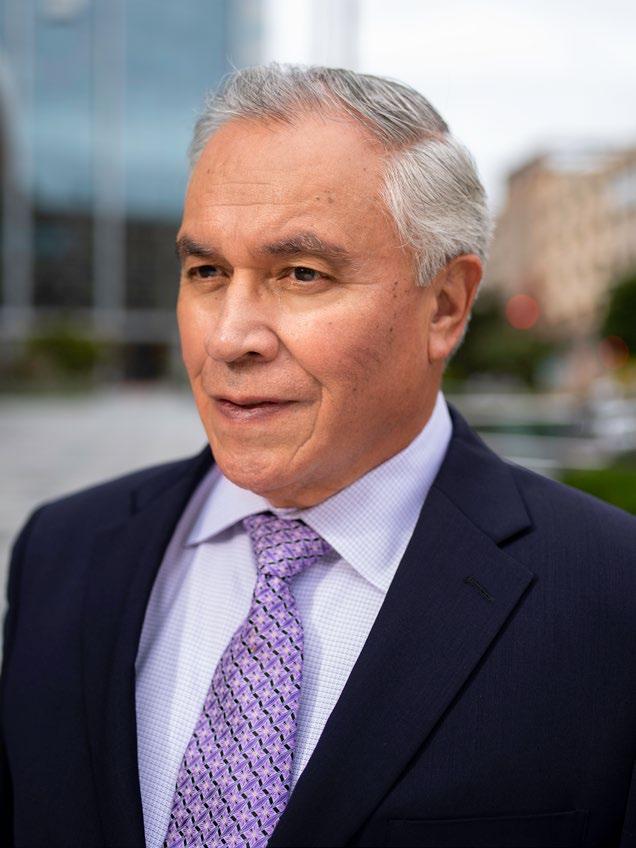
LEAD FROM THE FRONT
For the last fifteen-odd years, David Chavez has been an avid cyclist. The road-biking enthusiast recently completed the sixty-four-mile Napa Valley Eagle Cycling Club Bike Tour and the seventy-three-mile America’s Most Beautiful Bike Ride; he ended 2019 by riding the seventy-fivemile El Tour de Tucson. Even an accident in 2010 that required him to be airlifted out hasn’t slowed him down. “It just makes me more present,” Chavez says. “I absolutely love it.”
PULLING A RABBIT OUT OF A HAT
Last year, Chavez was tasked with a proposition that seemed impossible from the get-go. An affordable housing developer needed to locate temporary facilities for a homeless assistance program for eighteen months while it built a ninety-unit affordable housing structure where those homeless outreach programs would operate on the ground floor. This was all happening in the conservative-leaning and affluent Walnut Creek. Through cooperation with the city staff and city council and the efforts of the homeless outreach director, Chavez located a former shopping center with public transit access and the necessary requirements to serve the city’s homeless population. “That was really sort of like pulling a rabbit out of a hat,” Chavez says, laughing. “But we were able to pull it off.”
The Veterans’ Administration has also been a beneficiary of Chavez’s work in California’s Central Valley, helping find a site for a 150,000-square-foot prospective hospital and 150,000-square-foot medical clinic. This was to replace an antiquated facility in Livermore which was constructed in the 1930s. The project was so huge that multiple congressional districts were petitioning hard for the site, knowing well that a groundswell of construction and infrastructure often results in more new business and more money in the communities. In an even more impressive feat, Chavez also identified a twenty-acre site in San Francisco, possibly one of the most real estate–starved cities in the nation, on behalf of the VA, which needed to expand its operation.
SHOW UP WITH CONFIDENCE
Chavez says that with all his years in the business, he’s only recently started seeing more Latino names in his field. “You may see more Latino presence in retail-oriented type businesses, but once you get more into the corporate real estate arena, I think the subjectivity of the business can present a lot of challenges for people from our communities who didn’t grow up in these environments,” he says.
He does have some advice for Latinos who want to get into commercial real estate—or any other field. It’s imperative, Chavez says, to show up with confidence and without any self-imposed barriers. “You don’t need to focus on your Latino experience or that you’ve had some sort of handicap for one reason or another. Be confident about who you are and what skill set you’re going to be able to provide your client,” Chavez says. “The value that you can provide should always be your focus.”
“That value that you can provide should always be your focus.”
STRA TEGY Strategy

Intelligent Cars Need Smart Auto Part Suppliers
In an era of fast delivery, Advance Auto Parts’ Adolfo Rodriguez helps provide motorists with peace of mind
BY RUSS KLETTKEIT’S NEVER A GOOD THING WHEN
the “check engine” light appears on a car’s dashboard. It’s a disruption no one wants.
While Adolfo Rodriguez, the senior vice president of IT transformation at Advance Auto Parts (AAP), understands how to apply technology to help motorists fix cars quickly, he also feels the emotions of the company’s end users. “Cars are a source of pride to most people,” he says. “They’re more than just transportation. Our customers have a passion for their vehicles.”
Rodriguez joined the sprawling company in mid-2018, where he was charged with coalescing systems acquired over the past decade into a more seamless company poised for growth. Considering AAP generated nearly $9.6 billion in net sales in 2018, Rodriguez’s task was daunting—but essential to the firm’s nearly five thousand brick-and-mortar stores, its e-commerce sales channel, and a new omnichannel partnership with Walmart.com.
Via each of those channels, that task required the transmittal of one or more of a million different stock keeping units to the person doing the repairs. Speed matters, as does order fill accuracy. The company takes it a step further by providing a library of how-to videos for free on its own website and YouTube, all a part of a company ethos that is about creating the best possible customer experience.
Best-in-class logistics and distribution center technology are part of it, of course. Those million-plus parts—headlights to wipers to hub bearings—are sent by various means to where they are needed. But don’t call this “IT.” Rodriguez points out that the term is limiting, preferring instead to simply say “technology.”
“IT historically served business and marketing strategies,” he says. “Now, technology is part of everything. We really think of building Advance Auto Parts as a tech-
nology company that helps you care for your car. The experience of service is what tech enables.”
Behind all of that is a set of strategies that Rodriguez has been following since joining the company. One is evolving the “tech stack,” meaning how they line up the layers of software inherent within an organization of consolidated companies.
“We also want to be more technology- and engineering-centric around value to customers,” Rodriguez says. “This includes leveraging our technology to reinvent the user experience.” He says that means having the best e-commerce and catalog tools for right-part-rightplace delivery. Cloud-based computing and software development factor heavily into that.
Rodriguez traces his family roots to Peru, and his father received his education in the US as an engineer with IBM. It does not escape him that a large segment of AAP customers are Hispanic. “It’s an important demographic for us,” he says. “It’s super interesting to me, that in particular—this is especially so with Spanish-speaking people in the repair and do-it-yourself markets.”
Rodriguez initially set out to avoid following in his father’s footsteps by majoring in pre-med. But he discovered he really did prefer math and logic over the health sciences, earning his bachelor’s degree in computer science and math and a master’s and PhD in computer science from Duke University (he even became an adjunct professor for short time). With no small degree of irony, he ended up spend-
“We really think of building Advance Auto Parts as a technology company that helps you care for your car. The experience of service is what tech enables.”
ing more than a decade rising through the ranks at IBM, achieving the title of distinguished engineer and CTO of connectivity and integration. From there he moved to Citrix, a software firm, where he led a family of cloud services before joining AAP.
Despite being so deeply engaged in bits, bytes, and business, Rodriguez is actively involved in athletics and music. He currently coaches soccer at his daughter’s school and has over time done similar volunteer work with as many as thirty youth soccer and basketball teams.
This melds with an underlying philosophy of what he experiences in business. “We should never stop learning,” he says. “That includes being committed to learning how to coach others. I learn as much from my teams as they learn from me.” He says this influences his ability to lead the roughly five hundred technology workers at AAP.
As an artist, Rodriguez plays in a band called Mind the Gap that exclusively plays to raise funds for worthy charities. “It started as a gag about ten years ago,” he says. They then were just imitating a band as video game air guitarists but eventually learned to play real instruments. Now, they headline charity events, cumulatively raising $250,000 for such causes as one focused on bringing clean water technology to a village in India.
Rodriguez understands the passions of motorists who need car repairs, and he devotes himself to making the processes tied to those repairs as easy and intuitive as possible. But he also brings his own brand of passion to inspiring fans of music—where technology is incidental to what it creates.
Steer Your Own Ship
Rob Negron, lead director and associate general counsel at Equitable, believes you can take your career wherever you want it to go—because that’s exactly what he’s done
 BY STEPHANIE ZEILENGA PHOTOS BY GILLIAN FRY
BY STEPHANIE ZEILENGA PHOTOS BY GILLIAN FRY
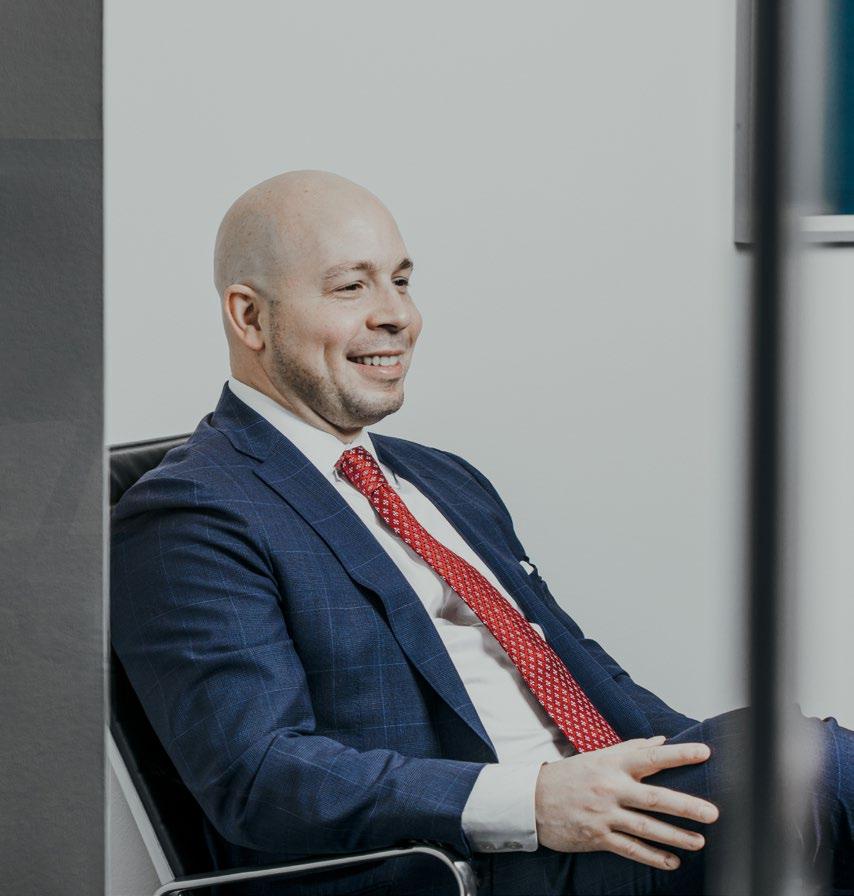
“YOU
HAVE TO GRAB THE REINS EARLY,”
ROB
NEGRON
says. “If you don’t steer yourself, you’ll end up wherever the wind blows. It’s up to you to make sure you’re on the path you want to be on.” Negron has relied on this philosophy as he’s guided his career exactly where he wants it to go, unafraid to shift directions or take on responsibilities outside his comfort zone.
Today Negron is lead director and associate general counsel at Equitable, a life insurance and financial services company covering households in the US and Puerto Rico. He began his career, however, at a law firm specializing in commercial litigation. Realizing after seven years had passed that he was still stuck working long hours and not having the work-life balance he envisioned, he made a change, transitioning to an in-house role at MetLife. “I took a look around and said, ‘I don’t know if I want this to be the next thirty years of my life,’” Negron says.
He landed at Equitable as a regulatory attorney in 2012. “I wanted more responsibility, and Equitable seemed like a good fit,” Negron says. “I had a good connection with the person who would be my boss—we went to the same law school, had both worked at MetLife, and are of a similar mind-set. Once you realize how much time you spend at work, it becomes important to work with people you care about and can collaborate with.”
Negron found the delicate balance of risk and opportunity inherent to the insurance industry intriguing. “As a lawyer, my job is to manage risk—we tend to be risk-averse. But an insurance company makes money by taking and managing risks,” he says. “It’s an interesting tension that requires you to be creative as a lawyer. You can’t just say ‘no’ to your clients. You have to find solutions that work for both sides.”
Today, Negron oversees nine direct reports, including attorneys and government relations professionals, and he’s responsible for Equitable’s regulatory affairs function. “Insurance is a heavily regulated space, and my job is to help my clients navigate it in a way that helps them accomplish their objectives but not take on undue risk,” he says.
His team is responsible for managing the company’s interactions with state and federal regulators to ensure Equitable’s products get approved for sale, and also to help educate regulators about Equitable’s customers and the products it offers to help customers meet their goals. When necessary, Negron leads the company’s advocacy efforts with respect to proposed changes in laws. “For example, in one state the regulator felt that the law as it was written didn’t support what we were trying to do, so we worked with the legislature to have the law updated so the regulator could feel comfortable approving the product based on the updated language,” he explains.
Last year, Negron and his team helped Equitable undergo an IPO by its French parent company; in 2020, the company will launch
a rebrand as a fully independent public company. “We worked with regulators to get the company prepared for the IPO,” Negron says. “This is a big sea change for us, as we’ll have more flexibility to go in different directions. As a public company, we now also have to report to investors and be prepared to undergo a lot more scrutiny and press coverage. It’s been an exciting challenge.”
Part of the reason Negron rose to his current role is his willingness to step up to new challenges. For instance, eighteen months after he arrived at Equitable, the lead privacy attorney retired. Negron, who always had an interest in privacy-related issues, volunteered to step in. “It wasn’t quite within my job description, but I still do the job today and I enjoy it,” he says. “It’s been interesting work that’s allowed me to expand as an attorney—an opportunity I wouldn’t have had if I hadn’t stepped forward.”
A knack for building strong relationships has also been key to his career success. “If you don’t have good relationships and don’t build up credibility to become a trusted advisor,
“As a lawyer, my job is to manage risk—we tend to be risk-averse. But an insurance company makes money by taking and managing risks. It’s an interesting tension that requires you to be creative as a lawyer.”

Congratulations Mayer Brown congratulates Rob Negron on this welldeserved recognition.
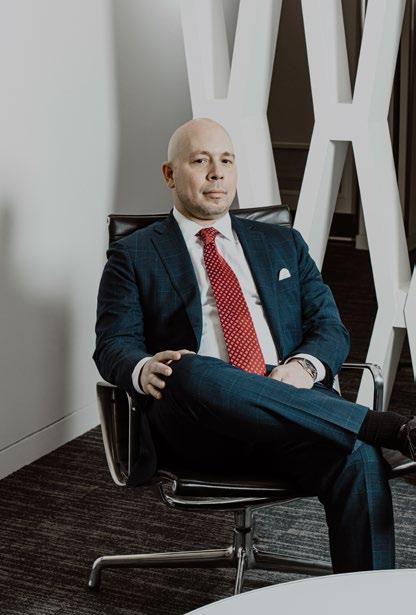
We are proud to partner with him and the whole EQH team.
Americas | Asia | Europe | Middle East mayerbrown.com
“If you don’t steer yourself, you’ll end up wherever the wind blows. It’s up to you to make sure you’re on the path you want to be on.”
then you can’t have those tough conversations on how to manage risk appropriately and arrive at good outcomes,” Negron says. “We make money when we sell our products and services, and sometimes lawyers have to make tough decisions that impair that. You have to be creative to see around issues, and it’s an invaluable skill for me and my team to learn to just stop and listen first.”
Negron has also had to learn how to manage employees—an entirely different skill set than the technical expertise required for law. His leadership philosophy continues to evolve, but is based on a belief that a good leader is authentic, sets the tone, and gets out of the way. “The most important thing is to be yourself as a manager and to support folks as professionals, allowing them to get the work done as they see best,” he says.
Negron’s words of advice to future lawyers or those just starting out in their careers mirrors the advice that has served him so well on his own journey: “It’s easy in a big company to get swallowed up by the machine. Don’t forget that you can exert a pretty big degree of influence over your career.”
Continue to lead and inspire
Building the Destination, Not Just the Resort
Club Med Associate General Counsel Paola Mora is helping open the company’s largest resort in the Caribbean in forty years
 BY BILLY YOST
BY BILLY YOST

PAOLA MORA, DIRECTOR AND ASSOCIATE general counsel for Club Med, North America, was entrenched in Club Med’s biggest resort opening of the 2000s when Hispanic Executive caught up with her. It was just two weeks before guests would begin arriving at Club Med Michès Playa Esmeralda, a new addition to the company’s Exclusive Collection portfolio located on ninety-three acres of beachfront land in the small town of Michès in the Dominican Republic. Mora was in the midst of working with the project team and dealing with licenses, permits, thirdparty provider contracts, transportation, cleaning, excursion teams, and any other pertinent international legal concerns that might touch an all-inclusive resort.
It seems like Mora should sound more stressed, but she doesn’t. The native of Bogotá, Colombia, has been with Club Med—which created the all-inclusive vacation model—since leaving the US Army in 2000. “I traded in my combat boots for my flip flops,” she jokes. But Mora’s growth at the company has been anything but a breeze.
Mora started at Club Med as executive assistant to the company’s general counsel, Eileen Kett. She didn’t yet have her bachelor’s degree (she was working on finishing it), much less a JD. “This company is known for fostering talent and for helping employees grow,” she says. “That’s what happened to me. I went from being my boss’s executive assistant to one day being her successor.”
After earning her bachelor’s degree, Mora went on to earn her paralegal certificate, working for Club Med the whole time—first as a contract administrator, then contract manager, then as a legal affairs director. She attended law school at night while working full-time. In 2018, Mora took the final step and passed the Florida Bar on her first try. All the while, she was also raising her own family. “I was taught by my dad that you have to work hard for what you want in life, nothing is handed to you,” Mora says. “I’ve always kept that in mind.”
Mora’s present duties are best illustrated by the efforts she and Kett have made to bring the new Michès resort to life. Club Med communications manager Joseph J. Nuñez says that he visited the site where the resort now stands before it was built, and the difference is staggering. “I was there a year and a half ago, and there was no road for me to get there, no water, and no electricity,” Nuñez says. “Paola and Eileen have really been leading the legal aspects of the development and construction of this project that was just a massive beast.”
“We’re pioneers in the industry,” Mora says. “We don’t just build hotels; we build destinations.” At the company’s Punta Cana location, Club Med even built the airport that would allow tourists to arrive. Michès was similar: Mora had to work collaboratively not just with a litany of third-party providers but also with all of the local governmental regulators that accompany infrastructure building. “There’s a key in building relationships with people,” Mora says. Her knowledge of the Latin culture and fluency in the Spanish language were key and extremely helpful. “Club Med is focused on being in destinations for the long haul; therefore, finding the right local advisors and partners is critical to the success of any project.”

“This company is known for fostering talent and for helping employees grow. That’s what happened to me. I went from being my boss’s executive assistant to one day being her successor.”
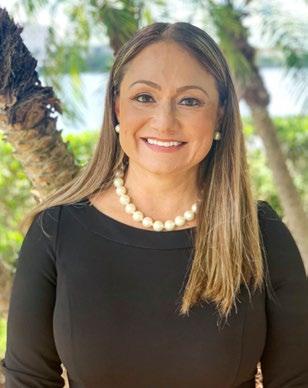
AN EXCLUSIVE GETAWAY
The resort that has taken up so much of Paola Mora’s time has truly earned its bandwidth. The $100 million Club Med Michès Playa Esmeralda in the Dominican Republic is the largest project for Club Med in the Caribbean in almost forty years (and the whole of North America in twenty). The 335-room resort is divided into four “boutique villages,” two adult-only and two family-friendly. The property includes four bars, four restaurants, three wine cellars, and a coffeehouse. The resort has also gone through great efforts to reduce its environmental footprint: it replanted all of the trees that were taken down during construction and not only has a “no single-use plastic” policy but also a farming program that works with the local community to develop and teach children, and their parents, about sustainable farming techniques and about eco-gardening.
The successful opening of Club Med Michès Playa Esmeralda may be the most tangible evidence of Mora’s success, but it’s not her only motivator. She says that the people at home who watched her work her way through law school, and the bar exam are the ones who motivate her to succeed. “I think it’s been a great example for my fourteen-year-old Gabriela and eleven-year-old Andres to see how hard I’ve worked to get where I am,” Mora says. “I always tell them that no dream is too big, no star is too far, and that if set your mind to it, you will do it.” Considering her long tenure at Club Med, it seems like Mora has earned herself a serious vacation.
The world’s leading organizations choose Proskauer as a strategic partner to drive their business forward. We are entrepreneurial, inclusive, and committed to making a difference for good. Our 725+ lawyers serve clients from 13 offices in the Americas, Europe and Asia.

No Expiration Date
Edgar DeGuia of Dean Foods is helping to modernize the food and beverage company as it eyes its one-hundredth birthday
BY WILL GRANTDEAN FOODS ISN’T JUST THE largest dairy company in the United States. Headquartered in Dallas, the ninetyfive-year-old food and beverage company includes more than fifty brands and operates its sixty-six manufacturing facilities in thirty-two different states, employing more than sixteen thousand employees.
Vice President, Treasurer, and Head of Investor Relations Edgar DeGuia has been part of Dean Foods since 2009 and has risen through seven roles to his current position. He got his start at the company as a supply chain analyst, traveling to dozens of plants
and conducting studies on efficiency and processes. These studies had DeGuia literally in a cooler with a stopwatch to time the different activities. It’s times like these, he explains, that he reminds people that the money is made in the plants, not the corporate offices.
The VP credits the great mentorship he’s received at Dean for his eventual ascension to where he is today. DeGuia’s path to his current position hasn’t necessarily been easy. He grew up in a hardworking Filipino household, and shortly after getting a bachelor’s degree in economics from Duke University, he wound up in a white-collar job at Wyndham hotels—the same company where his father had been a blue-collar worker for many years. After working a few more corporate finance jobs and getting his MBA, DeGuia was finally hired at Dean Foods.
His present role has come with its own challenges: Dean has been in the midst of a modernization effort that has provided its fair share of growing pains. The focus on systems improvement and cost reduction necessitated a $715 million refinancing effort to execute the strategic reorganization and modernization efforts. The goal is to emerge with a low-cost platform that will help the company compete with smaller competitors, DeGuia explains. This, ideally, will lead to a more efficient and forward-facing Dean Foods.
Though undergoing an extensive business evolution, Dean Foods still recognizes the need to help employees who are facing their own struggles. The Milk Money Relief Fund provides short-term assistance to employees who are experiencing financial need as a result of home catastrophes or natural disasters like hurricanes.

“In times of crisis, we proactively and urgently support the communities where we do business,” a company statement reads. “Working with our regional plants, we’re able to combine financial support with product donations.” DeGuia adds that he personally knows several members of the company’s corporate team who have gone above and beyond the call of duty on behalf of the wider Dean’s family.
DeGuia says the larger employee population has been even more present in his mind ever since he attended a recent diversity and inclusion event. Demonstrating Dean Foods’ commitment to wider diversity, he says, starts with the effort required to get those jobs where making change is possible. Diversity is so important, but you’ve really got to work for it, DeGuia says. By proving yourself, you can have a voice and add to the decision-making process.
Optimizing working capital performance for innovative business leaders.

For the Love of Creating Culture
Sergio Ezama has overseen HR from Russia to Africa for PepsiCo, and he knows that the company is only as good as its employees
 BY BILLY YOST
BY BILLY YOST
OVER THE LAST EIGHTEEN YEARS,
Sergio Ezama has held eleven roles for PepsiCo in geographic and operational environments as diverse as the company’s products. Currently chief talent officer for the company and chief human resources officer of all global groups and functions, he’s been headquartered in Barcelona, Geneva, and Moscow, and is currently based out of Pepsi’s global headquarters in Purchase, New York.

Prior to undertaking his current dual roles, the executive oversaw human capital agendas from Europe to sub-Saharan Africa, covering 65 different countries and 45,000 associates. Those numbers grew when Latin America was added to his portfolio, heading the HR agenda for $20 billion in revenue and more than 125,000 employees in nearly 100 countries. In his current role, Ezama leads both the enterprise-wide talent management practice and HR generalist agenda for teams across the globe, including finance, commercial, e-commerce, and supply chain.
All of this is to say that when Ezama talks about the role of HR for Pepsi, one of the world’s most recognizable names in food and beverage, everyone should be listening.
THE DIFFERENTIATOR
“Talent management is not necessarily that different when you consider similar businesses to ours,” Ezama says. “I think we all apply the same tools and methodologies. We’re extremely thorough in our approach.”
The differentiating factor, then, is the people—and the culture that companies are able to build around those employees. That’s where Ezama says it’s essential to be very clear about the goals of the organization. “You have to be intentional; culture cannot be left to chance or luck,” Ezama says. He explains that achieving success is a two-pronged strategy. “First, you have to be credible. As one example, you can’t say
“You have to be intentional; culture cannot be left to chance or luck.”
BTS USA, Inc. congratulates o ur friend and client
Sergio Ezama Chief Tal ent O fficer and CHRO at Pepsico
For well-deserved recognition of his outstanding leadership and accomplishments.
We are honored to work with Pepsico as their broader people partner.
www.bts.com

you welcome all different kinds of talent and when that talent walks through the door, they find it to be the very opposite,” Ezama says. “Second, your culture needs to be credible but aspirational. You need to recognize where you are and also be mindful that there are gains to aspire to in support of the strategic intent of the corporation.”
There is an array of factors to consider in building culture at the company. “When I hire talent, am I hiring people that I know will thrive in the culture I’m trying to build?” Ezama asks. “When I think of careers in PepsiCo, am I assessing for the right expectations of a leadership profile and designing programs so that the ways we define culture and expectations are front and center?” The answer must be a resounding yes.
Ezama says that all of these components resemble the challenges of architecture: every piece must be considered and placed accordingly, otherwise the whole thing falls apart.
A CHANCE TO REDEFINE
Longtime PepsiCo CEO and chairman of the board Indra K. Nooyi recently retired and was replaced by Ramon Laguarta—and with a new CEO and chairman came a chance to examine the company’s vision. “We spent three or four months with select leaders trying to codify the strategic framework for the company with culture being prominently discussed and featured,” Ezama says. “We were very intentional in identifying six major capabilities that we

“My moral compass and the values that I hold keep me very much in sync with what PepsiCo offers.”
think will make or break our ability to deliver against the expectations of our shareholders.” Gone are the laissez-faire days of fat margins and double-digit revenue growth with plenty of money to spread around, he says, and so identifying which building blocks are crucial to success will pay dividends down the road.
The other component comes back to culture at PepsiCo. The leaders defined seven key aspirational behaviors that are critical for the success of both the company and its associates. “We have been very deliberate in how we hire, assess, develop, pay, and recognize those cultural tenets,” Ezama says. “That culture connection is also going to benefit us moving forward.”
As partners with PepsiCo, strategy implementation firm BTS USA has seen firsthand the company culture that’s being fostered by both Laguarta and Ezama. “Ramon and Sergio’s leadership at PepsiCo is grounded in humility, courage, and deep care for people,” says Jessica Parisi, president and CEO of BTS USA. “At the forefront of the CPG industry, their leadership is already resulting in innovation, speed, and superior returns. Shareholders agree with stock up 40 percent.”
CRITICAL EXPERIENCE
Ezama’s own success, he says, is a testament to the way that PepsiCo seeks to build its leaders. “We talk a lot about the concept of critical experiences here, trying to provide people with different settings in which to operate,” Ezama says. “You use different muscles in the US than you do in emerging markets like Turkey or Russia, and the same goes for operating models and business stages.” The executive says that in his various roles, he’s had to think about achieving success through so many different lenses that by the time he got to a senior position, he was able to relate to the vastly different realities of different parts of the business.
It’s why eighteen years at the same company feels to him more like a career at a variety of different businesses with a united goal. “The diversity of experience has made an essential difference for me,” Ezama says. “My moral compass and the values that I hold keep me very much in sync with what PepsiCo offers.”
NEVER UNDERESTIMATE THE POWER OF HUMILITY
Sergio Ezama has repeatedly achieved global success in vastly different markets— yet he says that he approaches most situations in exactly the same way. “I’ve always found it’s useful to use my two ears instead of my one mouth to understand what the situation is before I exercise my judgment,” the executive says. “Humility goes a long way.”
That same humility also leads Ezama to laud his teams, which help him manage two roles that aren’t often held by the same individual. “I have fantastic leaders on my teams that make me a better leader,” he says.
We honor Letty Anguiano’s commitment to excellence
Letty Anguiano of Mechanics Bank is recognized for her commitment to excellence in corporate law and for being a pillar in the Hispanic community. We’re honored that she’s among the many industry leaders of all size businesses that rely on Thomson Reuters Legal Solutions to help deliver unparalleled service to their businesses.
Mechanics Bank Goes Big
After a $2.1 billion merger last year, Mechanics Bank is now the fifth-largest in California
BY ROLAND ARCHERMECHANICS BANK, BASED IN Walnut Creek, California, has been around since 1905—but last year it got a lot bigger. In September 2019, it acquired Rabobank N.A., growing from 44 branches to 144 in the process. While it’s unusual for smaller banks to acquire larger ones, the $2.1 billion merger not only added Rabobank’s one hundred locations to the combined company, but increased Mechanics Bank’s assets from about $6 billion to more than $17 billion.
The merger better equipped the bank to make large loans and take on large customers, while still prioritizing customer service, company spokesman Greg Jones told the Sacramento Business Journal last fall. “We are filling in the void between the large national banks and community banks,” he said.
Our commitment to a higher level of responsiveness and personal attention to its clients’ needs is perhaps the most significant reason for the success and continued growth of the firm.
Prenovost, Normandin, Bergh & Dawe prides itself in providing high-quality, cost-effective legal services reflecting high standards of innovation, ethics and professionalism.


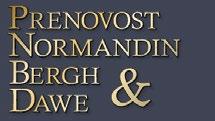





Now the fifth-largest bank in the Golden State, the company has vowed to maintain its commitment to its customers and communities.
“We believe this strategic combination of two highly complementary franchises will unlock significant value for our shareholders, clients, employees, and the many communities served by the new Mechanics Bank,” Carl Webb, chairman of the board of Mechanics Bank, said in a September 2019 statement. “We are pleased to have closed such a major transaction less than six months since announcing our acquisition plans, and we now look forward to putting the tremendous resources of this unique financial institution to work for all of our constituents.”
Although the merger expanded the horizons of the 115-year-old company, it also provided its share of challenges. A well-prepared legal team is key to a successful transition, and Letty Anguiano, vice president and associate general counsel for Mechanics Bank, tells Hispanic Executive that the acquisition has involved some changes for her department. In the past, she says, her team has been made up of generalists, with everyone doing a little of everything. Now that they’ve gone from two lawyers plus a general counsel to six lawyers and a GC, they’re shifting gears to target more specific roles.


Mechanics Bank also operates CRB Auto, a lender that purchases auto contracts from franchises and independent vehicle dealerships in fourteen states. John DeCero, the CEO of Mechanics Bank, told the Orange County Business Journal in 2019 that despite difficulty in the car-lending industry, CRB performed well with declining delinquencies in its accounts. That kind of performance was instrumental in helping Mechanics complete its merger.
“We hope to do a lot more business in Orange County,” he told the newspaper. “We’ll have more capacity and our capital is going up significantly.”
With those kinds of prospects and a shift to specialization from a company that’s already proven its ability to expand exponentially, the future looks bright for Mechanics Bank.
Thomson Reuters has been providing attorneys with the tools to thrive for over 100 years. Over 85% of the AmLaw 200 and thousands of top corporate law departments rely on our industry-leading products and services every day. Our research platforms, editorial expertise, legal operations solutions, and reference materials provide the trusted answers you need in today’s rapidly evolving legal landscape. Thomson Reuters solutions for corporate legal departments of all sizes include Practical Law Connect, the most-trusted know-how solution for working attorneys; Westlaw Edge, the AI-powered gold standard in legal research; and powerful legal operations platforms including HighQ and Legal Tracker.

Microfinance Causes Major Impact

At the nonprofit organization Pro Mujer, CFO Camilo Mendez helps provide opportunities for women in Latin America
BY KATHRYN KRUSEToday, Mendez’s job as chief financial officer at Pro Mujer allows him to help women in Argentina—as well as women in Bolivia, Peru, Mexico, Nicaragua, and Guatemala. The nonprofit organization was founded in 1990 by Lynne Patterson and Carmen Velasco, two pioneering teachers working in Bolivia who realized that the mothers of the children they were teaching could also benefit from their help. The pair began teaching health and leadership skills to the women, then with the help of grants, added financial education and microloans to their arsenal. Over the years, the organization has expanded to other Latin American countries and established its headquarters in the US, but it remains committed to offering women in underserved communities access to finance, health, and educational services.
Throughout that time, Mendez says, “Pro Mujer has held steady to its focus on impact.” In fact, that’s why he chose to join the organization in 2014. He’d spent the decade before that working with microfinance investment vehicles (MIVs) while exploring how to pair social justice and finance. When the opportunity to work with Pro Mujer presented itself, he was happy to make the move. Drawn to the organization’s clear mandate, Mendez cares more about making an impact than growing for growth’s sake.
In fact, his career is built on a combination of passion and pragmatism. “I figured there would be more jobs in finance,” Mendez says. “But then I thought about how finance can be coupled with my values.” Early in his career he worked on a project to build low-income housing in Mexico. “Every year this sector built five thousand affordable homes,” he says. “This felt tangible.”
As Pro Mujer’s chief financial officer, Mendez shepherds all financial aspects of
Camilo Mendez grew up with an interest in social justice, thanks in part to the fact that his family came to the US as political refugees from Argentina in the 1970s, and, after settling, his mother worked in immigration law. “It is critical to be aware of inequality,” Mendez says. “It was part of my every day to think that my job is not just a job.”
the organization—no small task. While the organization specializes in microlending, along with healthcare and educational services, it has disbursed more than $3 billion in small loans since its founding in 1990. Mendez oversees at least nine operating companies on a monthly basis and is also responsible for budgets, financial plans, auditing, accounting, meeting external funder demands, and general financial performance. Responding to political unrest and financial instability are integral to the work Pro Mujer does, so multifaceted risk evaluation adds another layer to Mendez’s projections around revenue—mostly from loan interest—and funding from banks, local capital markets, and MIVs.
“We want to expand to work with women throughout their lives,” he says. According to Mendez, it’s easy to say that an organization is mission-driven, but actually finding ways to continuously support clients and transforming to meet their needs is more difficult. He gives one example of success: “We have maintained a lower than average loan size. The goal is sustainability and scalability, not profitability per se.”
Under new CEO Maria Cavalcanti, Pro Mujer is shifting its model to offer deeper support around education, healthcare, and financial literacy training. “We are no longer just a financial institution,” Mendez says. The organization is building alliances in order to expand its services, sometimes offering trainings to clients through other organizations.
Pro Mujer is also expanding its programming in Guatemala and has recently acquired a new entity in Argentina. Pro Mujer measures its impact through evaluating client focus, human resources, ownership, and governance, as well as procurement and alliance. “We don’t just want to expand where it feels easy,” Mendez says. “We are looking outside the usual locations to consider what financing looks like.” For example, as they develop new partnerships, they now provide some healthcare, and have also implemented health insurance offerings and healthcare loans.
Guiding change while maintaining the organization’s financial strength in spite of political and macroeconomic turmoil is a considerable challenge for Mendez to overcome. However, he has a good reason for sticking with the cause: Pro Mujer’s decades-long dedication to providing relevant and transformational services for the women of Latin America, along with its willingness to move outside its comfort zone to address the needs of those women.
While Mendez has a personal history that connects him to his work, he also has a profound humility that guides how he does that work. Humility, he says, is how you build strong relationships. “Don’t hide problems,” he says. “That leads to distrust.” His approach to problem-solving is both analytical and empathetic. “I work to understand interests and conflicts of interests. When you can unlock the problem from different perspectives, then you can get something done,” he says.
“Those of us that have had opportunities should take those opportunities and do things for others,” Mendez adds. “All people are capable of great things.”
Deetken Impact is proud to partner with driven leaders like Camilo and visionary organizations like Pro Mujer to create innovative impact investment products. Making a difference with strong returns, that’s what we’re all about. We are a Canada-based Asset Management company. Learn more about us at DeetkenImpact.com.
“Those of us that have had opportunities should take those opportunities and do things for others. All people are capable of great things.”
Seeing the Big Picture from the Top
Director of Human Resources Robert Estrada knows the importance of keeping a holistic view while balancing the day-to-day
BY A.J. ZAKROBERT ESTRADA FIRST FELL INTO THE INSURANCE
industry by chance. He was taking a graduate school class in his native El Paso, Texas, when he came across a job board that had a posting for an insurance adjuster position. He hadn’t been out of college long, and while he had a bachelor of business administration degree, he felt unsure about exactly what kind of career he wanted to pursue. So he applied—and got the job. That set him on the path to where he is today, director of human resources at auto insurance company Fred Loya Insurance.
But he took many steps in between, including years at Time Warner Cable, TreeHouse Foods, and others—all work that deepened his interest and expertise in the field of human resources.
After five years in the insurance adjuster job in El Paso, he went on to work as an office manager at another insurance compa-
ny. His duties involved working with local businesses on worker’s compensation claims reviews. That’s how he got to know people in the field of human resources, and the more he talked to them, the more interested he was in the work they did. So in 1993 when an HR opportunity came up at a company now called Rockwell Automation, he took it.
The company had a twin plant operation—common in border towns such as El Paso—which involved a manufacturing facility in Mexico that worked in conjunction with a facility just across the border in the US. Estrada took on workers’ compensation claims there and saw how improving workplace safety had a direct impact on bringing those claims down. He also developed a passion for the impact his team could have by hiring the right people.
After Rockwell, Estrada worked at several other companies and did a nearly four-year stint in California. He and his family moved back to El Paso in 2004 to be closer to relatives, and he was working in human resources at a snack manufacturing company when he got a call from a recruiter.
“I got calls from headhunters all the time and the guy was like, ‘No, this is a job for you,’” Estrada says. “I said, ‘I’m pretty happy where I’m at.’ He said, ‘This is an opportunity to step up a level.’”
The opportunity was at Fred Loya Insurance, which he joined in 2017 as director of human resources. He’s gained valuable perspective leading his department at a company that has hundreds of offices around the country and about 3,300 employees.

“When you work at a plant or division level, you don’t see the big picture,” he says. Now, from the corporate office, he has a more holistic understanding of operations. “I try to see the big picture about costs and all those things.”
That broader view led to Estrada working on a leadership program for homegrown members of upper management at Fred Loya
EMPLOYMENT DEFENSE COUNSEL
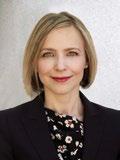
“DON’T PUT LIMITS ON YOURSELF”
During Robert Estrada’s time at Rockwell, he recruited a new human resources manager out of Florida. The two of them hit it off, and one day the newcomer asked Estrada what his goals were.
“I said, ‘I’d be happy to be the HR manager here at the plant,’ and he said, ‘You’re thinking too small,’” Estrada says.
He remembers his colleague telling him: “Don’t put limits on yourself, just because of whatever your background is.” That motivated Estrada to strive for high-level positions throughout his career.
who didn’t have much or any experience at other companies. His team worked with a professor to develop that program, and then they went on a road show around the US to educate and train employees at Fred Loya’s many offices.
The program helped introduce employees to new standards, and for Estrada it reinforced the advantages of positive coaching rather than a negative approach.
“Things don’t go well for companies that stay status quo,” he says. “You’ve got to keep evolving.”
Listening to other members of the team is crucial for Estrada when he maps out projects and initiatives. He recalls a story from earlier in his HR career when he had to take over for a manager who went on leave for surgery. At the same time, the company’s vice president directed him to double the workforce at a plant in order for operations to start running around the clock.
“I had no clue how to do it, other than, I brought in a bunch of temps,” he says. “We worked seven days a week for eight weeks,” and the company even-
tually hired those temps on full-time. But it wasn’t until after the whirlwind that Estrada talked to other people in the HR department and learned how hard it had been for them to accommodate all the paperwork involved in the expansion. “I should have been better organized, but in the moment you don’t really see it,” he says.
That experience taught him to delegate and the importance of absorbing feedback from others.
“You need to understand—try to see the big picture even when a pressing need is occurring,” he says. “There’s always more than one way to do things.”
As human resources director, he’s observed how people skills are as crucial as formal training and educational background—if not more so— for upward mobility at any company.
“If you can get the best out of people, you’ll be a good director,” he says. “As you go up within a company, one of the things I’ve noticed, seen, read: it becomes less about technical skills and more about how you interact with people and get the best out of people.
GBG congratulates ROBERT ESTRADA on his achievements and well-deserved recognition.
ENTRE PRENE URS Entrepreneurs
Perhaps the ultimate form of leadership is business ownership, and the Latino community is rich with entrepreneurs. The men and women featured here tell stories of risk, reward, and the lessons learned along the way.
66
69 Alfonso Arguindegui Leyendecker, Arguindegui Oil
74 Sergio Retamal,
Steve Apodaca, Cratos Health Global4PLOpt for a Healthier Path
AROUND THE END OF STEVE APODACA’S NEARLY DECADElong tenure at telecom company Charter Communications, several personal losses spurred him to take a closer look at his life path.
His father passed away suddenly, and he lost two of his colleagues. In the span of just a few years, other family members and a friend passed away as well. Apodaca loved being the president of operations at Charter, but it was also an incredibly demanding, stressful job. He found himself pondering the meaning of life and rethinking his priorities.
“The corporate life—as much as it’s looked upon as that higher echelon of where you always want to be—you also realize that in order to do those jobs, it’s a full-time, full-life commitment,” Apodaca says. “As an executive, you’re always ‘on’ and you’re always working.”
His personal life was out of balance as a result, and he wanted to spend more time with his children. So he recalibrated. He left the telecom company, went into semi-retirement, and took a pause to evaluate his health. He was overweight, had high cholesterol, high blood pressure, and the medications to match. He went to a specialist in Denver who treated him with hormone therapy, which Apodaca says changed his life. The experience was so transformative, in fact, that he decided to combine his new passion for the therapy with his lifelong goal of owning and operating his own business.
About five years ago, he launched Cratos Health, a medical spa and wellness center in Colorado Springs, Colorado. It offers medical weight loss, hormone therapy, and medical aesthetics services. After
BY A.J. ZAKspending twenty-some years focusing on driving recurring revenue through subscriptions in the telecom industry, Apodaca saw potential for a medical business based around a subscription model too. And that’s how he designed Cratos.
“If you’ve got a good base of customers, that recurring revenue will always come back to you if you treat those customers well. The same is true in this medical type of practice,” he says. “If you take care of them, that model will continue to replicate itself.”
Apodaca saw a big market to tap as baby boomers age and stay active later into their lives than generations before them, and as they want to continue to feel good about themselves. He also sought to fill a niche. Cratos, he says, is the middle ground between pricey, more invasive plastic surgery and aestheticians’ services such as facials and microdermabrasion.
It wasn’t just his more recent health awakening that made Apodaca passionate about the work Cratos does. During his college years, he was a bodybuilder, steeped in the world of health and diet. That’s part of why he transitioned from the world of telecommunications to where he is now.
“I’m able to apply the subscription model business with something I love, which is hormone therapy, weight loss, lifestyle, and quality of life,” he says.
The company has seen more than five thousand patients so far, Apodaca says. The business currently has two locations in Colorado Springs, and he plans to start franchising in the next couple of years.
Longtime telecom executive Steve Apodaca took semi-retirement as an opportunity to reevaluate his life before founding his own company
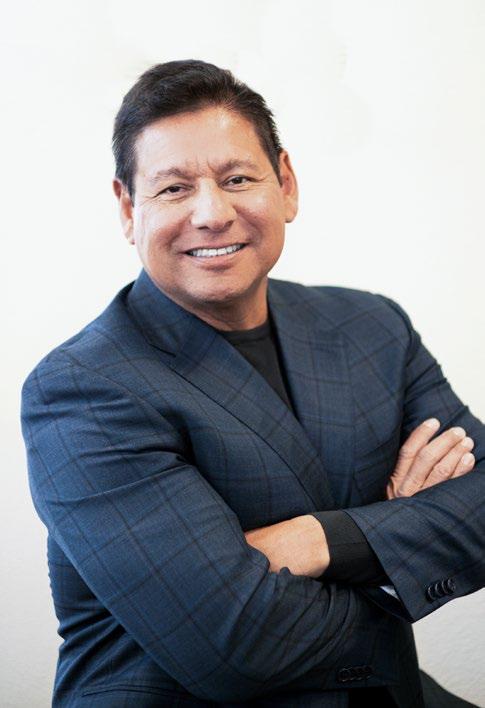
Steve Apodaca Founder and CEO Cratos Health
“That’s the essential element of why this business works—because I have a passion for all the patients.”
Medical weight loss
Hormone Optimization

Medical Laser Aesthetics
If you’re looking to improve your current overall status with supplements, regimens, therapy and holistic approaches, Cratos Health is the wellness center for you. We are a wellness center designed to get you doing what you love with a mindful conscience and a healthy physique. Our Colorado Springs wellness and medical spas o er a new standard in your well-being.
www.cratoshealth.com
“I’m basically running a medical practice as a business—that’s what’s making it grow,” Apodaca says. He handles the business side, and he has a medical team that works with patients.
There have been learning curves along the way. At Charter, he was part of a large company with established departments, systems, and protocols already in place. But with Cratos, he’s had to build everything himself, right down to picking the phone numbers.
“In this case, you’re creating everything new and you’re running into things you weren’t prepared for,” he says.
At Charter, he had to deal with regulation from the US Federal Communications Commission. At Cratos, he deals with the US Food and Drug Administration. But even with all that was new to him when he started his company, Apodaca’s marketing background applies just as much as it did to any job in his past. He has an MBA from Colorado State University and a bachelor’s degree in marketing from the University of Northern Colorado, the state he has long called home.
Apodaca’s interest in marketing started as he began to notice marketing targeted toward his Hispanic demographic. That resonated with him. The idea of figuring out how to speak to various cultures and identities to match their needs was intriguing.
Now, at Cratos, he finds joy in serving the customers he sets out to help. He recalls one married couple coming into the clinic, seeming distant from each other. The wife sought help with low energy, low libido, and trouble sleeping—problems that, in turn, led to a disconnect between her and her husband. With help from services at Cratos, she lost weight and was able to tackle her issues, and later her husband became a patient there as well. Over six months, Apodaca says, they went through such change that it reignited their relationship.
“It’s lovely to see a couple kissing, holding hands, reconnecting,” he says. “That’s the essential element of why this business works—because I have a passion for all the patients.”
Medical Spa & Wellness Clinic“The corporate life—as much as it’s looked upon as that higher echelon of where you always want to be—you also realize that in order to do those jobs, it’s a full-time, full-life commitment. As an executive, you’re always ‘on’ and you’re always working.”
Growing Across Three Generations
Alfonso Arguindegui Leyendecker invests in the legacy
created by his father and grandfather at Arguindegui Oil while ensuring the company continues to advance
BY BILLY YOSTArguindegui often uses his family as a conduit when speaking about the petroleum distribution business. He discusses the humble beginnings of a founder who, with just a high school education, learned a great deal from the stacks of National Geographic magazines he dutifully reflected on and read. He speaks of a father whose ultraconservative ways were often at odds with his youngest son’s more risk-tolerant opportunity seeking. For Arguindegui, taking over the southwest Texas-based company wasn’t simply taking on a new job. He took over the helm of an organization that everyone assumed would be bestowed upon his older brother, Peter III. However, Peter III instead opted for his independence and maintaining a relationship with the CEO as a father rather than a boss. But that didn’t make the younger Arguindegui the new de facto CEO by process of elimination. “I’ll never forget when my dad pulled me into his office and said, ‘Don’t think for a second that I’m just going to hand this over to you. You have to earn it.’”
Arguindegui’s response is a testament to what has kept his organization growing every year since he assumed the role. “I said, ‘I wasn’t expecting that. Just let me prove myself,’” the CEO remembers. Despite oil prices tanking in 2012, the Arguindegui Oil Company has managed to remain profitable in the boom as well as the bust. More importantly, Arguindegui says the family spirit is alive and well and continues to guide the company as it expands into the international market. The CEO continues to echo the lesson his father taught him early on when concerning the family business: “You can never stop growing. When you stop, it’s the beginning of the end.”
FOUNDER, DEVELOPER, ENTREPRENEUR
The upward trajectory of Arguindegui Oil is the result of three very different Arguin-
When Alfonso Arguindegui Leyendecker says he’s carrying seventy-five years of history on his shoulders, he doesn’t mean it as a complaint. The president and CEO of the Arguindegui Oil Company isn’t solely responsible for the direction and expansion of a company that shares his name. He and his cousin Carlos H. Arguindegui Jr., are together fulfilling a legacy put in place by their grandfather Peter—who founded the company—as well as Alfonso’s father, Peter Jr., and Carlos’s father, Carlos H. Sr.
degui leadership styles. The current CEO speaks of his father with intense respect while also acknowledging that their ways of doing business were, at times, starkly divergent. “There were some knock-down, drag-out fights between me and my old man,” Arguindegui says, laughing. The father’s relentless pursuit to cross all the t’s and dot all the i’s as it applied to risk aversion would often illuminate a generational disconnect between the two—but it also acted as a guidepost for the future CEO. “I was always bringing in deals and opportunities, and I would always hear, ‘I need more information,’ or ‘There’s too much risk,’” Arguindegui says. “It did help me define risk versus reward.”
Arguindegui says that his father made some fantastic, steadfast deals that resulted in guaranteed wins for Arguindegui Oil. But his more entrepreneurial ventures have also paid exponential dividends at the company. When Mexico’s state-owned energy monopoly was largely deconstructed, Arguindegui made a move he knew his father probably never would have.

It meant branching out into international operations. “Mexico is tricky, and, in many ways, it’s completely different from how we operate in the US,” Arguindegui says. “But how can I not try to capitalize on this?” The company has since become a strong source of fuel in the area, and as the evolution continues into international markets, Arguindegui also continues to explore new opportunities at home.
THE FAMILY CONNECTION
At age fifty-five, Arguindegui says he has started thinking about what comes next for the leadership at Arguindegui Oil. With the company continuing to expand—and that voice in Arguindegui’s head still telling him “You have to keep growing”—the president and CEO isn’t
Alfonso Arguindegui Leyendecker President and CEO ArguindeguiOil
“One of the most important things that I can do as a leader is to give back and try to leave some kind of a legacy in the communities in which we operate.”
entirely sure what will happen when he does finally elect to bow out. What he is sure of, however, is that there a number of possibilities to be considered, thanks in part to the team he’s built along the way.
“I’ve managed to put together what I call my A-Team,” Arguindegui boasts. “I’ve been blessed to attract these people.” When asked how he managed to accrue a collection of people to which he would feel comfortable potentially passing along his family’s namesake, his answer is firm and to the point: “When someone looks you in the eye, is there integrity there? You have to believe in that to come here and be part of this family. People have to believe that I’m going to empower them. At the heart of it, we’re a family business. That element is as strong as ever.”
KEEPING THE COMMUNITY RUNNING
While Arguindegui may always hear his father’s message of “Grow, grow, grow,” it takes on more of a holistic meaning for him. “One of the most important things that I can do as a leader is give back and try to leave some kind of a legacy in the communities in which we operate. Our company can’t do what we do without community,” he says.
Arguindegui Oil has always focused on philanthropic efforts toward higher education, including endowments at Texas A&M International University and Laredo College, but the CEO says it’s only one small part of his company’s efforts. The business has created an endowment for veterans’ causes as well as created a more flexible donor fund that allows the company to give to different organizations at different times. “Sometimes we’re donating $500 for a kid’s baseball or volleyball team uniforms,” Arguindegui says. “Sometimes it’s filling up team vans with gasoline. Giving, however we can, is in our fiber here. That’s just how it is.”
Indeed, since its inception, Arguindegui Oil has understood that its work in the community certainly upholds the message that the company is strong and supportive from the inside out. As important is the understanding that the support of their business partners and the trust of the community make Arguindegui Oil stronger. It’s a message begun by Peter Arguindegui Sr.—and it’s one his grandson continues to champion.
“When someone looks you in the eye, is there integrity there? You have to believe in that to come here and be part of this family. People have to believe that I’m going to empower them.”Alfonso Arguindegui Arguindegui Oil Company, President & CEO
YOUR DRIVE IS TRULY INSPIRING.
As the President and CEO of Arguindegui Oil Company, Alfonso Arguindegui carries on a legacy of excellence. From his passion for innovation to the drive and determination that has fueled great growth for his organization, his leadership is what we’ve come to expect — and what we rely on to deliver class-leading services and products. We’re proud to have Alfonso and the entire Arguindegui Oil Company family as trusted partners.

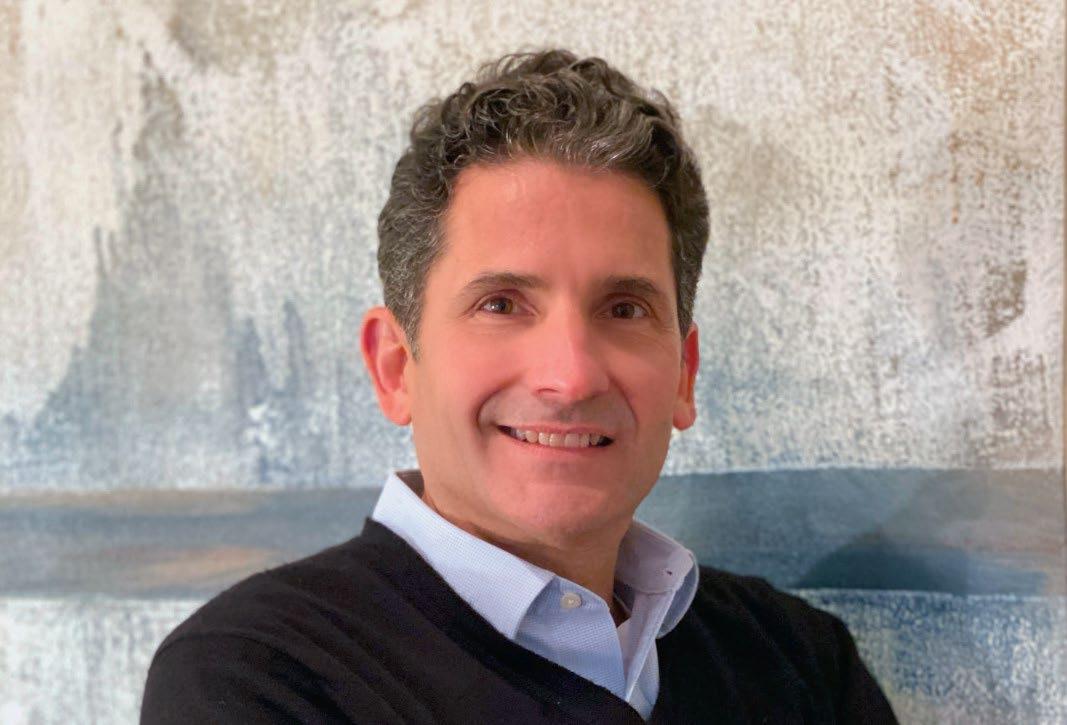
Guide with an Entrepreneurial Spirit
Global4PL President and CEO Sergio Retamal navigates global trade challenges by inspiring his team to be fearless
 BY BILLY YOST
BY BILLY YOST
THE WINDS OF GLOBAL TRADE HAVE SHIFTED spontaneously since Hispanic Executive spoke with Global4PL President and CEO Sergio Retamal in 2015. The continued emergence of China as an economic powerhouse gave way to a trade war with the US that has created challenges for Global4PL’s clients, which are spread over 168 different countries and are accustomed to things as they used to be previously.
Fortunately, the combination of Retamal’s vision and guidance has provided steadiness in an unsteady time, and the CEO is now focused on the manufacturing infrastructure necessary to shift production from China to more viable and developing economies and opportunities.
MANAGING A GLOBAL SHIFT
Retamal says the global shift away from China is a simple means to an end. “This shift will continue moving production out of China into other countries such as Taiwan or Vietnam,” he explains. “But truly, the next long-term opportunity is India, where we have the largest democracy on earth and a substantial population of educated professionals. Geographically, it is also next to China, which will help to create more balance of power in that region.
President and CEO Global4PL“The trade war is not over,” Retamal continues. “While it has converted into more of a cold trade war, it will have a tremendous impact on manufacturing in the next ten years—and it’s only just begun. We need to understand these changes and help our customers navigate those waters, which may be rough for many years to come.”
While Global4PL continues to help shepherd its clients through an uncertain trade future, the company has also made inroads that have allowed it to diversify its focus. “We recently completed our General Services Administration (GSA) certification, which allows us to bid for government services contracts through their RFQ [request for quote] process,” Retamal says. “This is not an easy process, but with the help of our team, we were certified last December, and it will open new doors for us.”
DEFIANT GROWTH
The continued growth at Global4PL, despite the challenges of navigating a shifting global paradigm, can be linked in part to Retamal’s relentless focus on the people at his company. “One of the strengths we have as a team is that we know each other’s strengths and weaknesses,” the CEO says. “We’ve created a culture of openness and understanding such that someone’s perceived weakness might be someone else’s strength. We build and support teams to complement those qualities.”
Retamal says that focusing on culture is critical unless one is determined to fail. “Management is about people. Processes, software, and technical tools are an important aspect of the business, but those are to support your people,” the CEO says. “Set the tone, reward what you say is important, and remember that everyone from C-level individuals to entry-level employees are human beings that have the same expectations, needs, and feelings as anyone else.”
The CEO has put his money where his mouth is, too, having earned both an MBA and a master of science in organization development. The people focus of the latter has had a much more significant impact on his leadership style, Retamal says. “I will take the MSOD any day and twice on Sunday.”
THE ENTREPRENEURIAL SPIRIT
Retamal says that the culture at Global4PL has nurtured the company’s growth. Specif-
RETAMAL RECEIVED THE PRESIDENT’S “E” AWARD FOR EXPORT SERVICES FROM SECRETARY OF COMMERCE WILBUR ROSS IN WASHINGTON, DC. ONLY FIVE COMPANIES IN HISTORY HAVE EVER RECEIVED THE AWARD.
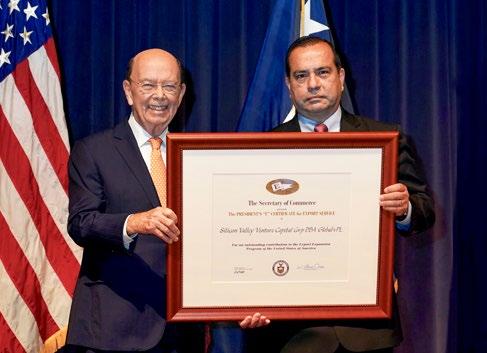
ically, the entrepreneurial spirit that he has worked hard to instill continues to drive Global4PL’s expansion, resulting in a nimble, forward-thinking, and innovative organization that can outmaneuver much larger competitors.
“Resistance to change is one of the greatest failures of management,” notes Retamal, “and those who know their work and their people can make changes to processes to make them easier to implement. And the buy-in is already there. If you create a culture that celebrates change, does the best for the customer, and embraces the concept that we all win when we do well, then we have created a true entrepreneurial spirit.”
That spirit burns brightly for the CEO, who has faced his fair share of challenges along his journey. “As an entrepreneur, I’ve failed many times, but I don’t consider them failures,” Retamal says. “People who experience success in their career have failed ten or fifteen times. You simply have to learn from failure and apply the lessons you’ve learned the next time. You’re going to remember the lessons from your failures more that what you’ve learned from your successes.”
Retamal knows that staying positive and learning from failure—as well as having a willingness to simply try new tactics and strategies—is key to helping Global4PL stay agile and inventive. It’s a recipe that enables the company to think creatively and constantly develop and improve.
This spirit is the same that attracted a motivated immigrant to Silicon Valley at the age of twenty-five and provided enough lessons to fill his yet-to-be-titled book, which Retamal hopes will provide guidance and inspiration for future entrepreneurs.
CONVERSATIONS AT THE TOP
ANTONIO NERI
WITH RUBEN NAVARRETTE
The CEO of Hewlett Packard Enterprise defies the stereotypes of tech leaders, proving just as interesting, if not more so, than the company he leads
PHOTOS BY GILLIAN FRY
S LEADERSHIP qualities go, knowledge is overrated. I am often reminded (by my wife, who was born in Mexico and went on to become a Montessori teacher and language therapist) that the ability to explain things so that others understand them is the real gift.
I got a gift recently. It’s not every day that one storyteller gets the chance to interview another. And it’s really out of the ordinary when the storyteller fielding the questions is, in his day job, the leader of a global technology company.
The reason that stereotypes endure over time is that there is often a shot glass full of truth in them—usually the uncomfortable kind—and the stereotype of tech leaders is that they are, for all their talents, not especially good communicators. They are known to be intensely focused on the task at hand, but perhaps not worldly; not especially curious, rather more task-oriented and solutions-driven; and not artistic or creative, but more often linear in their thinking. They know a lot, but, since they live in their own heads, they can’t explain much.
Antonio Neri is a pleasant surprise. The fifty-two-year-old president and CEO of Hewlett-Packard Enterprise (HPE) is an exception to every one of those rules.

In a stimulating and wide-ranging conversation, Neri shared with me his life story, insights, management style, and world view.
“I was born in Argentina, a son of two immigrants—two Sicilian immigrants— that moved there in the late ’50s,” he said. “But the reality is that I grew up between
Argentina and Italy since my parents went back and forth between the two countries.”
I was curious about the similarities between the two countries—and the differences. I asked him to reflect upon that.
As to the similarities, Neri said, there is plenty that unites the two worlds. “For a time, there were millions of Italians living in Argentina,” he said. “The two cultures are very well aligned in terms of lifestyle and whatnot.”
And as for the differences, he acknowledged, there are ways to tell Italians and Argentinians apart.
“I would say the Italians obviously have a higher sense of appreciation for life and appreciation for long-term future,” he noted. “Argentinians tend to live more by the day in many ways, but they still try to enjoy life. Italians are way more ambitious than Argentinians. But I would say that both countries love each other because there is big connection between the two.”
It’s fitting that the first Hispanic president and CEO in the history of HPE should have enjoyed such an international upbringing. Neri is the epitome of a global citizen. As evidence of that, he speaks four languages: Dutch, English, Spanish, and Italian.
“We grew up as an Italian family—in Argentina,” he recalled. “My family never took anything for granted, and we all worked hard. Those were the values of my dad, who passed away. My mom is still alive.
“One of the things I think I do pretty well is tell stories—and deliver the story in a way that people can connect to.”
Antonio Talks: HPE CULTURE
“If you come to our environment here you’ll see an open floor, people can come and see me anytime. I dress like normal people with jeans and shirts and sneakers. I love to get my hands on the technology and engineer [work]. I’m very hands off and about empowering people, but I also care about the details. One thing I’m actually really proud of is that I think I have a very strong followership because I grew up in the company. People recognize me as one of them and that’s a big advantage. I’ve been with the company for almost twentyfive years and that gives me a unique advantage in terms of understanding our processes, our systems, how we do things, our portfolio, our financial architecture, and whatnot. But I think, to empower the team, I’m very approachable. I always apply the open-door policy. Because I grew up in what I call ‘The HP track,’ I had the honor to work with some very, very smart leaders here that [also] grew up in the HP culture. I actually practice this principle every single day.”
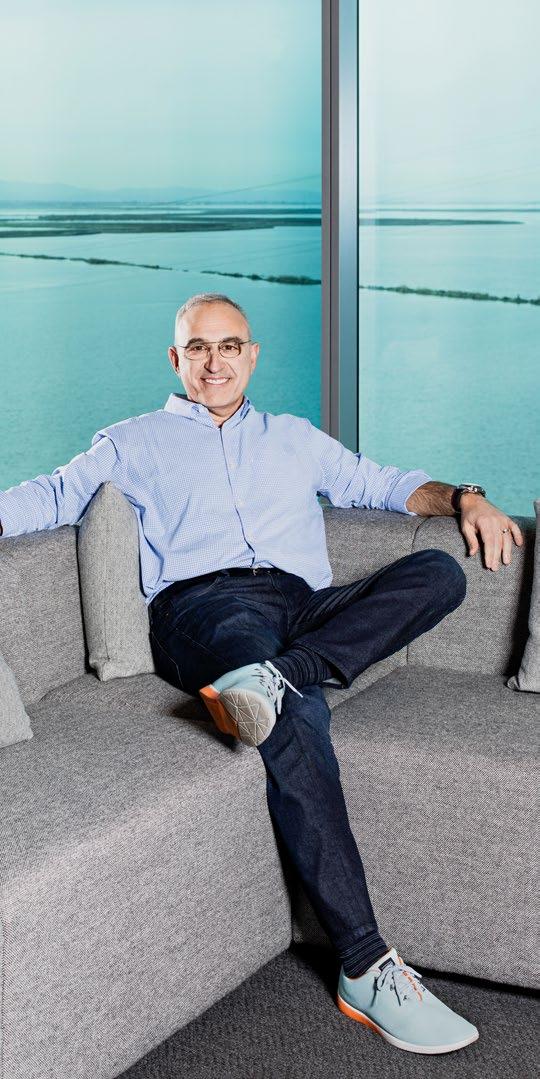
Because of that, and because of my curiosity, I started my career early on.”
At thirteen, Neri was an apprentice at a military base. By fifteen, he was studying and working at the same time. He worked his way through high school in a shipyard, repairing radar and sonar for Argentina’s Navy which would, in 1992, become embroiled in a territorial skirmish with Great Britain known as the Falklands War.
The tech leader has a lot to say about many things, and he says it with an engaging cadence that lures in the listener. He knows how to weave a good yarn.
“One of the things I think I do pretty well is tell stories—and deliver the story in a way that people can connect to,” he said.
For example, he said, it’s one thing to say that a computer system has the ability to process large amounts of data in the blink of an eye. People may not care about that. It’s another to explain that, by doing so, that system could lead more quickly to a cure for Alzheimer’s. People will care about that.
Neri draws pictures. Literally. He sketches and paints, and—when he’s not running a massive global company—he teaches classes in both.
“I love art,” he said. “It’s the balance of the brain in many ways. The core principle is that we should never stop learning, maintaining a high sense of curiosity, developing hands-on experience always. I’m a very analytical person who has an eye for design, and creativity is a part of my aspiration.”
For Neri, business, technology, and art are not separate and competing with one another. They are all weaved together.

“When you are an apprentice, you’re learning and working at the same time,” he said. “That’s not just theory but also being pragmatic and practical about things. Those have always been the principles I follow, and it has become ingrained in everything I do. I never stop learning, that’s for sure. The day I
stop learning or have less desire for curiosity I will stop working because physically I will not be motivated.”
I believe a company’s CEO should be at least as interesting as the company and its products. At this point in our talk, I’m thinking: so far, so good.
Neri and Hewlett-Packard discovered one another in 1995. Having left Argentina for Europe a few years earlier, he took a job in Amsterdam as a call center agent for Hewlett-Packard where he provided support to customers who called in with questions or problems.
As the years passed, Neri stayed at Hewlett-Packard and snagged one promotion after another. In 1997, he relocated to Boise, Idaho, to serve as global director of the company’s division of imaging and printing services. In 2004, it was off to Houston where he worked for the Hewlett-Packard’s PC services business. In 2011, he took over technology services.
Antonio
Talks: HIS LOVE OF ART
“My love of art started very early—when I was ten years old. A good friend of mine was an excellent drawer. He loved more of the caricature side and I went more to the art side. We grew up together, and [art] was something fun to do. With art, with painting, it goes back to creativity. You can start with a blank sheet of paper or a white canvas and get inspired to something different, something unique. For me, drawing and painting is a way to get to a new space and think about things, inspire myself, and come up with a new idea. Obviously you practice new techniques—I’ve painted many different ways, whether it’s oil or spatula whatever. It’s a way to get relaxed but at the same time it’s a way to get my own space and think about the issues and ultimately be creative about certain aspects of what we need to go do.”

“My biggest strength is a global view. I’m a global citizen. . . . I’ve lived in many countries. I work with a very diverse set of people and leaders. I understand different cultures and different needs.”
In 2015, after a couple of decades of climbing up through the ranks, Neri was well positioned when Hewlett Packard split in two. Suddenly, there was Hewlett Packard Enterprise (HPE) and HP Inc.
He was quickly named executive vice president and general manager of HPE’s business division, known as Enterprise Group, where he focused his efforts on research, marketing strategy, product development. He is also trying to increase the company’s diversity—with regard to gender, race, and ethnicity.
And in 2018, Neri became the company’s president and CEO, succeeding Meg Whit-
man, who founded eBay and ran unsuccessfully for California governor.
Since taking the helm, he has earned kudos for championing innovation, increasing efficiency, spearheading new technologies, and—not surprisingly—strengthening the company’s international footprint.
When I asked how he navigates all his duties, priorities, and goals, Neri brought the conversation back to the one thing that should be the central focus of any business.
“The number one principle is to always focus on the customer,” he said. “The customer is your North Star. Never forget that. We exist because of our customers: getting through to their needs, understanding their needs, and finding out how we can address those needs in a different sort of way.”
Antonio Talks: STORYTELLING IN HIS THIRD LANGUAGE
“Telling stories makes it real for people, makes it simple. My challenge is that, until I was twenty-seven, I didn’t speak any English. When I joined HP in 1995 as a contractor, I could communicate in English, but I was very strong technically. But when I did the written test, I failed. I failed the English test. The hiring manager, who was a British Jamaican, said, ‘No problem, he speaks Italian, he speaks Spanish, those are two languages we need and we need that technical expertise.’ So he gave me the chance to join the company, and that shows you need to take chances on people. If it wasn’t for him I would not be here. . . . [Over time,] I learned more and more skills to communicate better. But English is still my third language. For that reason, the ability to communicate and tell stories [is something] I am actually very proud of.”
What else?
“Obviously, the second priority is all about innovation,” he went on. “For us, we are a technology-driven company that delivers solutions for this new digital world we live in every day. We need the best innovation. Innovation requires creativity, requires ingenuity, and requires passion. I have always said innovation doesn’t happen just in the technology side but also in the business model side.”
Neri makes it a point to confront his doubts.“I always question myself, asking, ‘Will that innovation deliver the value to our customers?’ and ’Will people be willing to pay for it?” he said.
I wondered aloud how he would define his business philosophy.
“Our customers and our partners—all the sale partners—play a big role,” he said. “Our innovation and our culture are also very important. You need the best team around you. You can’t do this by yourself and that’s why having the right talent around you— and then obviously a strong bench below them that are empowered and accountable
to deliver against the commitments—is what it all takes. You need a clear purpose, vision, and strategy with a set of metrics and rewards that allows you to execute against those principles. And, obviously, you have to make the right bets.”
You could say that Neri’s biggest bet is that he has the leadership skills to take HPE to the next level as a global powerhouse. Come to think of it, the word “leadership” comes up often in our discussion.
For instance, I asked how the head of a company decides whether to stay the course or try a new path. He responded: “At the core of that is leadership. This is all about leadership.”
It’s also clear that Neri is a globalist, in the best sense of the word. And he knows it. When I asked him to name his biggest strength, he didn’t hesitate before firing off an answer.
“I think my biggest strength is a global view,” he said. “I’m a global citizen. I was born in Argentina and I grew up between Italy and Argentina. I’ve lived in many countries. I work with a very diverse set of people and leaders. I understand different cultures and different needs—this is a strength. Obviously speaking four languages is another strength.”
You get the sense that a person like this could work in any sector of the US economy and still be successful. Yet, Neri seems to exactly where he is supposed to be.
“I’ve always been a technologist,” he said. “I love technology. Technology solves customer and community problems. Our purpose as a company is to advance the way people live and work. Everything we do has to be aligned to that. Technology is good in solving those problems and delivering business outcomes.”
Neri also recognizes those areas where he needs to improve his performance. “I had to train myself to become a business leader
that uses problem-solving strength and then translates that strength from a technology perspective to a business outcome perspective,” he said.
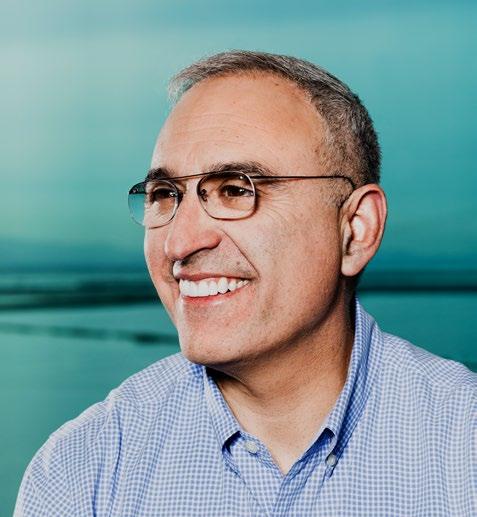
I get it. Imagine if you could apply the best principles of technology to help you run a business more efficiently. You might think that tech companies have always been run this way. You’d be wrong.
Of course, managing people is an art form of its own. Not everyone can do it effectively. And, it’s been my experience that, oftentimes, really smart people make for really bad managers.
“You need to understand the psychology of people,” he said. “Ultimately you get the people to do what you want by giving them
a clear vision, create excitement around that vision, create a framework for people to operate, execute against that, and reward them.”
Finally, I asked, what, if anything, keeps him up at night? What one thing does he find most challenging about his job?
“I’ve always said every business is an IT business today,” he said. “We live in a digital economy. This means, obviously, that we have got to continue to accelerate our execution. That’s the biggest challenge. The pace of technology innovation and business-mode innovation continues to move at lightning speed. So, for us, the biggest challenge is to accelerate, accelerate everything we do in our execution. This is where a sense of urgency matters, where focus really matters.
Antonio Talks: BEING AN ‘INSIDER’ CEO
“In choosing a CEO, the board decided to, after almost eighteen years, go back to an insider versus an outsider. The last inside CEO was Lou Platt, who retired at the end of 2000 beginning of 2001 when Carly Fiorina came on board. Between 2002 and early 2018 we have had outsiders. Ultimately, the board decided that we need someone who understands the technology space much more deeply and the culture of the company. And that’s why they decided to go with me. Having that DNA is important. For me it’s a huge responsibility but a great honor.”
For me, it’s a challenge but I also think it’s an opportunity for us. Those who can move faster will win. That’s why, in a marketing campaign, we said, ‘The future belongs to the fast.’”
Like an Argentinian driver racing around the track in an Italian sports car, Antonio Neri has been moving pretty fast over the past few decades. And he shows no signs of slowing down.
Ruben Navarrette is a contributing writer to Hispanic Executive , a syndicated columnist with The Washington Post Writers Group, author of A Darker Shade of Crimson: Odyssey of a Harvard Chicano, and host of the podcast Navarrette Nation
83 Hispanic ExecutiveA letter from our guest editor, Roel Campos, chair of the Latino Corporate Directors Association
Board directorships for minorities
is NOT A ZERO SUM GAME
COMPANY BOARDS DO WANT DIVERSITY AND they do want inclusion. Today, diversity for most boards begins with a search for women candidates, as the advocacy for women has been ongoing for many years and is just now having an impact. As such, boards will often become aware of qualified white women before becoming aware of qualified male and female minorities. This is perhaps to be expected, given existing business networks, and may represent the normal evolution of diversity and inclusion in corporate America. However, boards are overlooking an extraordinary amount of talent and experience when their searches do not also seek qualified Latinos, African Americans, and other minorities of both genders.
One of my roles as the chair of the nonprofit Latino Corporate Directors Association (LCDA) is to encourage boards to look broadly when filling director vacancies and to consider candidates from the large pool of outstanding and qualified Latinos and Latinas in all business sectors and industries. The LCDA assists many corporate boards and their recruiters in identifying qualified Latinos/as for board and senior executive positions.
Currently Latinos constitute less than 3 percent of directors on Fortune 500 boards. Latinas are even less. In contrast, women as a group (on Fortune 500 boards) increased from 15.7 percent in 2010 to 21.9 percent in 2018 (per Deloitte and the Alliance for Board Diversity). This increase is certainly welcome, but clearly more progress is needed. It is important to remember that diversity on boards is not a zero sum game. White women can gain board seats, but at the same time, so can Latinos and other minorities.
I often relate to executives and directors the compelling business case for American Latinos. For example, the US Latino community currently accounts for 18 percent (59 million) of the nation’s population, with some projecting an overall population of 100 million American Latinos in about 2050. American Latinos today represent over $2.1 trillion in purchasing power. According to the Pew Research Center, every month about 70,000 Latinos/as reach voting age as American citizens. To cite only a few examples, Latinos in America make up a huge percentage of the revenue of Facebook, Walmart, and for all music sales in the US.
In short, it is hard to see how any business can ignore 20 percent (and growing) of consumers in the US. Any company that markets its products and services nationwide needs a Latino strategy to be successful. Latino directors can often be a valuable resource in accessing the US Latino market. In other words, Latino directors help deliver the benefits of diversity and help move the bottom line higher.
The LCDA has urged institutional investors, such as Blackrock, to advocate to their portfolio public companies for both women and minorities, including Latinos. In addition, as part of LCDA, we also urge individual board members to do more in promoting diversity and Latinos on their boards. As a board director and the chair of a public company’s corporate governance and nominations (CGN) committee, I have posed a very specific challenge to myself and my board: when director vacancies occur, strive to identify qualified women, Latinos, and other minorities to be a part of the list of candidates for the board’s consideration. Make this objective a requirement for the recruiter.
Recently, my public company board determined to bring on a new director. The directors agreed that the board needed technological and digital backgrounds and experience to assist our company to move into the digital space. Given our board’s commitment to diversity, I asked our recruiter to seek to include among the candidates women and minorities with these skills. And among the candidates our recruiter helped us identify were more than twenty minority women with tremendous qualifications. So much for the worn-out excuse: “We can’t find qualified minorities.” I am delighted to report that after reducing the list, which was difficult, the board was so impressed that we offered two board positions— instead of one—to two minority women, one Latina and one African American.
ROEL CAMPOS’S ADVICE FOR BOARD DIRECTOR CANDIDATES
Landing a board position requires two things: the right timing and the right qualifications. The key is to have a skill or experience that is useful to a particular board. Like a traditional job search, a lot of factors outside of your control need to align, but there are also many things you can control so that you are prepared to seize an opportunity when it comes your way.
• Get an understanding of the way boards work. There are a lot of director training programs these days, available either online or, for instance, through my organization, the Latino Corporate Directors Association.
• Join organizations that notify you of opportunities and will advocate for you on your behalf. For example, at the LCDA, we stay informed of searches and send notifications to members that, though we don’t necessarily name the company, include what the company is looking for in terms of experience. We do our best to identify qualified Latinos/as for these searches from our own membership and outside through different networks.
• Don’t narrow your search to public companies. There are many private companies that have boards, as well as nonprofits. Look for opportunities to serve on such boards to develop your experience and skills.
Imagine how diversity on boards could be increased if other board members also accepted the challenge of identifying at least one qualified minority candidate, including Latinos/as, to be considered and interviewed for the next board vacancy. Of course interviewing a minority candidate does not mean he or she will be selected. However, there is a huge positive contribution in introducing such candidates to other directors, who may establish new business relationships, which may also lead to different opportunities for that candidate on another board.
So, if you are a fellow director, why not join me and challenge yourself to do this? In particular, if you are a minority or woman director serving on a board, you probably know very qualified women and minorities that you could bring forward for your board’s consideration. I hope you see what a positive difference you can make. Diversity increases the bottom line and shareholders will applaud.
• Be one of the strongest candidates out there. Just as if you were selling yourself to an employer, you need to focus on and emphasize the areas in which you’re really strong, then find companies that are a match. Look in industries where you have some background and experience, where you can help improve the company’s performance, or where your personal network will be an asset.
• Search in your network for people who are serving on boards and ask them if your skill set might be interesting to the board, and whether they could put your name forward when there’s an opening, or even in advance of an opening. You want to get on the list of interviewees, and you can do that through your own personal contacts, in the same way you would in a job search.
• Some people write directly to a company that they think they could add value. You can write to the CEO and the head of the corporate governance nominations committee—those are the two people who would consider your letter and resume. As always, it helps if you know someone on the board or in upper management who can be a good reference for you.
“When director vacancies occur, [if you are a director] strive to identify qualified women, Latinos, and other minorities to be part of the list of candidates for the board’s consideration. Make this objective a requirement for the recruiter.”
GRACIELA IVONNE MONTEAGUDO
Graciela Ivonne Monteagudo is on a mission to promote and explore the business potential of women and the US Hispanic community
BY SARA DEETER PHOTOS BY JUSTIN CLEMONS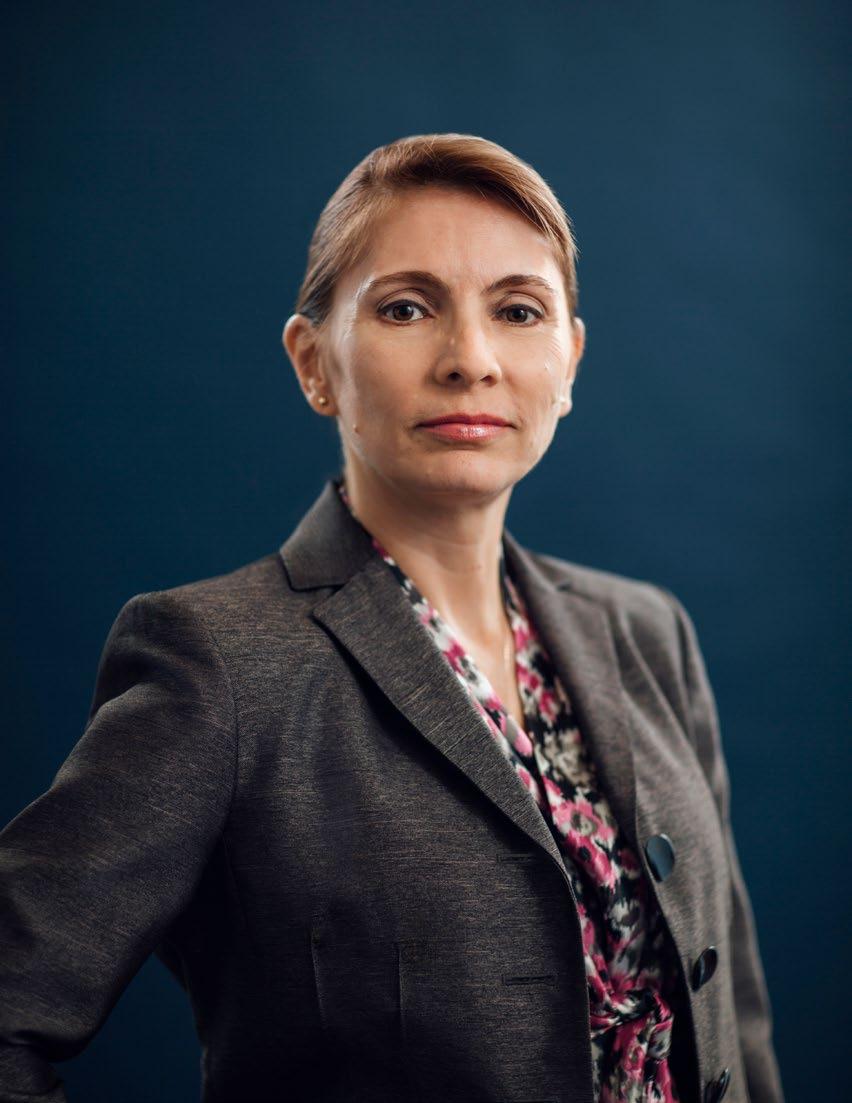

Graciela Ivonne Monteagudo is no

stranger to being the “only woman at the table.” Over the course of her career, Monteagudo has gone from being, as she puts it, “one of the few female engineers in Mexico to becoming one of a few women and Latinos to have profit and loss responsibility of multibillion-dollar businesses in the US and abroad.” Today, she’s part of a minuscule percentage of Latinas in Fortune 1000 Boards (less than 1 percent).
Being “at the table” has afforded Monteagudo incredible opportunities—and allowed her to advocate for women and Hispanics both in and outside of work. But it has also opened her eyes to the untapped potential of the individuals—and entire markets—that are all too often excluded within the business world.
Even at the beginning of her career, working in marketing roles at the Mexico branch of consumer goods corporation Procter & Gamble, Monteagudo never felt limited because of her gender.
“It was a meritocracy,” Monteagudo explains. “It was a great place to learn, with amazing training programs and really supportive leaders—I never felt like there were any barriers to my growth.”
And Monteagudo certainly experienced a lot of growth: when she was just thirty-six years old, she was selected to lead a $250 million business in Mexico. And in 2004, she became the first Latin American fellow of the International Women’s Forum (IWF), an invitation-only organization dedicated to supporting, inspiring, and connecting some of the most accomplished women in the world.
“It was a one-year program,” Monteagudo says of that fellowship. “We attended conferences and got training in Harvard and Cambridge with professors who had designed the program curriculum to address the barriers that stop women from moving ahead in their careers.
“It opened my eyes to so many things,” she continues, “to the importance of networking, to the world of corporate politics, to the importance of using public speaking skills—not just in big presentations but also in company meetings.”
“Hispanics are more than a consumer segment. They’re a growth engine.”
Inspired by her experiences through the IWF, Monteagudo made it a priority to help other professional women identify and overcome the barriers preventing them from progressing in their organizations. But this was by no means a new area of interest for her.
“I’ve always hated unfairness, and when I was in high school, [Simone de Beauvoir’s] The Second Sex was one of the books that really touched me and opened my eyes,” Monteagudo says. “As a sort of legacy project, I decided to develop a conference based on all that I had learned as an IWF fellow: I gave that conference for years, starting in Mexico and then going around the world.”
And the more she gave the conference presentation, Monteagudo says, the more she started to notice a common thread in her audience’s experiences.
“Women everywhere were facing similar challenges. What was different was the degree of intensity,” Monteagudo notes. “In many African countries, women can’t even get a job. But that kind of discrimination also resonated with women in the US, with women in Argentina.”
Seeing this, Monteagudo began forwarding a message to those around her—the simple truth that no matter how wrong unfairness is, the world will not always be fair. “But you can do something about it,” Monteagudo says, firmly. “You will live in situations where things are against you, but you can learn about the situation. You can train yourself to be more aware, to be better.”
And even if you can’t change the whole world, Monteagudo points out, you can still effect change on a life-changing level.
While working as a top-level executive at Walmart, Monteagudo helped drive a gender diversity initiative that enabled women working for the company all over Mexico to take advantage of additional training opportunities. “Because Walmart is the largest employer in Mexico, the sheer number of women we were training was really impressive,” she notes. “So for me to participate in the design
of those training programs meant that I was actually helping to change the country.”
But Monteagudo’s mission doesn’t stop there. As she’s championed women to assume roles of power at influential global companies, she’s similarly made a case for the Hispanic market as one that should be recognized for its immense business potential—and reckoned with.
“I have dedicated my career to the understanding of millennial moms as well as US Hispanic and Latin American consumers—critical target consumers for CPG and retail companies,” Monteagudo says. “But I think companies today are holding back from really leveraging the Hispanic market, and that has to do with how Hispanics in general are perceived.”
Every successful brand in the world is known for one or two attributes, Monteagudo explains, key benefits like quality or cost that always come to mind when people think of that brand.
“But in the US, there is such overwhelming media exposure that the word that comes to mind when people think of the Hispanic population is ‘immigration,’” Monteagudo says. “And that means that people don’t pay attention to the amazing transformation that is going on with the economic power of Hispanics.”
Because of this branding issue, businesses often don’t consider that the median US Hispanic income has grown by 21 percent in the last five years, Monteagudo acknowledges, or that over 20 percent of millennials are Hispanic. They aren’t aware that the US Hispanic GDP is $2.3 trillion and still growing significantly.
“A lot of companies are interested in investing in emerging markets—markets in Brazil or Mexico or Indonesia or Nigeria,” Monteagudo says. “Now, they’re realizing that there’s a market with the potential to grow at the same rate right here in the US.
“Hispanics are more than a consumer segment,” she emphasizes. “They’re a growth engine.”
“Women everywhere were facing similar challenges. What was different was the degree of intensity.”

 LINDA GRIEGO
LINDA GRIEGO
LINDA GRIEGO
Linda Griego credits her grandmother for inspiring her to achieve national distinction
BY WILL GRANTLinda Griego credits
her grandmother, who raised her, for the inspiration to leave Tucumcari, New Mexico, just after high school—a path that’s culminated in national distinction as an entrepreneur, business and civic leader, and fearless community activist. In recalling her grandmother’s favorite saying, “La mujer que adelante no mira, atras se queda,” she says, “For me, it meant always striving to do more.” Now Griego is returning to Santa Fe to begin a new chapter.
Griego has a roster of impressive corporate boardroom directorships, currently including ViacomCBS and American Funds. Her prior directorships featured Granite Construction, AECOM, City National Bank, First Interstate Bank, Southwest Water Company, and Blockbuster. She also served as a Los Angeles director of the Federal Reserve Bank of San Francisco and was a US presidential appointee to the North American Development Bank, Community Adjustment, and Investment Program. Her civic leadership is just as impressive. She serves as a trustee of the Charles R. Drew University of Medicine and Science and the MLK Health and Wellness Community Development Corporation (founder and chair). Previously, she was a trustee of the David and Lucile Packard Foundation, the Ralph M. Parsons Foundation, the Robert Wood Johnson Foundation, and the California Community Foundation.
Griego’s grandmother also instilled in her the belief that it’s important to help those less fortunate and most vulnerable in our society. That commitment led Griego to run for mayor of Los Angeles in 1993, against the backdrop of civil unrest in communities that had long been neglected and underserved. She had served as a deputy mayor for economic development under the retiring Mayor Tom Bradley and understood that rebuilding communities required economic investment—and not building more jails, as many of the candidates were proposing. Griego was the first woman to run for that office, and though she lost, she says running was the right thing to do. There was an essential need for a strong voice to help small businesses rebuild and create jobs.
Following that race, Griego was tapped to be CEO of Rebuild Los Angeles—formed to revitalize communities devastated by the civil unrest—and later to be CEO of the Los Angeles Community Development Bank. She says, “Prosperous communities build strong families who are able to buy homes and send their children
to college, as well as a tax base that supports public services like schools and libraries.”
In recognition of her community service, Griego has received numerous awards, including the UCLA Medal, the highest honor bestowed by the university. She’s also been recognized by Hispanics in Philanthropy, the San Francisco Hispanic Foundation, YMCA of Metropolitan Los Angeles, CORO Southern California, City of Hope, MALDEF, the LA Chamber of Commerce, and the White House Fellows Commission.
Griego has faced and overcome many obstacles. She values those who supported, encouraged, and mentored her along the way. She advises, “Always acknowledge those who helped you get to where you are.”
She gives high priority to identifying future business and civic leaders and mentoring them, particularly women and minorities who are underrepresented in leadership positions. She says, “Mentor as many people as you can, and never close the door behind you.” Griego keeps a long list of potential directors for corporate and nonprofit boards and works closely with the Latino Corporate Directors Association. Michael Camuñez, president and chief executive officer of Monarch Global Strategies, is one example of a leader Griego has mentored and recommended both as her replacement on the board of the David and Lucile Packard Foundation— where she termed out after twelve years—and to serve as director of American Funds beginning last year.
Griego believes that her ambition has roots in the small town of Tucumcari, where she was born. Her entrepreneurial spirit started at age eleven when she worked at her uncle’s small grocery store, selling bait to fishermen headed to nearby Conchas Lake. At age
“Always acknowledge those who helped you get to where you are.”




thirteen, she was a cashier and bread wrapper at the local bakery run by her grandmother and relatives. She credits those early work experiences as confidence builders that, years later, led to her opening restaurants and bakeries in Los Angeles. One of the proudest moments was showing her grandmother the Engine Co. No. 28, the 136-seat restaurant that she developed and operated for almost 25 years in downtown Los Angeles. Her grandmother’s love of dance and music—including Mexican rancheras, opera, and her favorite artist, Prince—rubbed off on Griego, who once produced a Latino dance TV trailer.
Next year, Griego and her husband will celebrate their fiftieth anniversary. After forty-eight years of living in Los Angeles, they recently moved to Santa Fe, where she will be closer to and be able to spend more time with her extended family, including her many nieces and nephews. Undoubtedly, her grandmother will continue to inspire new entrepreneurial ventures and community projects in New Mexico. At the same time, Griego plans to stay connected to Los Angeles through ongoing projects and friends there.

“Mentor as many people as you can, and never close the door behind you.”
MICHAEL CAMUÑEZ
As Michael Camuñez has advanced in his career, he’s stayed connected to his community through board work and nonprofit advisory positions
BY BILLY YOSToften jokes with his spouse that when it comes to inhabiting a corporate boardroom, he might just be the poorest guy in the room. “One of the things that you find when you start serving on corporate boards is that they tend to be comprised of quite successful, accomplished, and wealthy people,” Camuñez explains. “I’ve spent half of my career in public service.”
He says his biggest asset may in fact be what he calls “the privilege of growing up poor,” going on to explain that his upbringing has helped him to prioritize issues of poverty, equality, and community involvement. “I really believe hardship in one’s childhood can be a positive thing, if you can allow it,” Camuñez says. “I had the good fortune of having a single mother who instilled a strong sense that a person isn’t defined by his or her economic circumstances, and that I had the ability to rise and break out of poverty.”
Even more important than lifting himself out of poverty, according to Camuñez, is what it’s allowed him to do for his community. “I was shaped by how I was raised and my faith as a Christian that we owe a serious responsibility to the least fortunate among us,” he says. “What makes the US great as a country is the strength of our citizenry and civil society.”
Today Camuñez is not only president and CEO of the consulting firm Monarch Global Strategies, but he also holds a number of corporate and nonprofit board positions. A relatively small number of Latinos have successfully navigated into boardrooms—raising larger issues about diversity in executive leadership—and those that do, Camuñez says, are typically the first generation in their family to attain a postsecondary education.
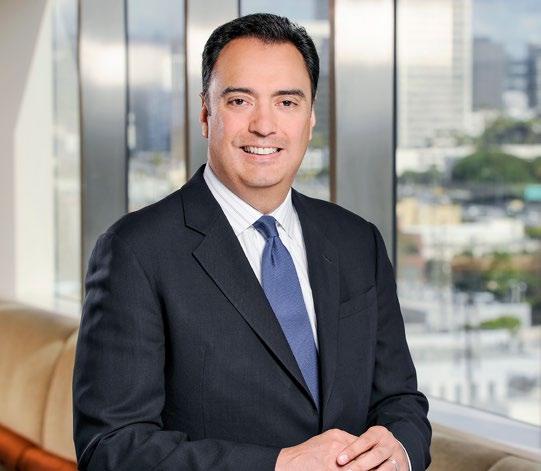
“But my life experience and perspective are important,” he says. “The challenge is to not let yourself be intimidated by your differences and recognize the value and the strength that you bring to the team.”
MICHAEL CAMUÑEZ
On the boards of Edison International (NYSE: EIX)
Southern California Edison American Funds (several funds), managed by the Capital Group
Stanford University Board of Trustees
David & Lucile Packard Foundation
Center for Law & Social Policy
Pacific Council on International Policy City Year Los Angeles

Camuñez currently serves on the corporate boards of Edison International (NYSE: EIX) and of Southern California Edison, one of the largest power companies in the nation. He is also a director of the American Funds, managed by the Capital Group, one of largest and most successful mutual fund companies in the world. It’s an extremely high-profile position for even the most experienced of executives. He also serves as a trustee of the David & Lucile Packard Foundation and of Stanford University.
He has an impressive résumé to match, starting with an undergraduate degree in government and political science from Harvard University and a JD from Stanford Law. His professional experience includes notable senior government appointments, law firm leadership, and nonprofit governance—not to mention starting his own consulting firm advising companies on emerging markets.
Still it ended up being those lean early years that helped teach Camuñez what to prioritize in life. One of his many nonprofit board positions is director for the Center for Law and Social Policy. “This is an organization that is one of the most important advocates for the poor in the country,” Camuñez says. “Selfishly, this sort of work helps me feel balanced and like I’m living a complete life.”
Camuñez also stresses the importance of being ready to take on opportunities when they present themselves. “I worked very hard to prepare myself and gain a wide and diverse base of experience that corporate America finds relevant,” the CEO says. “There is certainly a component of luck to my situation, but I also think it’s important to prepare yourself and be vocal about your interest in taking on leadership.”
In 2009 Camuñez left his post as an equity partner in the global law firm O’Melveny & Myers LLP—where he was the hiring partner of the firm’s Los Angeles office—when he was appointed White House special counsel to then-president Barack Obama, managing the vetting process for all executive branch
appointments. While seeking remarkable and diverse talent across the country, Camuñez contacted Linda Griego—who currently sits on boards at ViacomCBS and the American Funds—to help him hone in on ideal candidates.
“Linda has been such a wonderful role model for so many of us,” Camuñez says. “We collaborated very closely during those presidential appointments and built a friendship grown from a deep mutual respect and admiration. When I came out of government and back to California, Linda became an important mentor and promoter of me as an emerging Latino leader.”
It’s not just Camuñez’s perspective from a cultural standpoint that makes him such an invaluable board addition. As a lawyer and partner at one of the nation’s top law firms, Camuñez spent extensive time counseling boards and developing an understanding of corporate governance, risk management, and compliance. As a commercial diplomat—as assistant secretary of commerce following his service at the White House—Camuñez has gained a wealth of experience counseling executives on corporate strategy, international trade and investment, and emerging markets.
The CEO has dealt with corporate directors from almost every vantage point, making him uniquely qualified to facilitate collaboration amongst independent directors. “Having served on leadership boards of various sizes and missions has given me the experience of working collaboratively with people who may not share my values and beliefs or who may be much different than me,” Camuñez explains.
Confidence is key to leadership, according to Camuñez. “I think sometimes what’s most important is to have the confidence to put yourself forward and in the game,” he says. “Our community sometimes lacks role models, pathways, and opportunities. It’s so important to have people like Linda Griego—and I hope myself— to set an example and create a path to extend a helping hand to creating more opportunities for diverse talent.”
“The challenge is to not let yourself be intimidated by your differences and recognize the value and the strength that you bring to the team.”
GIL MARMOL
Board member Gil Marmol has helped launch Foot Locker’s revival in an ever-changing industry
BY BILLY YOSTchanged dramatically,” says Guillermo Marmol, board member of both Foot Locker and the Vitamin Shoppe. “There was a time when boards could be said to be a little sleepy and certainly secondary to the management.

Today, that reality has very much changed.” Marmol, who was born in Cuba, is no stranger to changing times.
When he was a boy, Marmol was forced to flee Havana with his family after his father fought first against the Batista dictatorship and later against Castro’s communist overthrow of Cuba. It became apparent that the safety of the Marmol family was at risk, and so, like many others, they found themselves in Miami. The executive’s subsequent rise through McKinsey & Company and into techenabled services is impressive enough on its own merit, but especially considering the obstacles that Marmol overcame along the way to steer the direction of one of the most well-known names in footwear retail.
HARVARD WHO?
Marmol maintains a sense of humor and self-reflection about his own rise despite being forced to flee his home at a young age. While still in high school, he was convinced he would wind up becoming an engineer and assumed he should find an appropriate college to attend. “I thought I’d end up at Georgia Tech, more than anything because it had the word ‘tech’ in the name,” Marmol says, laughing. “A couple of friends were more thoughtful and asked me if I’d heard of the Ivy League. I liked that name too.”
Marmol was eventually accepted to Harvard—but there was one problem. “My mother was convinced Harvard is where young men went to become communists,” Marmol says. “My father was a little more understanding, or at least liked the name recognition.” Marmol was allowed to enroll and came face-to-face with a numbing New England winter and a culture that felt completely foreign. Still, he graduated with honors and wound up being accepted to Harvard Business School, a rarity for a graduate with no work experience.
THE NEW RETAIL
For seventeen years, Marmol called McKinsey & Company home, moving from Mexico City to a small tour of several US offices to gain further experience. The executive says he was one of the few who could have called the company home for his career. Ultimately, however, his interest in less traditional ventures and his eye for the developing tech services market won out. After a parade of successful high-level positions, Marmol is now his own boss at Marmol & Associates. “I like the boss most of the time,” he jokes.
Since being asked to join Foot Locker’s board of directors in 2011, Marmol has had his expertise in company turnarounds put to a high-profile test. “We weren’t financially distressed, but the business had consistently underperformed,” Marmol says. After his addition to the board, the executive says a period of growth followed in which every quarter was more successful than the last. This was due in part to a significant improvement in basic operations of the company, along with a major financial commitment to the initial build-out of digital services.
Still, Marmol says, the rapidly shifting nature of retail raises questions that no one has answers to, only informed guesses. These accelerating changes have also challenged Foot Locker. “It requires a fundamental perception change in what retail is,” he says. “I think we’ve been a leader in this initiative.” Part of that shift means working to create new and more fulfilling connections with Foot Locker’s customer base, primarily young urban males, often of Latino or
“The reality of board work has
African American descent. “The Latino community is the fastestgrowing demographic in America and for us, it’s triply so,” Marmol says. “It’s important that we engage our principal customers from where they’re coming from.”
THINKING ONE STEP AHEAD
Marmol says Foot Locker is working to engage with its customers more directly. The company launched an incubator called Greenhouse, with an app that features young, often minority designers, and serves as a showcase and design sandbox for burgeoning street wear creators. Foot Locker also invested $2 million in Pensole Design Academy, aiming to promote the design pipeline and inspire up-and-coming artists.
Marmol says that he often helps steer the direction of Foot Locker not by expressing his own viewpoints but by asking the right questions. “If you can get to the core questions, you can quickly determine if the answers are sufficient and credible or if it’s a topic that needs to be addressed more closely,” he says. That’s where the executive’s extensive experience comes into play. Over the years, he’s developed a keen sense for knowing when a projection seems likely to happen and when it’s wishful thinking.
As far as Foot Locker goes, Marmol says the company board is “winning far more than it’s losing,” and he’s excited to continue his board contributions—all while continuing to spot the investment opportunities in the tech services sector that helped build his career in the first place. The executive shows no signs of slowing down. “I’m as energetic as I have ever felt,” Marmol says. “My interest in going to the beach for anything other than a short vacation is low.”
“Gil brings a diverse, energetic, and innovative perspective into the boardroom each meeting. Through his keen insight and visionary thinking, he fosters a true sense of diversity and inclusion while addressing Foot Locker’s business challenges. Gil’s broad base of experience has proven to be invaluable to our board and company.”
—Richard Johnson, Chairman & CEO, Foot Locker Inc.

“It requires a fundamental perception change in what retail is. I think we’ve been a leader in this initiative.”
ARNOLDO AVALOS
Arnoldo Avalos, who grew up in a migrant farming family, focuses on giving back to underprivileged communities while helping the next generation of Americans
BY BILLY YOST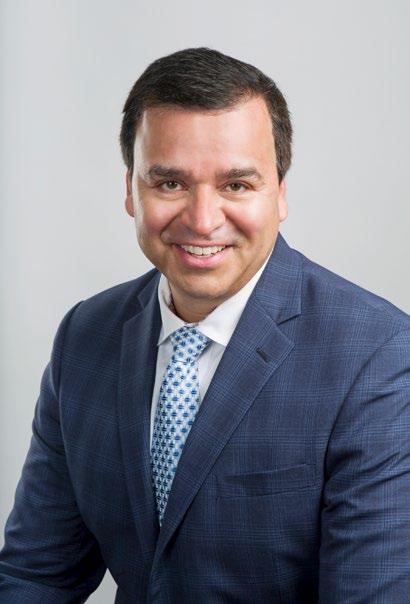
Arnoldo Avalos reached the fifth grade, he had more education than both of his parents combined. Avalos’s mother had a fourth-grade education and his father could neither read nor write. His family of migrant farm workers had emigrated from Mexico to Gridley, California, and would follow the cherry crops to Oregon and Washington during the summer, living in tents, campers, or migrant housing that often lacked basic facilities.
But Avalos, founder and CEO of the nonprofit Avalos Foundation, says he had one major advantage. “We had loving parents who taught us a strong work ethic, right from wrong, and the values of family and religion,” he says. “We may have been poor in many ways, but we were rich in having parents who invested in us and taught us how to be successful if you worked hard.”
Of the seven Avalos children, five earned college degrees and two also went on to pursue graduate degrees. Avalos, the youngest, attended the University of California at Berkeley and Harvard University; he’s built an impressive career as an HR and compensation specialist, earning his spurs at companies including Facebook, Google, and Cisco. Some of the compensation models Avalos introduced at Facebook are still in use, even as the company’s employee base has grown from five hundred to more than thirty-five thousand.
The executive has come a long way, and he’s dedicated himself to ensuring that others will have more resources than he did. His board work and foundation are centered on rural communities and finding ways to grow the next generation of Amer-
icans. Through his own board participation, Avalos is able to signal to rising talent that they can do it too.
THE AVALOS FOUNDATION
Along with his wife, Alma-Ruth, Avalos founded the Avalos Foundation with the aim of giving more attention to rural communities. “No one really talks about rural America,” the CEO says. “My wife and I were both able to receive the benefits of the educational system at large, and so we’ve focused on six counties in Northern California that are primarily low-income and have low education rates.”
The goal of the organization is to motivate and inspire young people to pursue postsecondary education. To date, the Avalos Foundation has invested in more than a hundred students who earned or are working to earn their degrees and provides hope for communities that often are treated like afterthoughts in larger policy discussions.
CALIFORNIA COMMUNITY COLLEGES BOARD OF GOVERNORS
Avalos has furthered access to education in other ways as well: until April 2019 he served on the California Community Colleges Board of Governors, helping to pass a string of educational victories poised to benefit millions of people. California has the largest community college population in the country, with more than 2.1 million students, of which half are low-income.
During his tenure, a bachelor’s degree program that allows students to earn their four-year degree at a much lower cost was successfully piloted and implemented for twelve select community colleges, and the first Latino chancellor in the state system was hired. A law requiring the colleges to take transcripts and not simply an entrance assessment into account was passed, a significant change in policy allowing more students to continue their education. Finally, the board was able to implement a state college promise grant offering free tuition to a student whose family is low to middle income (as long as that student is taking twelve credits).
“I was honored to serve at the state level to help continuously improve a system which has a significant impact in low-income communities,” Avalos says.
HERMANOS UNIDOS, ENTRAVISION, AND MORE
Avalos’s volunteer board work and advocacy efforts are literally too extensive to list in full, but the executive spent six years on the board for Hermanos Unidos, a student-run organization that focuses on advancing mostly young Latino men through three
pillars: academic excellence, community service, and social interaction. Over the organization’s thirty-year history, Avalos says that more than ten thousand young men have earned college degrees and gone on to serve their communities in conjunction with the organization.
Then there’s the Latino Community Foundation, which had an operating budget of $1 million when Avalos joined; in 2019, he was able to help the organization raise more than $4.5 million. The nonpartisan group is focused on making sure all Latinos are counted in the 2020
census and encourages them to become more civically engaged. Avalos, who got his citizenship in 1993, says he’s proud to have voted in every election since then.
Currently, Avalos sits on the board of directors for Entravision, the thirdlargest Hispanic media company in the US. He and the board are working to bring the company, which owns fifty-five television stations and forty-nine radio stations, into the future. “We’re trying to figure out how to play in the new digital media landscape,” Avalos says. “We are looking to do some acquisitions that will continue to build our strategy to stay relevant in the future.”
Avalos also says that his work with the Latino Corporate Directors Association is imperative for laying the groundwork for tomorrow’s diverse leaders. “The role of the organization is to strive for more representation on corporate boards,” Avalos says. “You need representation that brings relevant experience and a voice that’s not usually represented, yet those same people are your consumers.”
Looking forward, the executive is hoping to be able to bring his expertise and perspective to the board of a Fortune 500 company—a notoriously nondiverse landscape that could benefit from a perspective like Avalos’s.
“I was honored to serve at the state level to help continuously improve a system which has a significant impact in low-income communities.”
A Í DA Á LVAREZ
An accomplished journalist, businesswoman, public servant, and board member, Aída Álvarez drives progress for nonprofit and for-profit organizations alike
BY SARA DEETER PHOTOS BY SHEILA BARABAD AÍDA ÁLVAREZ On the boards of K12 HP Inc. Oportun Fastly San Francisco Symphony California Competes The Latino Community Foundation Smithsonian Art Museum
111 Hispanic Executive
AÍDA ÁLVAREZ On the boards of K12 HP Inc. Oportun Fastly San Francisco Symphony California Competes The Latino Community Foundation Smithsonian Art Museum
111 Hispanic Executive
whether it’s for profit or nonprofit, is a privilege,” says Aída Álvarez. “Whatever board I’m on, I want to help the organization succeed.” And as an award-winning journalist, the first Latina to serve in a US presidential cabinet, and a board member for an array of prestigious nonprofit and for-profit organizations, Álvarez knows what it looks like to succeed—she just has to help others see and act on that vision.
LEARNING FROM EACH OTHER
According to Álvarez, the essential purpose of any board member is to provide strategic direction and oversight, ensure that the organization is well run, and make sure that the organization is not only delivering returns to its stakeholders but doing right by those stakeholders as well. But what many board members and organizations may not realize, Álvarez says, is that the path to achieving those goals often looks much the same—no matter their industry or sector.
“For-profit companies and nonprofit organizations both benefit from good governance practices—which, in many cases, are very similar,” Álvarez explains. “They both benefit from understanding the separation between the roles of the board and the organization’s management, from prudent financial practices, from intentionality, and from discipline.
“Nonprofits need to be mindful of the bottom line,” Álvarez continues, “and for-profit companies need to have a social purpose as well as a financial responsibility.”
As a board member for public and private companies, for for-profit tech companies as well as nonprofit arts organizations, Álvarez strives to help others see—and capitalize on—that overlap between charitable and corporate sectors. And as a founding leader of the Latino Community Foundation (LCF), Álvarez has seen that mission come to life.
DREAMS TAKE DISCIPLINE
“The foundation started out as a dream, with very little going for it,” Álvarez recalls. “But all the while I have served the foundation, I have been really mindful of the need to be disciplined as an organization.” Discipline is critical to every organization and every company in existence, Álvarez asserts. If you want something to be successful, you have to have the discipline to see it through to the end.
And through years of discipline and hard work, Álvarez says, the LCF cultivated a strong and dedicated fund-raising base, ranging from corporations and foundations to individuals hoping to give back. “The best of intentions can’t get accomplished if you don’t have a revenue stream,” Álvarez points out. “And now, the LCF is a very impactful foundation that makes life better not just for Latinos but for the entire state of California.”
But impact isn’t the province of nonprofits alone, Álvarez says.
“In the corporate sector, you want to ensure that the company is mindful of its responsibilities to stakeholders—but stakeholders include the community, the environment, and the company’s own employees,” Álvarez remarks. “As a board member at Walmart, I put a sharp focus on Hispanic leadership within the company because I knew it would benefit both the company and the community.”
No matter your goal for the organization, and no matter the type of organization you serve, you will always have to do a bit of “heavy lifting” to accomplish your objectives, Álvarez says.
“Companies are complex, human organizations. Issues will always arise and need to be addressed,” she emphasizes. “I’ve been very fortunate to be on the boards of good companies and to have good colleagues on those boards, but it can be a great challenge to ensure that a company remains best in class and that it continues to have a diverse board even as it expands or becomes public.”
MAKING OPPORTUNITIES COUNT
Over the years, these philosophies and strategies have helped Álvarez drive unquestionable financial and operational success for the organizations she has served. And that is important, Álvarez acknowledges—leaving the organization in a better place, with values and practices of integrity, inclusion, and diversity, should be the objective of every good board member.
“Being on a board of directors,
“The best of intentions can’t get accomplished if you don’t have a revenue stream.”
We o er personalized online learning for kids of all abilities.
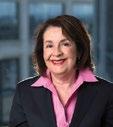
Tuition-free, online public schools powered by K12 provide students with the individualized attention they deserve. Students in grades K–12 can gain an academic edge with engaging, quality curriculum and hands-on materials; instruction and support from dedicated, state-certifi ed teachers; and assistance setting goals and charting a course for success after graduation.

“When I grow up, I want to be a veterinarian.”
But to Álvarez, the success that is captured through analyses of organizational revenue or shareholder value only tells part of her story of success. Like a resume, she says, lists and numbers “don’t necessarily give you an insight into some of the motivations and experiences that drive people to accomplish the things they accomplish.”
“In my case, the story goes back to when I was born in Puerto Rico,” Álvarez says. While quite young themselves, her parents moved to New York City when Álvarez was just nine months old. Both of her parents were extremely hardworking, Álvarez says, but they experienced many of the same hardships endured by those immigrating to the United States today.
“It was a very unfriendly environment, yet my parents were always really supportive and encouraging,” Álvarez stresses. “In the face of discrimination, they always reminded us that when people attack you, it’s usually because they are ignorant. If you can dismiss that ignorance, you can move forward.”
And as Álvarez has moved forward through the worlds of journalism, government, business, and board membership, she has remained grateful for all the opportunities she has been afforded.
“As many challenges as we face in this country, there are just as many extraordinary opportunities,” Álvarez says firmly. “I’m very proud of what this country offers to all of us. We just have to make the most of those opportunities.”
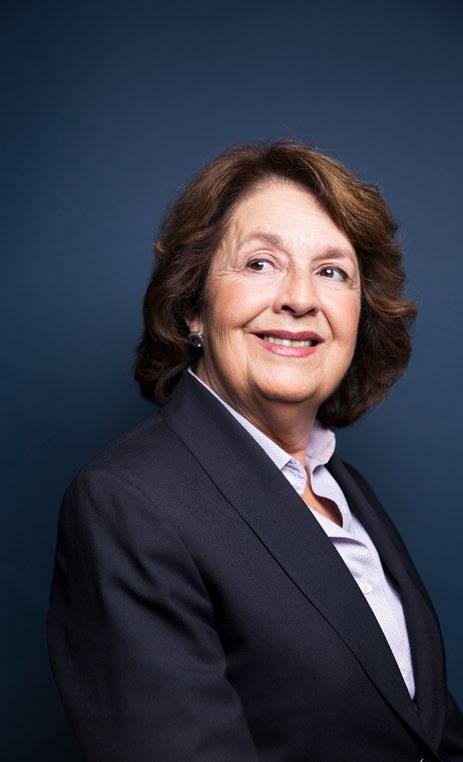
“As many challenges as we face in this country, there are just as many extraordinary opportunities.”
LUCINO SOTELO
When not reimagining the golf experience, Lucino Sotelo brings his passion for education to his board role managing a multibillion-dollar school budget
BY BILLY YOSTLucino Sotelo says he didn’t
graduate from Chicago Public Schools (CPS) so much as he survived them. “At the time, it was labeled one of the worst school systems in the country by the sitting US secretary of education,” Sotelo says. Out of his high school freshman class of over five hundred, less than 40 percent graduated, and only a handful, including Sotelo, went on to college.
With significant academic improvements in recent years, times have changed in Chicago in many ways. Still, CPS has faced its fair share of challenges and is regarded as one of the most complex and budgetarily challenged school systems in the nation. Now with children of his own in the system, Sotelo is leveraging his marketing, management, and financial expertise accumulated at W.W. Grainger, BMO Harris, HSBC, Grant Thornton, Diamond Technology Partners, and CSC Index—as well as in his current role as chief marketing officer at KemperSports—to help oversee and guide a sustainable balanced budget for CPS.
Sotelo was asked to join what may be the most challenging board in Illinois, the Chicago Board of Education, by newly elected mayor Lori Lightfoot in June 2019. The CMO says he was well aligned with the new administration and that thinking about his own kids in CPS was motivation enough to get involved.
“I’ve always had a passion for education because I believe it’s the great equalizer,” Sotelo says. “I know in Chicago that if you look at the overall numbers, you see a great story of significant improvement; but when you unpack those numbers, you can still see a big variance within different ethnic groups and zip codes.”
Sotelo has a long history of backing citywide educational organizations. He’s served on boards for organizations including City Year Chicago, Leadership Greater Chicago, Executive Service Corps, Chicago Plan Commission, Rauner Family YMCA, and the Peace and Education Coalition.
Joining the seven-person board of education is, however, a responsibility with little precedent in the country. “I’m fortunate to serve with one of the most diverse boards ever assembled, with true experts in different educational fields, urban policy, community involvement, and political understanding,” he says.
Sotelo continues, “I think I may be the only board member who has big budget responsibilities and experience that can look at how we’re going to responsibly manage our $7.8 billion budget that stretches across 38,000 teachers, administrators, and members of support staff—as well as serves 365,000 students. This board has a bigger budget than most private and publicly traded companies.”
But Lightfoot inherited a significant budgetary gap that stretches back decades, and prioritizing needs will be essential.
The weight of responsibility seems like it would be too much for anyone, but Sotelo’s positive attitude is contagious. “All ideas cost money, and so strategy and prioritization are absolutely essential,” says Sotelo. “I’m a huge advocate that if we are truly going to fundamentally fix the educational issues in the different parts of the Chicagoland area, we have to address early childhood education. We’ll always be trying to fix problems later on if we don’t attempt to address and fix them before they even have a chance to become problems.”
Day one of the all-new board got off to a shaky start. The new SQRP 2.0, the method by which success and improvements are measured across all schools, was in danger of being voted down because some members believed there was a better system that could be adopted. While Sotelo agreed that a better system should be developed, he patiently asked that the board consider the implications and consequences of moving forward into the school year without a barometer for success.
“We can’t responsibly manage a budget and compare performance across similar schools without common and shared metrics,” Sotelo says. “If we’re going to change things, it’s going to take time.” The board revoted and approved the system, making plans for changes down the line.
It’s difficult to understand that managing a multibillion-dollar budget is what Sotelo actually does in his free time. His day job has been working to market KemperSports’ portfolio of golf courses and resorts to compete with the offerings of other golf courses and substitute entertainment options.
Long gone are the days of solitary men heading out for a day on the course, then back to the clubhouse to lounge. Sotelo says
“I’ve always had a passion for education because I believe it’s the great equalizer.”
the golf and leisure experience needs to be marketed to the entire family in addition to the traditional core golfers. “The reality is that we’re not just competing for people’s business, we’re competing for a more important asset: their time.”
The competition for time means competing against literally any other form of entertainment in which customers, particularly children, might engage. Lately, Sotelo says he always tries to keep in mind that they’re trying to pull kids away from screen alternatives to multichannel entertainment options, which could blend the physical nature-oriented offerings with the virtual through augmented reality or virtual reality options.
“We need multichannel engagement options with different time commitments, and that might mean multimedia centers with an on-premise golf simulator that you can practice on year-round,” Sotelo says. KemperSports recognizes that a day on the course has shifted for some people into an opportunity to spend a few hours with the family. “People aren’t as likely to come in and devote four to six hours playing as they are to spend two to three hours. So, how do you reconcile that with alternative options?”
It’s an important question, and just a year in, Sotelo says he’s enjoyed the chance to bring his clubs to work every day. But make no bones about it—he’s not here to relax, he’s here to disrupt. “This has been a neat, transformative experience helping to alter our industry,” Sotelo says. “It’s been a fun challenge that, on the surface, you don’t see. But it’s a great opportunity to bring my experience and expertise from other industries that have faced similar challenges to the golf and hospitality industry.”

“The reality is that we’re not just competing for people’s business, we’re competing for a more important asset: their time.”
LUCINO SOTELO On the boards of Chicago Board of Education Public Building Commission of Chicago
JORGE TITINGER
Industry leader and author Jorge
Titinger believes that diversity is key to positive change in the business world
BY SARA DEETERTitinger, the former CEO of Silicon Graphics International (SGI) and a board member of prominent tech and finance companies including Hercules Capital and CalAmp. A native of Peru, Titinger has always considered his differences to be one of the strengths that he brings to the organizations he serves. But now, he’s using his platform as both a business leader and an author to highlight the imperative that he believes we all have to embrace differences at every level of industry.

Growing up in Peru, Titinger says, he often saw gender and racial stereotypes being turned on their head. “My mother was a medical doctor, and my father was also a successful businessman, but the notion that men have better jobs and make more money was just never a part of my mind-set,” he explains. “I grew up as a soccer player, and in sports, it doesn’t matter ‘what’ you are. It’s about talent—it isn’t about anything else.”
Even later in life, these patterns continued. “There was a huge difference in the number of men and women studying electrical engineering at Stanford,” Titinger says. “There were maybe six women out of every hundred guys in each class.” As he advanced in his career and began working outside of Peru, he continued to notice these types of differences—but in the US they tended to run true to stereotypes.
“The same question kept going through my mind,” Titinger says of his experiences studying and working in the United States. “‘Why are these groups so unbalanced?’”
As CEO of SGI, “I was always a big advocate for gender opportunity and made that a part of the culture of the company,” Titinger recalls. “I had women on my board as well as my executive
“The time to act is now,” says Jorge
teams. To the extent that I could be, I’ve always been a voice for positive change in the Silicon Valley area.”
Titinger has continued to advocate for change as a board member for an array of for-profit and nonprofit organizations, as an advisor at the National Society of Hispanic MBAs, as a six-year awardee of the Hispanic IT Executive Council, and as the chairman of the Hispanic Foundation of Silicon Valley.
Throughout the years, Titinger says, he has realized that having a board is a privilege and an asset. “Some companies may view them as a nuisance,” he acknowledges, “but to me it means having between five and twelve very competent people on your side and helping you win using their incredible wealth of input, feedback, and experience.”
He emphasizes that a big part of what enables him to help companies like CalAmp and Axcelis win is “the whole strength” of both his experience and his background.
Titinger is far from alone in believing that diverse talent brings strength to the corporate world. In his 2019 book Differences That Make a Difference, he and his coauthor, Pedro David Espinoza, showcase the insights, viewpoints, and experiences of 150 diverse leaders from across the globe.
“We talked to people working as CEOs of public companies, people working as mayors of cities, people in three or four different countries—a whole host of people,” Titinger says. “We wanted to raise the voices of all these phenomenal people and share what they have been doing in the world.”
But the book is also a call to action, he notes. While many people today don’t realize how unequal the professional world
“There are more CEOs named David and John than women CEOs in the entire Fortune 500.”

NOTES AND QUOTES
“The first time I read the finished book, I put sticky notes next to the quotes that I really liked,” Jorge Titinger says of his recent book, Differences That Make a Difference. “But as I went along, I found that I was putting a sticky note on almost every single page.”
Though Titinger says it would be impossible to pick a favorite, he did share a few of the quotes he’s found most compelling:
“If the leaders don’t make it absolutely clear that they see inclusion as a core value, no one will recognize it.”
—Bart Myers, Founder of Countable“When I am asked to make the business case for diversity, I say, you make the case for homogeneity.”
Barbara Whye, Intel Chief Diversity and Inclusion Officer, CHRO“Society at large should take steps to close the gaps it has created, be it poverty, direct or indirect discrimination, or lack of access to education.”
—Eric
Schmidt, Former Google CEOis, Differences That Make a Difference shows “the reality of where things are.”
“In the book, we share a statistic that says there are more CEOs named David and John than women CEOs in the entire Fortune 500,” Titinger says. “That means women are less than 5 percent of the Fortune 500 CEOs. And for African Americans or Latinos it’s even less, even though 25 percent of the population of Silicon Valley is Hispanic.”
Educating the business world about gaps in the C-suite is critical to the future success of that sector. But Titinger argues that the gaps among decision-makers are not the only ones that will make an impact in the days to come.
“The world is going to continue to change, and technology is going to drive significant changes in the not-too-distant future,” he explains. “2030 is not that far away, and by then it is estimated that between twenty-five and thirty million jobs will be automated.
“Unfortunately, the first jobs to be disrupted will be manufacturing and administrative jobs, which are typically the types of jobs held by women and minorities,” he adds. “We all—the people and companies and greater society—need to take that seriously and start helping those populations get better at the jobs of the future rather than the jobs of the past.”
“We [need to] start helping those populations get better at the jobs of the future rather than the jobs of the past.”
ANNA CABRAL
Anna Cabral believes she was privileged to have a supporter help her find a path to higher education. Today, she pays that privilege forward.
BY SARA DEETERpeople’s lives in ways we can’t even imagine,” remarks Anna Cabral, former US Treasurer and board member of prestigious organizations such as Navient, the Jessie Ball duPont Fund, the microfinance foundation for the BBVA Bank (BBVAMF), and the Diversity Advisory Committee of Comcast NBCUniversal. “It really takes almost no effort to do something positive.”
Cabral’s story begins with just such an individual: her high school math teacher, Mr. Lamm. Growing up in a very poor, very traditional Mexican American family, Cabral had a vision for the future that never extended much beyond graduating from high school. But when she was sixteen, she decided to leave early so that she could help support her family.
“I loved school, but we were struggling financially,” Cabral, the eldest of five children, recalls. “But then Mr. Lamm called me into his office and said that if I really wanted to do something for my family, I should think about applying to college.
“And even when I told him that we couldn’t afford college, he insisted,” Cabral continues. “He wrote my college application forms during that meeting. He talked my parents—who were very protective—into letting me go off to college, and he found me all the scholarship dollars I needed to go to the University of California, Santa Cruz.”
Even with those funds, Cabral remained on a very tight budget throughout college—she had to learn how to budget for living and incidental costs as well as find money to send home to her family. Nevertheless, Cabral says college was a “life-changing” experience.
“It opened doors that I never even knew existed, but at the same time it left me angry. There were a lot of people in the neighborhoods where I grew up who died young because of drugs or gangs, or who had babies when they were still babies themselves,” Cabral explains. “None of them were really very different from me. They just didn’t have a Mr. Lamm.”
According to Cabral, the only way she could think to reconcile that disparity was to give back to others. “And that’s what I’ve tried to do with my entire life,” Cabral says.
Soon after graduating from the University of California, Cabral found a focus for her efforts to give back: education. With the
encouragement of her husband, she decided to continue her education at the Harvard Kennedy School of Government, but as Cabral emphasizes, her experience there was far from usual.
“I had fallen in love at eighteen and had four children in a row, so my youngest often came to class with me. He was three at the time, and whenever the professor would ask if people had questions, he always raised his hand,” Cabral says with a laugh. “I was very different from most Harvard students, but with my husband’s support, I got my degree and moved with my family to Washington, DC.”
During the next thirty years, Cabral’s expertise drew the attention of some of the most powerful individuals in the nation. She became the president and CEO of the Hispanic Association on Corporate Responsibility, and she worked on the Senate Judiciary Committee with Senator Orrin Hatch, who taught her “how you can really make things happen for the American people.”
She was tapped by President George W. Bush to serve on the Council on the 21st Century Workforce, and, from 2004 to 2009, Cabral served the nation as US Treasurer—during which time she also obtained her JD from the George Mason University School of Law.
“In these times, we need to make a point of committing to lifetime learning: jobs and careers and skill sets are always changing,” Cabral says of her decision to pursue an advanced degree later in life. “And that education doesn’t necessarily have to be only formal. Not everybody needs to go get a four-year degree—there are trade schools and skills that are just as valuable. Learning can include courses at a community center or community college, or creating a personal reading list and enrolling in a degree program.”
But no matter what kind of learning or training you pursue, Cabral emphasizes, you need to understand your financial situation, and the financial demands of that education, well enough to make good decisions for yourself. That, she says, is where a lot of Americans come up short.
“Everybody needs more financial education,” Cabral stresses. “The average person who borrowed for their bachelor’s degree graduates with around $30,000 in student loans for their college career. That can be a very sound investment, provided you complete the degree program. Increased earning potential doesn’t often
“We as individuals can touch
 ANNA CABRAL
ANNA CABRAL

materialize for those who drop out. And for those who borrow more than they need, or defer payments for too long, accrued interest can cause loans to balloon. There are a lot of young people who don’t understand basic budgeting concepts like saving for emergencies and retirement or managing credit wisely. As a result, some end up borrowing more than they need.
“Unfortunately, people don’t usually talk about money at the dinner table, and often, it’s not taught in school.” Opportunities are out there, Cabral believes, but people need to be able to make good financial decisions if they want doors to open to them. That is why, during her tenure in the Treasury Department, at the InterAmerican Development, and the BBVAMF, Cabral has worked to increase access to financial services and education.
She’s proud to serve on the board of Navient, one of the largest student loan servicers in the country. “They do an excellent job of providing borrowers with the tools and information they need to choose among complicated federal student loan repayment options in order to stay current, protect their credit scores, and succeed in paying off their student loan debts.”
As Cabral puts it, financial education is just as valuable to those weighing how to finance their college education as it would have been in 2008. “The 2008 financial crisis exposed a great many shortcomings in the industry. There were clear policy implications. But it also revealed the importance of personal financial education. A little bit of financial education would have gone a long way in helping people protect themselves against industry professionals who encouraged them to borrow more than they could afford. Too many homeowners I spoke to then had a similar experience. They were told that houses always appreciate and that home values would double almost overnight,” she points out.
And this isn’t just a theory for Cabral: she knows firsthand the difference that education—financial education in particular—can make in a person’s life.
“I was raised in a household where we didn’t have money—and didn’t know how to manage money,” Cabral says. “We lost our home to foreclosure. When I left Harvard, my family had to repay a hundred thousand dollars in debt. It was difficult, but that investment paid off.”
“I truly believe that education is a great investment,” Cabral continues, “and it’s not just an investment in that person. It’s an investment in the community in which that person lives, and in the innumerable people that person touches in their lifetime.”
“Education is a great investment, and it’s not just an investment in that person. It’s an investment in the community in which that person lives and in the innumerable people that person touches in their lifetime.”
JOE ECHEVARRIA
Joe Echevarria spent decades at Deloitte. Today, he channels what he learned there into his role as independent chairman of the board at BNY Mellon.
BY A.J. ZAKJoe Echevarria grew up as a latchkey kid in the South Bronx, and from his neighborhood he could see the skyline of downtown Manhattan. As a young boy, he didn’t exactly picture himself someday winding up in one of those grand buildings in the distance.
Now, decades later, the retired Deloitte CEO is the independent chairman of the board at BNY Mellon, one of the world’s most storied global investments companies.
“The way I always think about it—it’s about literally eight miles from the neighborhood I grew up in to midtown or downtown, and it took me around thirty years to make that journey,” he says. “You may as well have been in another country. And the thought of sitting here today, being at the bank . . . that would have been as foreign to me as anything else.”
After growing up in the New York City public school system, Echevarria earned an accounting degree from the University of Miami. His first job out of college was at a firm that later became Deloitte, where he stayed for nearly forty years in a range of roles before becoming CEO.
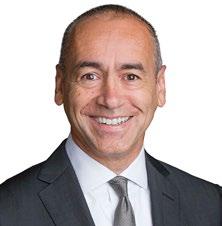
Echevarria’s time at the consulting and tax firm allowed him to absorb endless valuable information about how to run a large business, from dealing with regulatory and product challenges to the obstacles that emerge when a company is trying to scale up globally. And that education was two-fold: learning how Deloitte itself achieved success, but also learning from helping the firm’s client companies to grow.
All of that prepared Echevarria for BNY Mellon, which was one of his clients at Deloitte. It was through that relationship that he joined the organization as a board advisor in 2015.
“People always remember how you make them feel. They rarely remember everything you said. They just know how they feel when that interaction is over, and that stays with them. It took me a while to figure that out. But it certainly became sort of the way I process leadership, even today.”JOE ECHEVARRIA
Celebrating excellence.
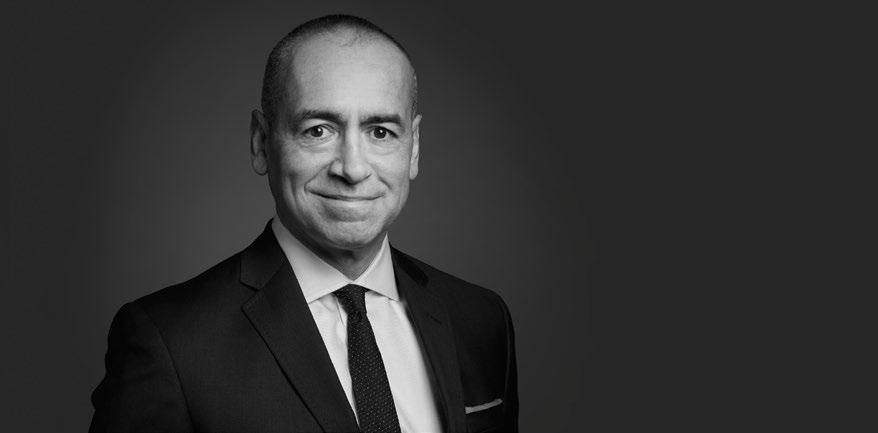
Alexander Hamilton founded the Bank of New York—which would later become BNY Mellon—in 1784. The bank’s deep roots in American history still astound Echevarria. He cites Hamilton’s handwritten entries in the ledger books kept at one of the BNY Mellon offices.
“You realize that this institution is so storied in its history,” he says. “Those are just amazing things to have.”
Reflecting on his own path as someone raised in the South Bronx by a single Puerto Rican mother, Echevarria sees getting to where he is today as the product of social intervention. He recalls a government initiative that put him and other students in his area of New York City into programs to get them on track to college.
“Because I benefited from a social program that I saw firsthand that could actually work, and this notion of the concept that [President] Obama used to say often, that talent or genetic code is equally distributed—what’s not equally distributed is opportunity,” he says. That was a driving reason behind why he wanted to be involved with Obama’s My Brother’s Keeper Alliance nonprofit, where he previously served as chairman of the board. He currently serves as a trustee at the University of Miami.
Echevarria’s accomplished career brought him to BNY Mellon with a well-honed ability to see business challenges and possible solutions in deeper context. He credits that to his time at Deloitte, which he spent learning about so many different industries.
“You don’t come at something with a singular lens of experience,” he says. He also benefited from an environment where there wasn’t a tangible product to sell, but rather a focus on delivering services and solving people’s problems with intellectual capital. Because of that, he says, “I think I just bring a slightly different approach to things. It has more of a people orientation. As I get older and I reflect on what really matters—in the end, people matter above all else.”
In all the work he does, Echevarria believes that real leadership is about inspiring others to go on a journey with you.
“People always remember how you make them feel,” he says. “They rarely remember everything you said. They just know how they feel when that interaction is over, and that stays with them. It took me awhile to figure that out. But it certainly became sort of the way I process leadership, even today.”
OPEN TO OPPORTUNITY
To Joe Echevarria, success with diversity and inclusion initiatives will come when such programs are no longer needed, and when achieving diversity comes organically for companies and organizations.
But he knows there is still plenty of work to be done first. Part of the challenge, he says, is that people on a single leadership team might all come from vastly different places in terms of their own understandings of what diversity means, and the differentsized gaps in opportunity that various marginalized groups face.
“I think what happens when you look at diversity and inclusion—it’s defined by experiences. Not everybody has an experience that makes D&I tangible for them, making it much harder to relate to,” he says. “Some people don’t grow up with that. That makes it challenging.”
He cited the terms “Hispanic” and “Latino” as one example: “To the nonHispanic, non-Latino, they’re the same, they’re interchangeable. Well, not to the people who carry the label, they’re not interchangeable,” he says. “If you talked to my mother, she would say she’s Hispanic, she’s not Latino. I identify with that because she taught me that, because it was handed down.”
That means that for leadership working on diversity initiatives, the effort is often twofold: explaining the differences between various identities, and then explaining why those differences matter. Education is at the heart of it all.
“You have to come from a place of fact,” he says. “You can’t allow people to have their own set of facts.”
CARI DOMINGUEZ

On the boards of ManpowerGroup
Triple-S
Calvert Research and Management
National Association of Corporate Directors
CARI DOMINGUEZ
Cari Dominguez has spent her career forging new paths in government, finance, and consulting. Now, as a board member and mentor to future leaders, she shows the way to others.
BY SARA DEETERWhat makes a leader?
Is it the skills they have learned? The impact they have made on the world? The people they inspire? To Cari Dominguez, an undisputed leader in finance, consulting, federal government, and nonprofit work, it’s all of those things, plus one more: a deep-rooted understanding of both who they are and what the world needs from them.
Dominguez “grew up fast” after immigrating to the US at twelve years old, she says. She had to—her father and brother had both been prevented from leaving Cuba, leaving Dominguez, her mother, and her two younger sisters to make a life for themselves.
“I had to learn a new language as well as understand a new culture and new way of life,” Dominguez recalls. “I learned to be flexible and adaptable and to really envision opportunities, even when the odds weren’t in my favor.”
The odds certainly haven’t always been in Dominguez’s favor. Her first job was dusting pianos for a local community college; from there she climbed to illustrious positions at Bank of America, the US Department of Labor, global search and consulting firm Spencer Stuart, and executive search firm Heidrick & Struggles. Along the way, though, she has faced many challenges as a result of being “the only woman, the only Hispanic, the only working mom, or the only one with an accent.”
“I faced those challenges believing that my personal characteristics were assets, not liabilities, that they would offer me a perspective and a voice that was lacking in those environments,” Dominguez says. “It’s not easy to think that way, and I don’t think I’ve always succeeded in my efforts. But I strongly believed that the time would come when organizations would consider the qualities I offered to be assets.”
Over the years, Dominguez hasn’t just been looking out for herself. Through her work with the Department of Labor and the Equal Employment Opportunity Commission, Dominguez set public policy designed to protect other women and minority groups from being discriminated against in the workplace.
“I was the architect of what we called ‘the glass ceiling initiative,’” Dominguez says of her time in the Department of Labor. “It was a difficult initiative to put in place because of the politics that were involved, but it has been so transformational and impactful.”
Today, as a board member and mentor to future leaders, Dominguez makes it her mission to further the impact she’s made during the course of her distinguished career.
Currently a corporate director for ManpowerGroup, Triple-S, Calvert Research and Management, and the National Association of Corporate Directors, Dominguez goes into each day remembering that “for every action, there is a reaction.” All board members strive to further the strategic objectives of the company, she explains, but she also seeks to “do well by doing good” and consider the full implications of a board’s decisions.
“I want to make sure that our decisions are really opening up opportunities for all,” Dominguez says, “for stakeholders, employees, customers, investors, and the communities we serve. They should all share in the success of our decision-making.”
Of course, Dominguez notes, it’s not always easy to predict the consequences of your actions. “Our world is dramatically changing—technological disruptions and digital transformations are just part of our lives now,” she says. And it’s not just technology— factors such as global competition, climate change, and constantly shifting demographics are all rapidly converging to create a world in which it is increasingly difficult to stand out, to make a difference, and to effect change.
“I faced those challenges believing that my personal characteristics were assets, not liabilities, that they would offer me a perspective and a voice that was lacking in those environments.”
Diversity, Inclusion and Belonging in the World of Work –The Time is Now
We all have a responsibility to be catalysts for change. ManpowerGroup is committed to creating a culture of Conscious Inclusion where everyone is invited in and all opinions are valued. Diversity of people brings diversity of thought, ultimately leading to better decision making and performance.
We believe that businesses have a responsibility to be a positive contributor to societal change. That includes cultivating and developing diverse and inclusive workplaces that are representative of the communities in which they operate. Through connecting millions of people to meaningful work for over 70 years, across 80 countries and territories, we have done just that.
From partnering with HACR, Prospanica and Cristo Rey, to hosting Supplier Diversity roundtables at our Milwaukee headquarters, to helping thousands of people upskill for in-demand jobs through our MyPath program – our people are delivering on our commitment to develop inclusive work
environments through our training initiatives around the world. We’re committed to hiring, promoting and creating a culture where everyone can achieve their potential and are proud to partner with 400,000 clients around the world to do the same.
We know preparing people for the future of work starts at home. We believe it takes a village – or a whole organization – to create workplaces where people feel comfortable bringing their best and full selves to work. This cannot be done by HR and Diversity & Inclusion operating as silos. At ManpowerGroup, we have developed a clear diversity strategy: measure and report progress to our leadership and Board.
We believe meaningful and sustainable employment has the power to change the world and we know our approach to diversity works. In 2019, ManpowerGroup was recognized as a Best Employer for Women1 as well as Diversity2 by Forbes, one of the Best Places to Work for LGBTQ Equality by the Human Rights Campaign Corporate Equality Index3, and one of the Best Places to Work by the Disability Equality Index4.
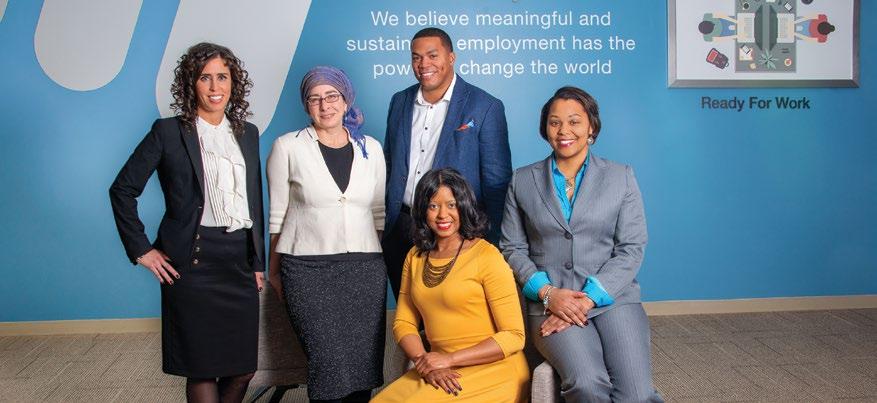
MAKING A DIFFERENCE IS HUMANLY POSSIBLE
ManpowerGroup is proud to congratulate Cari Dominguez on being recognized by Hispanic Executive as one of the Best of the Boardroom.
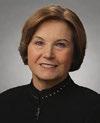
For more information on ManpowerGroup’s commitment to Doing Well by Doing Good visit: doingwellbydoinggood.manpowergroup.com.
1 https://www.forbes.com/best-employers-women/#443621be7de9 2 https://www.forbes.com/lists/best-employers-diversity/#1db6545d6468
3 https://www.hrc.org/resources/best-places-to-work-2019 4 https://disabilityin.org/what-we-do/disability-equality-index/best-places-to-work/
(left to right) Dessa Johnson, Diversity & Inclusion Leader North America; JoAnn Strickon, Global Corporate Sustainability Manager; Chris Rowland, Global Diversity Officer; Jasmine Johnson, Supplier Diversity Director; Nafessa Burdine, Community Investment ManagerTHE THREE CS FOR FINDING SUCCESS
Cari Dominguez believes there are three essential “ingredients” for a successful professional life: competence, character, and confidence.
COMPETENCE
“Competence comes from doing the very best you can do. Hard work and perseverance always prevail, but you also have to understand the business you’re in and stay engaged in lifelong learning.”
CHARACTER
“Character is a leadership ingredient. You may work for a company that is at odds with your values, and you have to have the courage, honesty, integrity, and determination to be true to yourself despite that, or pursue a more compatible environment.”
CONFIDENCE
“I think confidence is the hardest to develop. It comes from seeking counsel and getting honest feedback, and then surrounding yourself with supportive individuals who have your back.”
Our future depends on the leaders who are able to meet that challenge, Dominguez says, and she is committed to preparing those leaders for what lies ahead.
A critical part of that preparation is encouraging future leaders to find a worthwhile focus for their efforts; they need to not only identify an area with a true need but also a market for their talents. “When you look at technology and all the changes that are coming down the line, you have to consider what educational or career track is going to be valuable to you over time,” Dominguez explains. “I’m all for advocacy and activism—we have to love what we do because talent is worthless without motivation—but is that going to be a full-time job, or a passion?”
Dominguez asks questions like: What’s your manner of traveling? What are you looking to accomplish? What are the obstacles and barriers you will face? “It’s not just about knowing what you want your final destination to be,” she says.
“You have to decide how you’re going to position yourself to do what you need to do and then find the unique quality or attributes that will set you apart in that area,” Dominguez advises. “And I think leadership is one quality that will do that.”
“I want to make sure that our decisions are really opening up opportunities for all—for stakeholders, employees, customers, investors, and the communities we serve.”
INSIG HTS

Evelyn Marchany Garcia fuses her scientific curiosity and people skills to optimize quality operations at biopharmaceutical giant Bristol-Myers Squibb
From Lab Chemist to Leadership
BY A.J. ZAKSCIENCE AND MATH ARE WHAT
initially drew Evelyn Marchany Garcia to the pharmaceutical industry. But her deep passion for people and patients is what took her up the ladder in the biopharmaceutical industry to Bristol-Myers Squibb.
Marchany Garcia started working as a bench chemist in her native San Juan, Puerto Rico, when she was still a student at the University of Puerto Rico in 1990. On an island with a booming pharmaceutical industry, she knew her skills would be in demand. But in her second year of work at IPR Pharmaceuticals, a part of AstraZeneca, she made the shift from being a chemist to a shift supervisor—a change that she says brought her natural leadership traits to the surface.
“When there were complicated technical issues, I moved away from my comfort zone and sought to transform things as a team with a unified purpose,” Marchany Garcia says.
Following fifteen years at AstraZeneca, she worked at Schering-Plough, Merck, and Novartis. Today, she’s VP of external manufacturing quality at Bristol-Myers Squibb, ensuring products are manufactured in a safe and compliant manner complying with global regulations. Key to all her work is combining her love of leading others with her inquisitive spirit and passion for problem-solving.
When it comes to difficult situations or challenges, Marchany Garcia has helped companies address them, leading several transformations throughout her career. “Each experience has been an amazing opportunity. I want to come in and lead an organization to engage all and deliver results,” she says.
Marchany Garcia has memories of improving the reliability of product supply to the US market, while ensuring those products were manufactured safely and compliantly. This was in an environment where market demand fluctuates, requiring the manufacturing operation to be flexible and adaptable. At the time, teams there operated in silos and disconnected, which
led to poor communication and performance deficiencies.
“The other thing that was missing was, I think, the passion and the spirit to achieve something bigger as one team,” she says. “The culture was just tired. They were just working. And that needed to change, from the point of view of, you know, having people come to work because they want to come to work and add value.”
Along with digging into solutions on the business side, Marchany Garcia met with people at various sites each month to understand their concerns. Making sure people were properly taken care of was just one aspect of improving the workplace, she says. Smaller, simple changes made a huge difference and included improving cafeteria options, facilities, and even uniforms.
“People need to feel that they are in a place where we take care of them,” Marchany Garcia says.
The way she sees it, opening a channel of communication with team members at all levels creates a symbiotic relationship that can help everyone grow. She seeks out feedback from her employees and peers—as well as those she reports to—in order to understand ways she can continually improve.

“Everybody makes mistakes. When it happens, I really don’t beat myself up,” she says. “I try to understand what I could have done differently. That is my learning every single day.”
In 2015, Marchany Garcia was recognized at Sandoz, Novartis with the company’s presidential award for leadership after only five months at the organization.
Bristol-Myers Squibb recruited her in July of 2018 and she has led various quality organizations at BMS since then. She was then later appointed as vice president of external manufacturing quality at the beginning of 2020.
Marchany Garcia knows well from her personal life how to navigate challenges. She’s

“When there were complicated technical issues, I moved away from my comfort zone and sought to transform things as a team with a unified purpose.”
Evelyn Marchany Garcia

married to a woman, and her family had to move to the US so she would be able to obtain legal rights for the two daughters her wife carried. She puts in effort to participate in company initiatives at Bristol-Myers Squibb where she can share her personal story with employees and serve as an example of courage and uncovering.
“I really want to make sure people can be supported,” she says. “For the people that are not in corporate, it’s super significant when you have someone like me being open about it and supporting them.”
A desire for openness and connection across departments is something Marchany Garcia cultivated early in her career. Looking back on her time as a chemist, she likens the scientific labs figuratively to mazes: “When you go in, you are constricted to that space. You are in a place where it’s easy to isolate from the broader organization—you become like a culture within a place.”



She prefers to transcend boundaries and hierarchies.



“I go out to try to understand how the process works . . . and engage with different people at different levels,” she says. At Bristol-Myers Squibb, before her recent appointment, she led internal manufacturing quality, with nine leaders reporting directly to her. Each of them was responsible for overseeing one hundred to two hundred employees at different locations around the world. Marchany Garcia is mindful and balances the intent to meet and connect with everyone with the crucial ability to be closer to the operation when the right level of detail and understanding is required. At the same time, she maintains her holistic view according to her global responsibilities.
“When you help others identify their unified purpose, when you’re open, when you’re honest, when you’re humble, when you let people get to you and you are authentic with them, you can achieve anything,” she says. “As a leader, you will drive results; you will make things happen with an engaged and determined team that wants to get there. I think that’s my success formula.”
“People need to feel that they are in a place where we take care of them.”
We’ve seen you work, we’ve seen you lead, we’ve seen you grow, we’ve seen you succeed always being you.
Congratulations on your achievements.
A storied, purpose-driven career has made a business and community leader out of Roel Campos, and his impact and influence continue to rise
The Power of Purpose
BY KATHY KANTORSKIMANY TITLES CAN BE USED TO DESCRIBE THE ROLES of Roel Campos’s career. Air Force officer, lawyer, entrepreneur, general counsel, SEC commissioner, law partner, advisor, board director, chairman . . . these are perhaps the most prominent, but they certainly do not encompass the full list.
It seems almost poetic that a man whose experiences are so diverse is also a prominent advocate for diversity and for the Latino community as a whole. Campos has reached leadership levels that few, if any, Latinos have reached. And so, his continued success—and empowerment of successors who reflect his values—has become paramount.
Some of the most successful Americans in history have a singular trait in common: the ability to persuade others. Roel Campos is no
exception. Perhaps gained from his legal training or perhaps innate, he knows how to position an issue in a way that motivates others. In some, persuasion is a power used for personal gain and feels overbearing, often leaving those who were persuaded feeling duped. In Campos, however, the ability comes across as wisdom. It can even transcend the act of persuasion to a level of inspiration; it can inspire purpose.
Campos views himself modestly and explains, “As my family will assure you, God has given me no special gifts. In my work, I begin with a deep respect for others’ views. That leads to the building of a measure of trust, which can help discover common ground, often leading to some form of agreement. Persistence and being resilient are key.”
Now, take this ability, amplify it by his influence, and one can see how he has achieved great success in his various roles.
As chair of the Securities Enforcement Defense practice at Hughes Hubbard & Reed LLP, an international law firm named by the American Lawyer as one of “the top firms among the nation’s legal elite,” Campos uses his persuasiveness—helped by his experience as former SEC commissioner—to represent companies and executives who are having to defend their actions against allegations or potential allegations of wrongdoing by the SEC.
“Everyone deserves a fair defense,” he says. “If there’s an obvious wrongdoing, the approach that one has to take is to find a fair settlement. Often—I would say most cases—the alleged misconduct has been caused by an error; it’s inadvertent. They violated a rule. For example, the client wasn’t clear enough in their disclosures. What I do is I work with the enforcement division of the SEC and try to make sure that we have an understanding of the facts (finding trust and common ground) and then try to have a reasonable resolution.”
This legal specialty has given Campos a high level of visibility in the American legal and business landscape. “Part of my work involves having people understand that I have capabilities and qualifications that will be useful to them,” he explains. “I write, I make speeches, I speak on panels, I’m available to advise companies in preventive situations. I also speak to boards about what they might do to anticipate problems.”
Building upon this visibility, Campos also serves on the boards of several businesses: Regional Management, a consumer loan company; Liquidnet, a registered broker dealer and automated trading system; and several early-stage companies that he is helping grow. It is in these roles that one of his underlying purposes is activated: advocating for diversity in the most senior levels of the business landscape, particularly for the Latino community.
Understanding this advocacy, it comes as no surprise that, in 2019, Campos became chair of the Latino Corporate Directors Association (LCDA), and that he continues to serve as chair of the Smithsonian Latino Center and Gallery and is on the board of the Latino Donor Collaborative.
 Hubbard & Reed LLP
Hubbard & Reed LLP
Board
Director Regional Management Inc.Board of Directors Liquidnet Inc.
Chair of Board of Directors
Latino Corporate Directors Association (LCDA)
Chair of Board of Advisors
Smithsonian Latino Center
Board Director
Latino Donor Collaborative
“Few people know that we’ve had Latinos in America since before there was a United States, going back to the 1500s. We’ve had Latinos serve the country in every war that’s ever occurred. Latinos have died for this country, their country. That story is not really understood.”
Roel Campos Senior Counsel
Hughes,
“Yes, in conjunction with my business responsibilities, my top priority is to be an effective advocate for the Latino community,” he says.











It is in these roles where his diverse experiences and persuasiveness elevate into the ability to inspire purpose in others. One example of this is seen in his work with the Smithsonian Latino Center, a project that has been in the works for several years but will come to fruition in 2021, when the Molina Family Latino Gallery will open in the American History Museum in Washington, DC—what Campos describes as the first stage toward eventually having a Smithsonian Latino museum, which requires Congressional approval.
Campos brought this concept of a Smithsonian Latino Gallery to the Molina family. The father of the family founded Molina Healthcare, which became a Fortune 500 company. Subsequently, using his persuasive approach, Roel Campos helped convince the Molina family to contribute $10 million and become the founding donors for the future Latino Gallery that will bear their name. This gift is one of the largest philanthropic gifts in history by American Latinos.
“It will be a venue within the Smithsonian Institution, America’s museum, that deals with the story of American Latinos,” he explains. “There is no other venue in the US that’s dedicated to telling the history—the story, the accomplishments—of Latinos in America. For example, we’ve had Latinos serve in every war that’s ever occurred, from the Revolutionary War, the Civil War (North and South), the two World Wars, Korea, Vietnam and, of course, today’s undeclared wars in the Middle East and Afghanistan. Since the beginning, Latinos have died for this country, their country.
“We are obviously in a very polarized time in our history and there is much antagonism toward Latinos,” Campos continues. “The Molina Latino Gallery on the nation’s mall will help educate mainstream Americans, and even our own community, about the critical contributions that Latinos have made and continue to make to America.”
He adds, “Hopefully, in time, the Molina Latino Gallery will help bring Latinos fully into the American family.”




















































With Campos involved, that hope is more likely to become a reality.
Regional Management Corp. (NYSE: RM) is a diversified consumer finance company that provides attractive, easy-to-understand installment loan products primarily to customers with limited access to consumer credit from banks, thrifts, credit card companies, and other lenders. Regional Management operates under the name “Regional Finance” in 356 branch locations across 11 states in the southeastern, Southwestern, Mid-Atlantic, and Midwestern United States.














The Wizard of Ops
From the Iowa cornfields to assistant general counsel at Con Edison, Teressa Barillas has paved her own yellow brick road
BY ANTHONY RUTHTERESSA BARILLAS’S JOURNEY
from the cornstalks of Iowa to the skyscrapers of New York could be a modern-day Wizard of Oz , and the lessons she learned back home have supported her on the road to becoming assistant general counsel of legal innovation and operations at Con Edison.

It wasn’t easy for Barillas’s father, a Guatemala-born psychologist, and her stayat-home mother to send all of their six children to college. “I had to spend a couple of summers detasseling corn, both with my other siblings and once with our entire family,” Barillas recalls. “I thought, wow, I really need to do something more than this.”
Barillas had taken some pre-law classes at Iowa State and thought a legal degree could open up opportunities for her. She took the LSAT, then boarded a Greyhound for New York, where she had a great-uncle she could stay with while experiencing the city before applying to law school. Her mother had skimmed a little money off the grocery budget to help her get started, but she needed a job and went to the corporate headquarters of JCPenney because she’d worked in one of their Iowa stores.
“I said, ‘Can I speak to the HR person?’ and they’re like, ‘It’s a floor,’” Barillas remembers. Still, she was undeterred. “I told them I was from a store in Des Moines and I wondered if they had any jobs.” After a brief wait—and an egg salad sandwich and Diet Pepsi that set her back more than five dollars, making clear she was not in Iowa anymore—she secured a job in the risk management department.
Barillas soon had a life in New York and she decided to stay for school. Two years into night classes, she landed an internship with the Port Authority, which covered her tuition. She was excited to join the public service sector, following after her father, who worked for the state of Iowa developing programs to help people with disabilities enter the workforce. Her parents had also
“The legal innovation and operations group that I have did not exist before I got here, so it was the opportunity to create it from scratch and to help move the company forward in its technology journey.”
Teressa Barillas Assistant General Counsel, Legal Innovation & Operations Con Edison
taken in family members when they needed a home, as well as a teenage boy who escaped the Castro regime in Cuba and remains close to her family to this day.
“I always thought that was really important. That whole ‘give back’ vibe and doing the right thing were ideals my parents stressed,” Barillas says. “It really spoke to me, and public service is something that I found to be very rewarding.”
Barillas stayed in public service after law school, working in the New York City Law Department, where she quickly made waves. In one year, she got seventy-seven cases against the city dismissed on motion, which earned her the Municipal Service Award from the Association of the Bar of the City of New York. Five years and three promotions later, she was raising a young daughter on her own.
In total, Barillas spent twenty-three years with the city, her last and longest role being director of litigation support, leading the division responsible for electronic discovery and developing the agency’s matter management system. She liked the mixed legal/technical role, and she frequently gave demos of the system to other organizations looking to implement similar technology. One of those was Con Edison. “I got a call to come and talk to the general counsel about what my job was,” she recalls, not realizing until she got there that she was walking into a job interview.
Barillas saw the potential and took the role. “The legal innovation and operations group that I have did not exist before I got here, so it was the opportunity to create it from scratch and to help move the company forward in its technology journey,” she says.
Since joining Con Edison, Barillas and her team have moved the law department forward in its Law Department of the Future initiative. They’ve implemented a matter management system, upgraded the document management system, and added workflow
technology for three different processes, including one that’s cross-departmental. In addition to implementing the systems, “We were able to make them all talk to each other in a way that makes it much easier for people to work,” Barillas says. For example, the matter management system interfaces with the document management system as well as HR and accounts payable systems to facilitate the department’s work.
Barillas is supported by her team of eight and proud of their diversity. “We are diverse in gender, race, ethnicity, and even age. I tie our success directly to that diversity of people and ideas,” she says. “I have a great team to work with every day, and doing that, knowing that it helps the company fulfill its mission of providing safe and reliable energy to the New York region and moving toward a clean energy future—it’s really cool to be part of that.”
Barillas says her biggest challenge has been keeping a balance between work, family life, and time for herself. “I continue to be a work in progress,” she says. But her most important critic approves of her performance. “I overheard my daughter telling one of her friends, ‘Yeah, my mom’s a baller,’’’ Barillas says, laughing. “I was like, oh my gosh, she actually recognized that I made something of myself.”
“I have a great team to work with every day, and doing that, knowing that it helps the company fulfill its mission of providing safe and reliable energy to the New York region and moving toward a clean energy future—it’s really cool to be part of that.”
Genaro Perez Jr. on how his people skills and wide-ranging connections have enabled his success in both consulting and nonprofit management
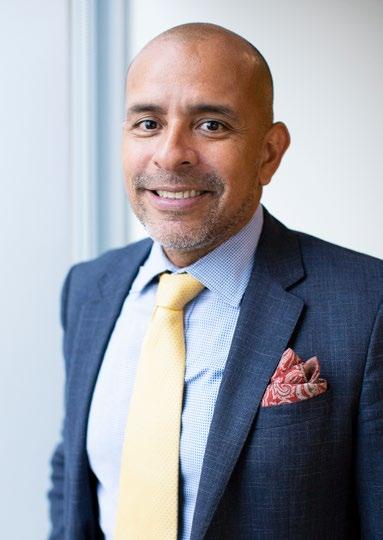
Know Your Network (and How to Use It)
BY SARA DEETER Genaro Perez Jr. Director of Business Development CrossCountry ConsultingNow, as director of business development at CrossCountry Consulting and on the NY senior leadership council of the Association of Latino Professionals for America (ALPFA Inc.), Perez is able to capitalize on both his people knowledge and his wide-ranging connections.
All of his career, Perez has focused his efforts on growing and developing his team. “That’s one of the most important things I’ve learned, was the importance of bringing people on and then nurturing, inspiring, and motivating them,” Perez offers. “The more I can develop my team and have them join me during complex client situations, the more confidence I’ll have that my clients’ attention is being addressed in my absence. And that’s how successful teams help grow the business.”
This approach actually flies in the face of conventional wisdom, Perez explains. Many people, especially in a field like consulting, are extremely protective of their client relationships and aren’t willing to open them up to junior team members. But Perez believes firmly in giving his team opportunities to “own it.” As he says, “That’s what open communication—and an open door—really means. I’m open to stepping back and having someone on my team meet with a client because they can use that opportunity to do great things.”
Of course, Perez does not throw his team members into those situations alone without preparation or training. “It was hard work but my teams enjoyed the camaraderie,’” Perez says, laughing. “You have to go through a bit
Genaro Perez Jr. knows people. He can assess their character and what keeps them motivated, how they react in certain situations, and what they tend to need from him.
Perez knows a lot of people—over the course of his twenty-five-year career, he has made innumerable connections in the key fields of finance, consulting, and nonprofits.
of a journey before you can take advantage of these opportunities. I always tell them that it’s about effective communication, people skills, and exceeding expectations.”
First, Perez explains, you have to lay a foundation with both your team and the client. When client opportunities come from a pursuit, ask questions and talk to your team about it—then follow that with strategic research. Do you understand the company? The trends within the industry? What’s driving the needs? After that, you need to assess the competitive landscape and identify what you can bring to the table. “Doing that groundwork really helps build rapport and strengthen relationships, which is key to any professional services firm like CrossCountry,” Perez notes. “It will also serve you well to bring a personal touch to your interactions with the client. Talk about your personal life, your family—just have an open, informal conversation.”
He explains that this kind of dialogue helps build cumulative trust. “It’s human nature to want to work with and be around people that you enjoy,” says the director of business development. “In fields like consulting, the people you’re working with are incredibly smart—they know when you’re trying to sell them something, and they know when you’re being genuine and honest.” He also says having a high emotional intelligence can be helpful as it offers the ability to be socially and self-aware. Those who are self-aware can positively manage emotions to communicate effectively, empathize with others, and overcome challenges.
In addition to helping his team forge relationships with clients, Perez has leveraged his network of connections from Goldman Sachs, Deloitte, and other top companies to generate new business relationships. “When I reconnect with people from my professional past and connect with new contacts, I make it so there’s a positive outcome for everyone involved,” he says.
According to Perez, it is that same focus on networking and relationship-building that has made ALPFA so successful. In Perez’s two-plus decades with the organization, membership has increased from just three hundred to over eighty thousand. “The people that I met twenty-four years ago are now CFOs, CEOs, and partners at accounting firms,” he says. “And a lot of that success came down to the ALPFA network—that’s where people often go to get clients, to get mentors, and to find new opportunities.”
The leadership at ALPFA, Perez says, realized that some of the most sought-after firms for aspiring students and young professionals to join are also the hardest to get into, especially for Latinos and other minority groups. Perez himself worked in one of the Big Four Global CPA firms but admits, “You had to be at the top of your class, have relevant experience, and demonstrate leadership skills by your junior year.” He says, “The rigorous recruiting process to the Big 4 Global CPA firms is highly challenging, requiring months of preparation. Now we’re looking to make sure that our members have access to resources and mentors so they can compete on a level playing field.”
“When I reconnect with people from my professional past and connect with new contacts, I make it so there’s a positive outcome for everyone involved.”
A Next Level of Opportunity
As the VP of supply chain, Yvone Nava has pursued sustainability efforts at Danone while also seeking supply-chain efficiencies
 BY BILLY YOST
BY BILLY YOST

IN 2017, EVIAN ANNOUNCED THAT
it had been audited and certified by Carbon Trust as a carbon-neutral brand in the US and Canada. The $336 million investment by the company included converting all of their water-bottle material to be 100 percent recyclable and overhauling their bottling plant in Évian-les-Bains, France, to run entirely off of renewable energy. The effort was in concert with parent company Danone’s much larger One Planet. One Health. sustainability effort. That initiative aligned with the 2030 Sustainable Development Goals of the United Nations and is founded on nine long-term goals across all over Danone’s brands. The company’s recent certification as a B Corp is a major milestone thanks to these efforts, and it’s an accomplishment Yvone Nava says she’s proud to share with her child.
Born in Texas but raised in Mexico City, the vice president of supply chain has been at Danone for fourteen years, and in that time, she’s learned that the success of Danone’s sustainability efforts—as well as its broader business objectives—is the result of a collaborative effort that has substantial parallels with motherhood. “Working cross-functionally is so important,” Nava says. “Having a child, I’ve realized that it really takes a village—and it’s the same here.”
A group-minded effort and culture have kept Nava wholly engaged at Danone—never mind the lengthy commute. “I always tell people it’s worth it because of the culture and the people. I love this place,” Nava says.
DOING THE JOB TOO WELL
One of Nava’s primary responsibilities is identifying when and where efficiencies can be implemented. It’s a role that’s had to evolve in large part because Nava has been so effective. “For someone that has been here for a while, the pool of projects you can touch can get small pretty fast,” the VP says. “It’s tough to makes things more efficient that you’ve already made more efficient—at least
not at the same scale.” It’s been one of Nava’s biggest challenges, but one that she has adapted to, first by scaling down her scope to smaller areas of focus, then by expanding far beyond the walls of Danone.
“When it comes to thinking outside of the box in order to identify my next project, it really comes down to engaging our external stakeholders and thinking outside of the organization,” Nava explains. “We look at our third-party logistics [3PLs] and see how we can leverage opportunities to help each other.” She says this after having just gotten off a call with a beverage distributor to see what in their model might coincide with
Danone’s processes and how the two might ultimately collaborate to save money and improve efficiencies. “By going external, I’m starting to find our next level of opportunities,” she says. “What actions can we take to help our partners find mutual benefits?”
In the end, the focus on relationship building has no downside. “More and more, you find people are willing to talk,” the VP says. “Even if nothing concrete comes from it, the brainstorming exercise is beneficial for all parties.”
PRIDE OUTSIDE OF BUSINESS SUCCESS
Nava’s long stay at Danone can also be linked to what she considers a strong connection between her own values and those of the company. Sustainability efforts for the environment, the VP says, are inherently built into Danone’s culture. “The Evian project has shown us a new way of working and thinking, and we are committed to reducing the entire company’s carbon output year after year,” Nava says. As a young intern at Danone Mexico, Nava still remembers watching the recording of a speech from Danone founder Antoine Riboud, during which he expressed a commitment not just to the bottom line, but the betterment of the world. It was a viewpoint that was thought of as unorthodox at the time, even in France. “I know it sounds cheesy, but I remember getting chills,” Nava says. “You have an opportunity to really live those values here.”
Nava’s business partners have seen her blossom as a result of living those values. Luca Baldoni, who manages the Danone US account at Geodis, has long been impressed with her expertise. “I’ve been working with Yvone for several years, and because we partner with Danone in the supply chain of transportation and logistics, I’ve had the opportunity to see her professional growth during that time,” explains Geodis’ vice president of sales for the Americas. “I see her as a true ambassador of Danone’s mission, a
“I answer that Danone is like Mexico City: a fastpaced place, full of amazing people eager to make a difference and work as teams to deliver results.”









DANONE’S YVONE NAVA
professional leader with strong ethical values, and someone who never stops thinking about innovation and optimization. At Geodis, we’re glad to collaborate with Yvone—she is a great business partner.”
Danone is fortunate to mark 2019 as another record year, one in which the company advanced in part due to its acute attention to detail. “[Success can be the result of] simple things, like relying more on rail than trucks, having the right metrics in place, and making the right cost/benefit decision—not just from a cost standpoint, but from a carbon impact view, too.”
Indeed, Danone’s achievement of a B Corp certification has been a high point for the VP, and she attributes it to far more than herself. “This was something that truly gives me more satisfaction than our sales,” Nava explains. “The work that I’ve driven is now being carried on by my team, and the efforts that they have made to push for more sustainability.”
As the VP has risen through roles, she continues to underline that while her results-oriented style has helped achieve big wins at Danone, it’s the village and not the individual that cements the company as a global mainstay in food. “As I onboard new hires, I often get asked why I have stayed with Danone for so long,” Nava says. “I answer that Danone is like Mexico City: a fast-paced place, full of amazing people eager to make a difference and work as teams to deliver results.”
Spot congratulates Yvone Nava on this exciting and impressive recognition. Our company has had the pleasure of providing customized transportation services to Yvone and her team for many years. We look forward to the continued success and growth of our relationship with both Danone and Yvone. spotinc.com

“Working cross-functionally is so important. Having a child, I’ve realized that it really takes a village—and it’s the same here.”
A SMARTER WAY TO SHIP
Spot was built on the belief that there is a better way to move freight. We believe in keeping our promises, getting the little things right, and doing whatever it takes to get the job done.
Make Way for Walgreens
Alejandro Martinez discusses how the company is working to reinvent itself to compete with online retailers and meet changing customer preferences
BY A.J. ZAKHELPING LEAD A GLOBAL BUSINESS THROUGH A PERIOD
of great transformation is not new for Alejandro Martinez. He was chief information officer for a division of General Motors, where he stayed for years, serving in various roles while leading teams across several continents and helping the auto giant through the complexities of bankruptcy.

Martinez now puts that breadth of experience during his years at GM to use at Walgreens Boots Alliance. The ubiquitous pharmacy and retail brand is in the midst of a massive transformation, adapting to shifting consumer preferences and becoming an increasingly digital enterprise.
Born and raised in Mexico, Martinez earned a bachelor’s degree in computer science and a master’s degree in science—both from Universidad La Salle in Mexico—before joining General Motors Mexico as chief information officer in 1999. It was a “dream job” to be an executive at such a well-known company, he says. A couple years later, he was promoted to CIO of part of GM that included operations in Latin America, Africa, and the Middle East. That was a transformative experience for Martinez, especially in terms of global exposure. In his five years in that position, he became adept at communicating between and among various cultures.
“When you’re leading a region as diverse as the one I described, you’re dealing with multiple cultures, multiple religions, multiple values,” he says. “It’s quite interesting, when you have a cross-country organization,
just the way that you address your teams in order to motivate and to make sure you deliver the right message. It requires very strategic planning. You motivate people in Brazil very differently than the people of South Africa.”
Along with those positive learning experiences Martinez treasures, there were also tough days at GM. The company filed for Chapter 11 bankruptcy protection in 2009, during which time he was working as CIO of GM Europe. That was probably the most difficult time of his professional life, he says, but also perhaps the most enlightening in terms of leadership. Martinez learned how to motivate that team throughout the ordeal. He developed a thick skin.
“New challenges can present opportunities to build leadership skills and to rally people together. As a leader, you need to find ways to motivate your teams.”
After leaving GM in 2014, Martinez joined a clinical research company (then-called QuintilesIMS) where he was SVP and CIO before moving to Walgreens three years later.
“When you’re leading [a global team], you’re dealing with multiple cultures, multiple religions, multiple values. . . . It requires very strategic planning. You motivate people in Brazil very differently than the people of South Africa.”
The resilience and adaptability Martinez built through his time at General Motors serves him well at Walgreens as the company undergoes a seismic shift in response to increasingly digital consumer patterns, a changing healthcare landscape, retail trends, and other developments. One example of how the business is transforming, he says, is through a project underway to rebuild the Walgreens pharmacy platform to integrate more automation and artificial intelligence, with the goal of making the experience “frictionless” for customers.
But the changes at Walgreens go way beyond technological upgrades alone, Martinez says. The transformation includes everything from how Walgreens competes with online retailers to revamping point-of-sale systems and supply chain networks to improving engagement with a customer base whose shopping preferences are constantly— and rapidly—evolving.
“We’re reinventing ourselves on all fronts at the same time. This is an exciting time. The marketplace has changed, consumer preferences are evolving and there are new competitors. We are focused on controlling our future.”
Building strong teams is a crucial skill to be able to compete in that game. As a leader, Martinez believes in a mix of empowerment and accountability for his colleagues. As a sports fan, he doesn’t look for “superstar players,” he says—he would rather have people who know how to work as a team and run the play.
“I see myself as a coach,” he says. “My job is to make sure that I pick the right players to be part of the squad that I train them properly, and I put them in the right positions at the right time. At the end of the day, what matters is the team.”
Some executives at companies that are changing as much as Walgreens might feel compelled—along with all the new technology and new systems—to replace longtime employees with fleets of newcomers too. But Martinez sees value in achieving a balance of institutional knowledge employees, and newer arrivals who can bring a fresh perspective.
Martinez is also grateful for those who helped him become the leader he is today. He cites CIO Ralph Szygenda who was in place during his time at GM, an executive who spent time and effort helping Martinez work his way up. It was a lesson that he never forgot, he says, and something he thinks about as he invests his time in others at Walgreens.
“At the end of the day, yes, you stand by yourself,” he says, “but it’s important to reflect on why you are here, and how you got here.”
Walgreens aims to improve health outcomes for its customers and patients through neighborhood pharmacy and health care services, delivering affordable, accessible, quality health care at the intersection of physical and digital.
Walgreens Find Care™ includes chronic care management, featuring diagnostics, connected devices and therapeutic solutions for patients with diabetes, asthma, COPD and/or sleep issues.

The Walgreens Find Care™ platform provides access to many products and services including the Philips SmartSleep Analyzer, which helps people identify the potential reasons contributing to their sleep issues and connect to sleep diagnostics, guidance, products and solutions.

www.walgreens.com


Ariel Ruiz Wants to See Uber Fly
Uber’s senior litigation counsel is helping the company redefine access to services
BY JULIA THIEL“IN A
PERFECT WORLD, ANYONE CAN GET
from point A to B safely, regardless of their ride choice, be it public transportation, bicycle, scooter, ride-share, private car, or flying vehicle,” Ariel Francisco Ruiz says. It may seem like a strange statement for an employee of Uber, which built its reputation on ride-sharing technology—but Uber has expanded far beyond enabling rides and earning opportunities via traditional cars. Uber’s app now allows electric bike and scooter rental, the company has a subdivision for driverless vehicles, and it also hopes to enable aerial ride-sharing within the next few years. That initiative, called Uber Elevate, is working with partners to launch VTOL (vertical takeoff and landing) aircraft to transport riders between skyports and being devised by top names in architecture, design, and engineering. “It’s our path to becoming the Amazon of access to transportation, which we think is also going to be vertical,” Ruiz says.
It’s that type of innovation that drew Ruiz to Uber, where he’s been senior litigation counsel since April 2017. A graduate of Cornell Law School, he worked at the law firm Morrison & Foerster for nearly eight years after graduation, first in New York City and then in San Francisco—a move he made in part because his husband was in business school there. His transition to Uber was a little unusual: a partner at Morrison & Foerster who knew someone on the legal team at Uber not only tipped off Ruiz that Uber was looking to hire someone with his experience, but also helped him prepare for the interview. He got the job, obviously.
“I wanted to work at Uber because I thought it was a disruptive company,” he says. “It was changing the way people got around, and I thought that would ultimately change the way cities are built. Public transportation doesn’t always serve all areas or the people who would use it most. Parking on the street is a really inefficient way of using space.
“You can use that space instead for dedicated bike and/or bus lanes, dedicated paratransit and/or ride-share pickups and drop-offs. You can build public parklets, add bee friendly, bioretaining and/or carbon-reducing landscaping, or increase the size of pedestrian sidewalks . . . I can go on and on. I thought this company had such great potential to enable great things for residents and visitors of cities and towns of all sizes.”
In the relatively short time that Ruiz has been working at Uber, the company has already grown quite a bit. One of the most notable changes is Uber’s IPO in May 2019, which
Ruiz finds especially exciting. “The thing that I look forward to is seeing how the market judges the company,” he says. “I think the company continues to have a tremendous amount of growth potential.”
What’s evolved the most over the last few years, though, Ruiz says, is Uber’s emphasis on doing the right thing. “Even [when I started], what I saw was that everyone was trying to do the right thing. Since then, it’s become the bedrock principle that is carried through every single thing that everyone does. Every decision is looked at as, is this going to make our technology better for the people who use it and the cities where they use it?”
In his own job, things have evolved significantly for Ruiz since his days at Morrison & Foerster. There, most of his matters were complex commercial litigation, class-action, and unfair competition cases. Now he still practices in those areas and more, including accessibility. Ariel also works on a number of arbitrations—some of which he handles himself from
“I wanted to work at Uber because I thought it was a disruptive company. It was changing the way people got around, and I thought that would ultimately change the way cities are built.”
start to finish—in addition to small claims matters, which are almost always handled in-house. “People who connect with each other via our technology typically sue us and not each other,” he says. “It keeps us busy.”
The company’s “do the right thing” motto also applies to the legal team’s work. “Sometimes the outer bound of the law would technically allow the company to take a particular path.” Ruiz says. “We ask, however, is this good for riders, drivers, eaters, couriers, restaurants, carriers, shippers, cities?”

It’s a mentality trumpeted by the partners Ruiz works with on a daily basis. “Ariel is a brilliant lawyer, an eminent professional, and an ideal client,” says John Quinn, a partner at Kaplan Hecker & Fink LLP. “He works at the intersection of cuttingedge technological innovation and innovative legal argument, and he brings deep experience, tremendous knowledge, a solution-oriented and pragmatic mind-set, and a knack for teamwork to everything that he does.”
Ruiz’s job is a demanding one, made even trickier by the fact that he doesn’t generally control his own schedule. “Our calendars are open to all employees—I always joke that I have twenty-five thousand clients,” Ruiz says. “People are always putting time on my calendar.” As a result, he puts everything in his life on his calendar, including going to the gym, taking his dog to the dog park, dinners, appointments, etc.—along with work-related things like working on motions and briefs. Otherwise his day can get filled up with back-to-back meetings and he ends up having to do his other work with court ordered deadlines overnight or on weekends.
Still, he makes time for diversity initiatives like the Law in Tech Collaborative, a program started by eBay that’s expanded to several other companies, including Uber. It aims to give law students from underrepresented backgrounds the ability to split their summer internship between the legal departments of these companies and traditional law firms. Ruiz
Kaplan Hecker & Fink LLP

served on the selection committee for last year’s batch of students, reviewing résumés from a number of law schools, and interviewing students at the University of Miami. “It was great to meet these young, excited law students,” he says.
Ruiz is excited to see what’s next for his ever-evolving company. “Before you’re public, you watch to see how people react [to new ideas] via your family, friends, the media, and data,” he says. “But now it’s also the shareholders and the stock market [determining success].” And the ideas keep coming. There’s Uber Eats, that connects eaters, restaurants, and couriers. There’s Uber Freight, that connects carriers with shippers. There’s the newly launched Uber Works, that connects workers with big and small businesses that need to fill available shifts. And there’s the yet-to-launch Uber Elevate. “It’s going to be interesting which ideas win and where,” Ruiz says. “And I’m here for the teams working on making each of them a success.”

Shook, Hardy & Bacon:
“Ariel is deeply collaborative with his outside counsel, trusting us to do our jobs but also guiding us with his inside knowledge of the industry. This creates an easy-going relationship as we together strive to find creative solutions in this evolving industry.”
—Annie Chuang, PartnerReed Smith is a dynamic international law firm dedicated to helping clients move their businesses forward. With 3,000 people across 29 offices, including more than 1,700 lawyers, our long-standing relationships and collaborative structure make us the go-to partner for the speedy resolution of complex disputes, transactions, and regulatory matters.

At Reed Smith, we are passionate about diversity and inclusion. Our values are at the heart of everything we do; they represent who we are and who we want to be.
If you’re looking for a law firm that drives progress and values diversity and inclusion, visit reedsmith.com.
Using ‘Why?’ to Find a Purpose
At Strategies for Wealth, chief development officer Edwin Ayala wants to make sure employees connect to their work
By Kathryn Kruse
Ayala meets every recruit and, after a hire, oversees onboarding. The process begins with ensuring everyone has a great first week, with desks and nameplates and business cards in order. “We want them to see that we deliver on recruiting promises,” Ayala explains. But his true work begins as people settle into the office. To ensure success, Ayala coaches and trains each associate in intensive, one-on-one sessions for three years.
Thirty-one years ago, when Ayala joined the company, it had only twelve associates. He built out a successful brokerage agency, and, seeing his potential, leadership approached Ayala about taking on a sales management role. He accepted on the condition that he could change the model and focus on devel-
opment work instead of dividing his time. “This was mind-blowing,” Ayala says. “But it was about finding my unique ability, following my passion.”
The company’s massive growth over the past twenty-three years has not dampened his passion. Along with teaching very specific sales skills, Ayala makes sure associates write ‘why’ statements and have larger connections to their work. “We all need a ‘why’ and a purpose to lean back on,” he says.
The outcome speaks for itself. Strategies for Wealth has a 58 percent associate retention rate at the five-year point. “The industry average is 13 percent,” Ayala says. The company is also the number-one sales agency for the Guardian Life Insurance Company.* Beyond this quantitative data, Strategies for Wealth tries to stay true to its tagline, “Live Past Yourself.”
“We want to impact people we will probably never meet,” says Ayala—like clients’ kids and grandkids. “It’s not just about business.”
In his professional coaching, Ayala focuses on three essential areas: mindset, blind spots, and goal clarity. While he works with a set curriculum and lots of role-playing, when he talks, he mostly asks questions. “People stop by my office and ask, ‘How would you respond to this client?’ How I would respond does not matter. I ask, ‘How would you respond?’ Then I help them figure it out.”
“I’m a huge ‘why?’ person,” Edwin Ayala says. As chief development officer for the financial services firm Strategies for Wealth, Ayala is responsible for coaching the company’s financial professionals for the first three years of their careers—and he uses “why?” as a critical tool in all his work, from evaluating new hires to supporting veteran advisors.
To improve his practice, Ayala draws not only on sources like leadership conferences and books, but also a less conventional learning experience: coaching JV and varsity basketball for middle school girls. “I started out coaching my daughter and I just liked it,” he says with a laugh. For Ayala, working with youth is a constant reminder to focus on fundamentals and very deliberate practice. “I get girls that have never touched a basketball before and sometimes it takes months of work for them to be ready,” he says. It helps to remind him that, with new associates, showing something only once isn’t a good way to train. (Not only did his daughter go to college on a basketball scholarship, Ayala says, but they still have a great relationship.)
Both in coaching basketball and coaching financial professionals, Ayala’s first intent is to get buy-in on a vision. “Once you have that, then you have a team,” he says. Real work, he says, happens when people are included in conversation and discover answers for themselves. Sometimes, he says, “I have to be quiet and let people figure it out.” Even when he calls a time-out on the court, often he just asks the circle of girls, “What do you think? What’s going on out there?”
In 2019 Strategies for Wealth saw an uptick in associates in their early twenties; Ayala founded an innovative response. “I implemented and managed a young associates study group created by Strategies partner Jeff Neeck,” he explains. In the group,
more seasoned employees talk about their early days with the company and offer ideas for success. Ayala says that he’s seen a trend he didn’t expect: almost everyone’s story includes a moment when they felt they were failing, went to Ayala, and he helped them turn things around. “People just need someone that believes in them,” he says. If they’ve been hired, Ayala believes in them.
Ayala has another title: disability income specialist. It came about because a few years ago the leadership team saw that Strategies for Wealth was not producing very well in their disability products. Combining his knowledge from coaching and previous product work, Ayala stepped in to revitalize the area. “I used to focus on the product. Now I focus on the philosophy behind the product,” he says. Since taking over the project, he’s won Guardian’s Disability Specialist of the Year three times and been inducted into their hall of fame.* They gave him a Norman Rockwell replica, a testament to the stability he’s helped to create for clients, staff, and advisors alike.
Editor’s Note: Financial Representative of the Guardian Life Insurance Company of America® (Guardian), New York, NY. Strategies for Wealth is not an affiliate or subsidiary of Guardian.
*Guardian Insights Program October 2019
“I used to focus on the product. Now I focus on the philosophy behind the product.”
Mastercard’s Edgar Aguilar is an expert on tech, people, and what it takes to merge the two with ease
Freedom Within a Framework
BY BILLY YOSTEDGAR AGUILAR IS A MUSIC FAN. FROM CONTEMPORARY jazz to R&B to world music, he loves it all. And much like his musical taste, the career interests of Mastercard’s executive vice president of information technology and human resources cover a wide range.
Aguilar comes from the engineering world, perhaps known more for its strong analytics bend than its interpersonal skills, and has made the impressive transition to managing people in the human resources world. It’s like Elon Musk stepping away from the auto industry, not to focus on space travel, but to become an HR expert. The resulting combination has produced not just a technology expert or a human resources professional, but a business-minded HR partner who’s worked with some of technology’s heaviest hitters.
Prior to coming to Mastercard, Aguilar spent his career at some of the telecommunication industry’s biggest names: Bell Laboratories, AT&T, and AT&T’s successful partnership with Mexico-based Alestra. At Bell Laboratories, the young engineer was recognized as a Distinguished Member of the Technical Staff—a fitting award since he earned a master of engineering from Cornell and an MBA certification from George Washington University.
It was while getting his MBA certification that Aguilar was introduced to the methodology of engineer W. Edwards Deming, who though primarily known for his contributions to statistical process controls and quality, was also pioneering in management-employee relations and harnessing the power of motivated employees. “I wanted
to help drive, lead, and connect with people in a different way,” Aguilar says. That desire led to Aguilar accepting a sales engineering director position with Alestra and a leap into a more customer, candidate, and peoplefacing position.
Two decades later, Aguilar has occupied many positions at Mastercard, including head of global network services, chief technology officer for operations, and business information officer in support of enterprise security services. In the past few years, Aguilar has become head of people strategy, and HR for the operations and technology business unit. With those roles, Aguilar is not just interested in the numbers, but the motivations behind them.
Lately, he’s focused on Iain McGilchrist’s The Master and His Emissary, the landmark book that examines the interworking between the left and right brain hemispheres, especially as it pertains to his unusual, bihemispheric skill sets. “You spend so much time in school learning Maxwell’s equations

Edgar Aguilar EVP of Information Technology & Human Resources Mastercard
“You have to stay focused or you might lose the connection of what is truly important—strategy starts and ends with the customer experience.”
OPPORTUNITIES FOR ALL
Edgar Aguilar’s focus on people extends not only to his HR role but also to his life outside the office. He’s the executive sponsor for Mastercard’s Adaptability Business Resource Group, which aims to provide support for employees with disabilities and their family members and friends.
Aguilar also sits on the board of the International Institute of St. Louis, which provides immigrant services and builds a more inclusive community.
and Newton’s laws, but your brain is working so hard on logic you can sometimes miss the Pathos (i.e., emotional side),” Aguilar says. “I’m very proud and humble that I have the opportunity to assist technology people with HR services. I speak their language but also try to connect on a much deeper level.”
It’s not just his own HR team that Aguilar wants to connect with. “Products and services are certainly important at Mastercard. Our network and data centers are critical. But what makes the real difference is the people,” Aguilar says. “We’re a global company that must be represented as such, not just because it looks good on a glossy brochure but because it’s fundamental to who we are.”
Diversity also plays into Aguilar’s fundamental principles, as does the notion of Ready Now vs. Ready Able—or the agility companies need to have to be able to adapt without sacrificing performance or security. “Our customer requirements and expectations continue to evolve at an incredibly rapid pace,” he says. “It’s more important than ever that we be able to maintain an agile culture.” For Aguilar, customer experience is the true north of the company. Being able to anticipate and quickly respond to ever-changing customer needs is a huge motivator. In this case, diversity simply means more differing perspectives are available to ebb and flow with the changing of the market.
Aguilar continues to succeed, he believes, because of his management philosophy. “I try and operate with freedom within a framework,” the EVP says. “I want to provide a safe place for people to experience, learn, collaborate, and feel excited. Critical thinking is also required at all times.” The leader says that philosophy has defined most of his professional life.
Looking ahead, Aguilar says Mastercard’s commitment to driving cultural transformation must and will continue to be a priority. “As a technology leader, we have to continue to balance that magic trick of short-term benefits and long-term goals,” Aguilar says. Those include continuing to develop talent and to create customer value while simplifying processes in order to scale more easily. “Simplifying shouldn’t be a restriction,” Aguilar says. “You have to stay focused or you might lose the connection of what is truly important—strategy starts and ends with the customer experience.”
“It’s more important than ever that we be able to maintain an agile culture.”
Ecolab’s Wendy Unglaub has made a career of uniting her love for language and math into an expertise in tax law
A Lawyer with a Love of Linguistics
BY WILL GRANTBORN IN NEW YORK TO A CUBAN
mother and Dominican father, Wendy Unglaub first learned to speak Spanish—she wasn’t introduced to English until she started attending school. That may have contributed to her long-standing interest in language and linguistics, which has served her well as vice president of international tax for Ecolab, a global provider of water, hygiene, and energy technologies in more than 170 countries.
While Unglaub’s main responsibility is tax planning for the company, she and her team are tasked not only with managing hundreds of different jurisdictions and regulations but also with being able to translate the complicated world of international tax to the Ecolab C-suite and maintaining alignment across all areas of the business.
Luckily, translating is one of Unglaub’s strong suits.
The first person in her family to attend college in the US, Unglaub says that when she was growing up in Miami, her family wasn’t very familiar with how the educational system worked. That didn’t stop her from earning a BA from Harvard or studying French in Paris, though—she just had to get comfortable with being herself completely. She says she had no idea what she wanted to do or if she even wanted to continue with school.
Ultimately, she elected law school at Georgetown, then followed it up with a master of laws degree in taxation from New York University’s School of Law. As her career turned toward law, she found that
Unique talent always stands out.
she enjoyed the analytical side of things. She interned with the IRS and found tax law to be fascinating. To her, she found an area that could have a real impact. She worked on a variety of projects in private practice, handling Delta’s bankruptcy, among other cases.
Unglaub eventually went in-house at Microsoft, an organization that she noticed was very supportive of their people. But she knew she wanted to continue to develop her management skills and grow in a leadership perspective, which led her to Ecolab.
kpmg.com

At Ecolab, Unglaub has found the most fulfilling role she’s had, and she’s been able to create a team and learn how to leverage their skill sets. Managing a global team can be a 24/7 challenge, but Unglaub still finds time to give back to her community.
She’s on the board of trustees for Girl Scouts River Valleys in Minnesota, where she says she has the privilege of partnering with talented and motivated women from across the country. Unglaub is also a board director of the Minnesota Opera and was a speaker at the fifth annual Women of Color in the Law Forum. She finds it important to branch out and meet people who are not like her.
Unglaub says that her best advice has proven itself over and over again in her own life: think big and don’t get discouraged or let someone tell you that you can’t do something. She advises younger executives to find people they look up to, talk with them, and figure out how to incorporate their learning into their own journey.
Editor’s note: At press time, Wendy Unglaub had left her position at Ecolab.
There’s no hiding special abilities and distinct contributions. That’s why KPMG is proud to recognize Wendy Unglaub and lend our support as you continue to distinguish yourself in tax.
GLO BAL
From Farm Town to Global Leadership
David Quevedo’s journey began in rural Oregon. Now he travels the world as vice president of human resources services for VMware.
BY A.J. ZAKIT WASN’T UNTIL DAVID QUEVEDO JOINED SOFTWARE COMPANY
VMware that he started to fully embrace his Latino identity. During a recent global HR all-hands meeting, as part of the company’s focus on diversity and inclusion, he was invited to share with the group his experience of growing up as a second-generation Mexican American in the mostly white farming town of Albany, Oregon.
“For me personally, I never really thought about having a story until I was asked to share it,” says Quevedo, vice president of global human resources services at VMware. “I think the process was powerful because it was a really good reminder of where I came from.”
That experience underscores the core of what drew Quevedo to the field of human resources in the first place—building connections with others on a human level and understanding how business can benefit from such connections. That was his focus at tech giants HP, Cisco, Adobe, and, since 2017, at VMware, where he leads a team of 110 employees globally in locations across the Americas, Europe, and Asia.
Growing up to have a career that involves trips to Ireland, Costa Rica, Beijing, and other locales around the world was not exactly something Quevedo would have predicted when he was a small-town kid. In his youth, he worked summers on a farm with two of his three brothers, moving irrigation pipe to distribute water to rows of corn, sugar beets,
garlic, and mint. He didn’t even step foot on a plane until he was an adult.
So, around age nineteen or twenty, he decided to shake things up. He moved to New York City and became a flight attendant with an airline called New York Air. It didn’t take long for him to develop a ravenous appetite for travel.
“When you grow up in a small town like that . . . your view of the world is really what you see through TV or what you read in books,” Quevedo says. “Taking the job with the airline—moving across the country—was an opportunity for me to get the first taste of that. That’s when I knew that whatever job I did, I wanted it to be global.”
After working for the airline, he decided to go to college for accounting, a field he picked because of his math skills and a promising job market. During his time at San Jose State University, he landed an internship with HP, where he was later hired on full-time.
Quevedo spent a decade at HP, seven of those years in corporate finance. But he felt unfulfilled by spreadsheets and started to crave more human interaction. He found himself drawn to working on diversity initiatives at the company and helping with campus recruiting efforts.

“I realized I was spending all of my free time with HR on these various activities and it really kind of sparked my passion and interest for HR,” he says. That inspired him to shift gears and make the transition into human resources at HP, and a few years after that, he moved to Cisco. Of his fifteen years at that tech giant, he spent eight years as head of HR services. That’s where he got his first taste of leading a global team.
It was the mid-2000s, and many US companies were offshoring work where they could. At that time, when Cisco employees reached out to the human resources department, they would end up on the phone with someone in a call center in India or another distant locale. As a result, the level of service
“For me personally, I never really thought about having a story until I was asked to share it. I think the process was powerful because it was a really good reminder of where I came from.”
877-384-0004
www.randstadrisesmart.com
THE VALUE OF MENTORSHIP
David Quevedo is a strong believer in the value of mentorship, and he feels it’s important not to overemphasize formal structure.
For people at the top of their fields, mentorship is especially crucial in helping others grow. But the relationship goes both ways. Quevedo's current mentee also supports him, through an informal arrangement where they share mutual struggles and successes with one another.
“We can all learn from each other no matter someone’s age, experience, gender, culture, education,” he says. “We all owe a duty to pay it forward. If we’re not sharing and teaching with others, then there is no legacy.”
“was dismal,” Quevedo says. It was his job to turn things around.
“It was super exciting because it was global, and in addition to that, I had an opportunity to bring the services back in-house,” he says.
While outsourcing HR operations was theoretically more cost effective, doing so also added “hidden costs” by outsourcing the employee experience, Quevedo says. Eventually, he convinced senior leadership that there was a greater return on investment to onshore those operations again.
“If the people doing the work don’t have a connection to the people that they’re supporting . . . then you will likely never be successful,” he says. The company ended up hiring a number of those outsourced workers as Cisco staff, and they turned out to be some of the best employees he had at the company, he says.
“The empowerment they had as regular Cisco employees—the connection to our culture—helped us transform the operation,” he says. “You can look at cost as one measure, but you have to remember it really is only one measure.”
When Quevedo joined VMware— which has about twenty-one thousand employees—he relocated from Silicon Valley to work at the company’s office in Austin, Texas. One of his first major projects was to realign three regional HR teams into a more global operation. He gave leaders at each hub dual responsibilities; each became responsible for leading a global function along with their regional work.
On paper, he says, it was easy. But it took about a year to reap dividends from the change, watching those leaders make global functions their top priority. “It’s been a joy to see,” Quevedo says. Through that type of project as well as his work and coordination with companies like Randstad RiseSmart— which offers outplacement services for those impacted by job eliminations or larger company restructurings—the concept of servant leadership is always at the forefront of Quevedo's mind.
“It’s never about me. It always has to be about others and the team,” he says. According to Quevedo, a quote from Booker T. Washington sums it up best: “If you want to lift yourself up, lift up someone else.”
David Quevedo VP Global HR ServicesVMware
on this well-deserved recognition and his commitment to promoting an employee-centered culture.Proud to Partner with VMware
As senior vice president at Allied World Assurance Company, Paul Aviles shows the next generation of insurance leaders how to make a di fference
In the Eye of the Storm
BY BRIANNA WRIGHTNATURAL DISASTERS, WHILE NOT AN uncommon occurrence in the United States, can severely impact cities and populations within their lines of destruction. Hurricane Dorian, one of the more recent and devastating hurricanes to strike, has broken the record for the highest death toll in the Bahamas and is stated to be the most intense tropical storm to impact that area to date. Not only was Dorian destructive for the people living on the islands, but the hurricane has also racked up an estimated $1.5 to $3 billion in damage.
The people at the center of disasters such as hurricanes and wildfires often find themselves with insurmountable amounts of damage to their belongings. Though these tragedies are unpredictable, there are professionals laying the groundwork to help people prepare for the unexpected. That’s where Allied World Assurance Company’s
FEEDING THE HUNGER TO MAKE A DIFFERENCE
Paul Aviles recognizes the struggles young people have with finding a stable career path. As president of the Loss Executives Association (LEA), Aviles works to provide new graduates with opportunities to break into the global insurance and reinsurance field. In March 2019, LEA awarded an end-of-year trip to Bermuda to the top twenty-two graduating seniors of New York–based St. John’s University’s School of Risk Management.
The seniors embarked on the trip to network with international insurers, reinsurers, and brokers to get an overview of how the global insurance and reinsurance industry functions. The LEA also provides a grant program to help fund the trip for these new sponsored graduates.
(AWAC) Senior Vice President Paul Aviles steps in. It’s in the moments of preparation that Aviles finds himself most proud of his job in the global insurance and reinsurance industry—when he can help the people at the center of a crisis.
Aviles first started his career at Allstate in 1988, where he handled insurance claims until he became the unit manager at American International Group (AIG) in 1994. He was promoted to assistant vice president and continued to work at AIG until 2003. With more than fifteen years of insurance experience under his belt, he transferred to the AWAC to manage claim operations and stayed in his position as vice president for eight years. In 2013, Aviles was promoted to senior vice president and has worked in this position ever since.
Aviles’s responsibilities as senior vice president include handling global property claims, first-party property class operations in Canada, and adjusting commercial policyholder claims across North America. As a leader, Aviles manages different members of the AWAC team and is responsible for staff members in not only the United States but also Bermuda. His senior staff’s responsibilities include managing outside contractors that handle third-party claim providers and reporting to the executive management staff at AWAC.
One of the largest challenges that Aviles has faced in recent years is the lack
of young people in his field. Aviles is aware that the global insurance and reinsurance industry isn’t necessarily glamorous; however, he hopes to appeal to young people entering the workforce with the industry’s ability to give individuals opportunities to develop a career path. Over Aviles’s career, he has risen vertically within the industry, and he believes his own experience shows that there is a clear and successful path for younger people to pursue that may not be as attainable in other industries.
The tangible changes Aviles makes by helping people in the face of disaster is what makes his job so satisfying. In the world’s current climate, younger generations are looking for careers where they can make differences, and Aviles believes that the work he does at AWAC is the perfect opportunity for these young people to make their mark.
The backbone of everything Aviles does is empathy. He encourages people looking to enter his field—the future leaders of the insurance industry—to lead with the same philosophy. By using empathy as the driving factor of success, the rehabilitation of people impacted by disasters becomes the ultimate measurement for success.

At Marriott International, Miguel Juarez Mendieta believes that with the right amount of housekeeping, tax is one of the hospitality giant’s most compelling divisions
Valuing Tax Without Reservation
BY ANTHONY RUTHIF YOU MEET MIGUEL JUAREZ MENDIETA AT A PARTY, HE WON'T TRY to talk to you about taxes. Unless, that is, you want him to.
“Tax is a hard topic—nobody likes it at all,” he jokes. “But to be honest with you, it’s not that bad. Actually, for me, it’s kind of entertaining and fun.”
As director of international tax for Marriott International, Juarez Mendieta oversees nearly 180 tax filings annually for business entities and hotels in Latin America and Canada. He discovered an interest in taxes during a lesson on corporate tax structure at his alma mater, National Autonomous University of Mexico (UNAM). His teacher saw his potential and encouraged him to pursue the field, but he took the first opportunity that came along: working as an auditor at PricewaterhouseCoopers (PwC) in his native Mexico City.
While it wasn’t his ideal role at the time, it turned out to be a good move. “One of the partners had advised me, ‘Working at PwC is an investment in your professional career that will help you in the future.’ And that was true,” he says.
He stayed ten years at PwC, becoming a senior audit manager specializing in the pharmaceutical sector and earning his CPA for
Mexico along the way. While there, he met his wife, Haydee, who still works there, and the couple now have two daughters, Sophia and Victoria. “They are my everything,” he says. “Sometimes you have a hard day, but I know when I arrive at home I will see their faces and that will change everything.”
He also had the chance to pay his early mentor’s advice forward, managing about thirty people and having responsibility for their professional development. “I love coaching young people, and PwC gave me that opportunity,” he says.
His own professional development paid off too. In 2013, he learned that Marriott was looking for a tax manager with experience in Latin America. The job description added that having a CPA for Mexico was a plus. “I didn’t know that opportunities like this would be open to me. However, I was prepared,” he says. “Even when I made my professional career as an auditor, I got my certification in taxes, and that helped me, I think, for getting this job.”
Juarez Mendieta, who also has an MBA from Florida International University, sees education as crucial to advancement and being ready when opportunities come. “Learning is the key element to accomplishing your goals,” he says. “People and organizations are constantly changing, so be prepared. Give yourself the advantage to adapt to those changes.”
Change, he says, is a constant in taxes, and one of the factors that does warrant their reputation for being difficult. “Normally, we have tax reforms in countries every two or three years. Some countries in Latin America change the corporate taxes every single year,” he explains. “When you finally understand

KUDOS
the tax rules, when you finally understand how to calculate something, new regulation is coming.”


Again, Juarez Mendieta stresses the importance of education when it comes to staying on top of the regulations. He says Latin American rules, particularly those in Mexico, Brazil, and Argentina, tend to be more complex than those in the US, and in many countries, the tax laws change with the political party in power. “It’s really just pay attention to the rules, be open to the changes, and read— read too much,” he says, laughing. “Sometimes people believe that in Latin America, the tax person is [meant to help you] pay less taxes. No, no. It is for helping you file the tax return and in compliance.”
Being part of a multinational organization further complicates tax compliance and filing, but Juarez Mendieta enjoys working on the strategy behind how Marriott should file in each country. He also finds Marriott to be an innovative company that cares about its employees.
“One main core value of this company is ‘put people first,’ which means take care of the employees, because if you do that, they will take care of the client, and the client will return to the hotel,” he says. He also appreciates the option to work from home—which is now Weston, Florida—and a generous paternity leave that allowed him to be with his wife and daughter Victoria after she was born, especially since they needed to stay in the hospital longer than expected.
Juarez Mendieta continues to coach and educate those around him, giving regular trainings for Marriott’s directors of finance on the latest tax developments. He’s seen former employees of his go on to big success, including one who is now a CFO in Mexico. “I am really proud that I could share my knowledge with others and they could reach the goal that they wanted,” he says. “If you help people, that is something that is priceless—something that is forever.”
“People and organizations are constantly changing, so be prepared. Give yourself the advantage to adapt to those changes.”

A World of Difference
As VP of international tax at AT&T, Ingrid Berner stays nimble in taking the company’s global tax operations to a new level
BY SARA DEETER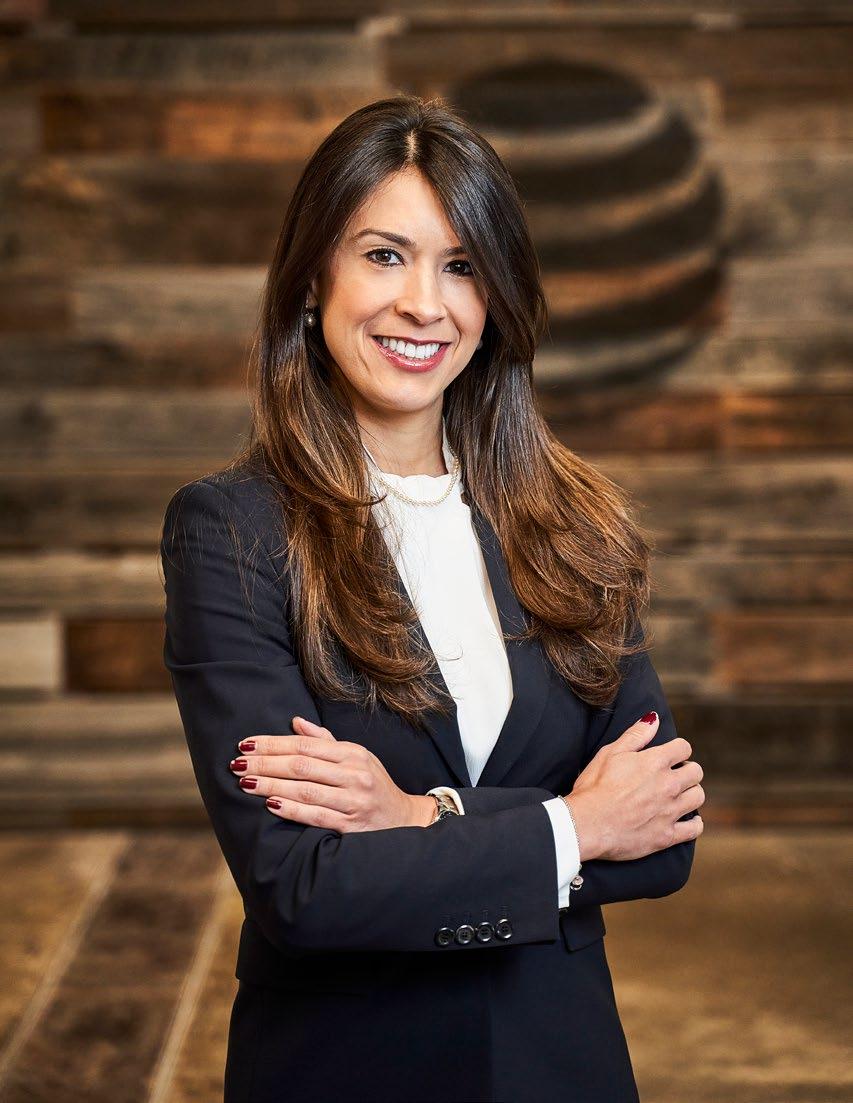
INGRID BERNER HAS A LOT ON HER MIND.
As vice president of international tax for AT&T, she oversees more than 100 jurisdictions with the support of a team composed of 110 members located in more than 20 countries around the world. She is responsible for all tax-related matters on those jurisdictions, which includes ensuring that more than 40,000 tax returns are filed each year, leading tax audit management, and supporting the company’s endeavors across all of its different business units.
But recently, both Berner and AT&T as a whole have been working to simplify and streamline the international tax division’s operations. Even if that means turning everything they know on its head. Her mission? Providing world-class tax service to AT&T, its shareholders, and its customers.
A native of Brazil , Berner initially trained as an attorney at the Universidade Presbiteriana Mackenzie. But upon graduating in 2004, Berner made a decision about continuing her education that many would call unusual for the field—a decision to pursue not one, not two, but three master of laws (LLM) degrees in both Brazil and the United States.
“I think a lot of people would disagree with me, but I strongly believe that a master’s degree can help a lot, not only via career growth but all other aspects of your life,” Berner says. “It helps you think faster and outside the box. I totally agree with Benjamin Franklin when he said, ‘An investment in knowledge pays the best interest.’”
Those abilities have certainly served Berner well at AT&T, the largest communications company in the world and the parent company for renowned media and technology companies such as DirecTV and WarnerMedia Group.
Since starting at the company as regional tax executive director in 2015, Berner has continued to broaden her knowledge of AT&T’s tax organization as assistant vice
president of tax and now as VP of international tax. In that capacity, Berner is responsible for all tax matters in each country where AT&T has a presence. “But I’m also responsible for supporting all of the businesses in those jurisdictions and helping make sure that AT&T can do business in those areas, no matter the economy or regulatory environment,” she notes.
“In my five years at AT&T, I have been involved in various projects and had the opportunity to work with different groups across the organization, but what I am really passionate about is teamwork. When I joined as VP of international tax, I had the challenge to integrate the teams that we had inherited on the acquisitions of different business in different countries, with different technical backgrounds and different perspectives,” Berner recalls. “It was clear to me that if we were able to leverage our teams, we would be able to drive cost synergies while also implementing consistent policies to manage tax across our different businesses.
“The tax organization has a long-standing reputation within AT&T of delivering significant shareholder value,” Berner continues. And in less than two years in her role as VP of international tax, Berner has found a novel way of ensuring and optimizing that value.
“With the recent WarnerMedia merger, the increase in our global footprint, and its related international revenue, our international operations have gained a whole new significance and relevance to our organization.”
To realize this aim, Berner has transformed the international tax organization. “We are now structured by region, not business. I don’t have one tax leader for Warner Brothers, another leader for HBO, and a third leader for AT&T Legacy,” Berner explains. “Rather, I have one single leader per region who is responsible for supporting all of the businesses operating in that region.”
“It was clear to me that if we were able to leverage our teams we would be able to drive cost synergies, while also implementing consistent policies to manage tax across our different businesses.”
Under this new system, Berner says, each tax team works closely with all other AT&T teams in its region, from the marketing and treasury teams to the accounting and legal departments.
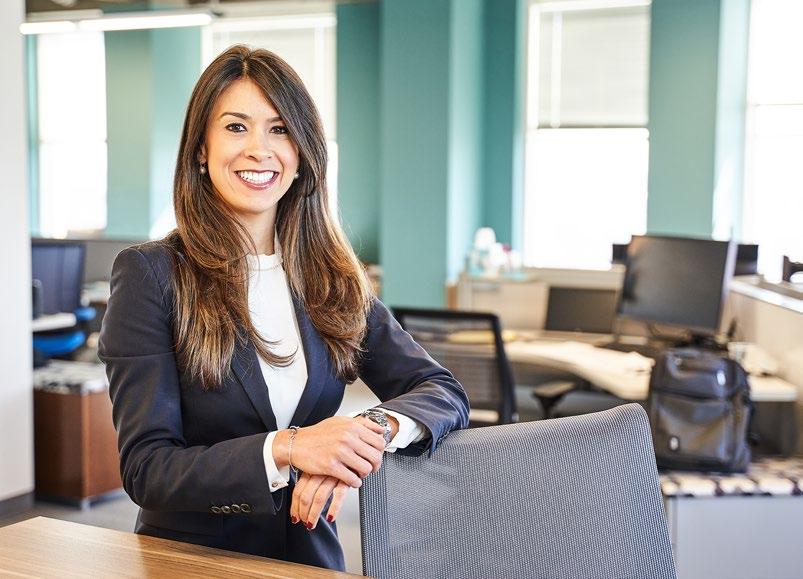
“My teams and I support those areas and help them launch their products,” says the VP, “not only from a tax strategy perspective, but also in terms of the local regulations, the structure of new services, our relationships with local tax authorities, and the legislative changes going on in those countries.”
But keeping current on all those legislative changes can be quite challenging, Berner says. “It’s one of my responsibilities to make sure that my teams are keeping track of how those changes would impact our business, and I rely on my team to get those updates,” she offers. “I need to trust my team. When there is trust, appreciation, and respect, communication is easy and effective.
Fueling advancement
“Managing taxes on a global scale is no easy feat,” Berner acknowledges. Still, her leadership style seems to help a lot with that type of environment. Berner is not afraid of challenging the status quo; to her, different results require different approaches. “We won’t achieve the goals if we keep doing the same.”
That initiative is both respected and praised by the partners with which Berner works at AT&T. “Through trust and innovation, Ingrid has transformed the global tax team,” explains Janet Moran, Deloitte’s global lead tax principal for AT&T. “She encourages a culture of collaboration by addressing tax considerations spanning multiple business units. She has created efficiencies through process improvement and automation. Ingrid optimizes the value the tax team brings to its stakeholders.”
Innovation and technology are extremely relevant to Berner. The tax area is well known for its bureaucratic and manual processes, especially in regard to the international world. Tracking down information from each of the systems used in AT&T’s jurisdictions and dealing with different accounting principles, as well as unique legislation in each country, is part of the job, Berner says.
This year, though, the company is setting out to change all that.
“We’re putting in place an automation project that will allow us to enhance our tax accounting software—as well as our workflow and data storage software—implement a tax compliance dashboard, and automate some of our tax reports,” Berner says. “Basically, the idea is that we will be able to create one single ledger for all the different businesses: we would be able to push a button and instantly get the information we need.
“The project should take anywhere from six to eight months,” Berner adds, “but it is very much going to be worth it in the end.”
PwC is proud to support Hispanic Executive and their mission to unite the leaders of the new majority. By turning the spotlight on business’s most influential Latinos, they help drive the community’s unmatched economic, political, and social power. www.pwc.com
“I need to trust my team. When there is trust, appreciation, and respect, communication is easy and effective”












At Home in the World
Florencia Garza has maintained her Mexican roots—while also supporting her Mexican community—over the course of an international career
 BY ANTHONY RUTH
BY ANTHONY RUTH
Over her career, Garza has acted as both an in-house and outside counsel at companies around the globe—including Nestlé. One of her earliest roles was as international legal corporate counsel at CEMEX. Though the company is based in her native Monterrey, Mexico, Garza traveled the globe doing mergers and acquisitions. She describes a connection to home with access to the world as “the key to what my career has looked like.”
Today, Garza is regional general counsel for Latin America at the Swedish beauty company Oriflame, where she’s responsible for all legal matters for the Latin American region, including litigation, labor matters, corporate matters, and finance. It’s a variety she enjoys.
“I had always been more on the corporate side of things and a transactional lawyer, which I love. But this was a more complete role as a general counsel,” Garza says. “It’s
very fulfilling for me. I’ve grown a lot over the year that I spent at Oriflame. I’m getting to know a very different business.”
Learning about the direct-sales cosmetics business—as well as the business partners in her region—has been one of Garza’s biggest undertakings. She has been traveling throughout Latin America to get to know her colleagues, understand the needs specific to each country, and open up communication to facilitate better problem-solving.
“Legal is seen as a last resort [in a lot of organizations]—and sometimes also a bump along the road that you just need to address. It’s not really a part of who you work with on a daily basis, and for me, that’s what creates problems,” Garza explains. “When you’re an active participant in the different business areas, you actually get to drive the car with the people, get to know what their needs are, and preempt any problems that might arise in the future.”
Since arriving at Oriflame, Garza, who also holds a joint master´s degree from Northwestern’s Law School and Kellogg School of Management, has tried to shift the perception of the legal team from roadblock to business partner, driving toward the same goals as the business areas. The two things she finds most important are common sense—“the least common of all the senses,” she says—and being practical.
“Lawyers tend to overanalyze things and give very complex solutions and answers, and that’s not really what the business is looking for,” Garza explains. “We need to simplify solutions and give some perspectives for the business to analyze and make the best choice for where they want to go.”
Another Oriflame corporate initiative has been implementing an automatic, cloudbased system to track all purchases, from requisition to contract to payment, which will help the company better manage finances. “We have visibility now to see the different spend at the company and also make people
While a high school student in Switzerland, Florencia Garza would gaze longingly at the Nestlé headquarters from her room. “I had this very odd, sort of childlike dream,” she explains. “I saw the company from my balcony, and I thought, ‘One day I want to work there.’”
accountable for what they are buying,” explains Garza, who is part of the team driving the project. “It’s been challenging, but it’s also going to be very fruitful in what type of objectives we’re able to accomplish.”
Outside of work, Garza is involved in philanthropy, serving as secretary of the board for Unidos por el Arte contra el Cáncer Infantil, or United for Art Against Childhood Cancer (UNAC), which was founded by her mother. It focuses on leukemia, a leading cause of childhood death in Mexico, where public and private support for the disease is scarce.
UNAC focuses on two main areas: providing bone-marrow transplants and prevention initiatives. They fund ten to twelve transplants a year and the costs associated with them. One patient they helped, whose case was thought to be terminal at twelve, is now twenty-two years old, attending college, and running her own business. “This girl has really grown with us because she was one of the first kids that we helped,” Garza says.
Rechtlich & Gentan I.S.C. began its operations in 2005 in Mexico City, with the idea of a founding partner Claudio Marroquín Mowat to create a high performance office with the commitment to meet in an efficient, timely and friendly manner, the legal needs that its domestic and foreign clients with operations in Mexico may require.
The firm has grown in a sustained manner, constantly incorporating new members with relevant experience from the main law firms in Mexico and in the same way, forming its own professional team, with the purpose to add value to the operations of our clients.

For prevention, UNAC sets up “health pavilions” in public parks, where they provide games and activities to educate children and their parents. “When you actually get to know what your symptoms might be and get the illness diagnosed in its early stages, there are things that you can do—you don’t need to get to the final stages, whereby the only option is a transplant,” she says.
Even with her international accomplishments, Garza says her work with UNAC has been the most rewarding experience of her life. “When you see the difference that you can make, even in one child, that is just the best reaction you can have,” she says. “I think that’s why we are here—to help others be better and take care of their needs.”
“When you’re an active participant in the different business areas, you actually get to drive the car with the people, get to know what their needs are, and preempt any problems that might arise in the future.”
Globally in Tune
BY SARA DEETEROFTEN, WHEN PEOPLE THINK OF HARD Rock International, they think of the brand’s cafes, hotels, casinos, and, most prominently, its vast collection of rock ‘n’ roll memorabilia—guitars especially—signed by the likes of Jimi Hendrix and Slash. But to Candice Pinares-Baez, Hard Rock’s director of business affairs for employment and litigation, the company is all of that and more: it’s a global and inclusive team, a dynamic brand, and a place to both learn and thrive.
Hispanic Executive spoke with PinaresBaez to learn more about what the company has meant to her.
What do you think has gotten you to where you are today? Are there any particular
experiences that have informed your current position at Hard Rock International?
Being a first-generation American, I do not take the opportunities afforded to those in this country for granted. Growing up in Miami with two immigrant parents, I learned quickly that diversity and inclusion are a must to succeed in any endeavor, particularly in growing a global economy and community. Since I was a young girl, my parents have encouraged me to follow my dreams and never take no for an answer. My father encouraged me to be the first in my family to graduate from college and to study to become a lawyer.
I graduated from Miami Sunset Senior High School in Miami, received my bache-
Candice Pinares-Baez trumpets tight-knit teams and the role that team members play as the “bedrock” of Hard Rock International’s global expansion

“[Working at Hard Rock] has helped me understand that our similarities are much more important than our differences.”
Pinares-Baez
We are honored to support Fisher Phillips’ friend and alumna
Candice Pinares-Baez
Hard Rock International
We commend her on her incredible career and continued success
fisherphillips.com
450 East Las Olas Blvd
Suite 800 Fort Lauderdale, FL 33301
lor’s from Florida State University with honors, and earned my juris doctorate from the University of Miami with honors as well. In 2009, I began working at a national labor and employment law firm, Fisher Phillips, where I eventually became partner.
While I thoroughly enjoyed servicing clients and handling litigation, I began taking a keen interest in the actual business dealings of my clients and sought to learn more, so that proactive rather than reactive measures could be taken to minimize legal exposure. It was at that time that I realized that I might be more satisfied servicing one client that I could really delve into.
What exactly appealed to you about the in-house position at Hard Rock when you decided to join the company? Since then, what are the aspects of in-house work that you have enjoyed the most?
Hard Rock International is one of the world’s most iconic brands. It has a global presence, unmatched executive leadership, and resilient values. The thought of working for a global organization that is expanding its worldwide footprint at incredible speed was an exciting prospect to me. Couple that with the fact that it is the first major international company owned by a Native American tribe with amazing values, and I was sold.
One of the things I have enjoyed most about working at Hard Rock is the exposure to team members and cultures all over the world. It has helped me understand that our similarities are much more important than our differences and that Hard Rock’s motto, All Is One, can truly be harmonized if everyone is on the same team. I also find it extremely exciting to work with a company that is growing so quickly all over the world.
The company's global expansion efforts sound intriguing. How do you support, strategize about, and manage the company's litigation on a global level?
Hard Rock is aggressively expanding its portfolio with hotels, cafés, and casinos around the world. With venues in 76 countries spanning 262 locations that include owned/licensed or managed hotels, casinos, Rock shops, and cafés, managing its litigation is no easy feat.
That being said, in the year that I have been with the company, I have sought to streamline litigation processes, accentuate training to proactively limit litigation, and

forge relationships with global partners who can assist and support us in the varying jurisdictions in which we operate.
What are some of the main challenges you have faced during this global expansion, and what is something you are proud of having accomplished despite those challenges?



As the company’s labor and employment counsel, one of the main challenges associated with expansion is ensuring that all proper policies and protocols are put in place at the inception of an acquisition or mass hire.
What are some of the key initiatives the company is taking on due to this global expansion, and how do you work to execute those initiatives?
Hard Rock is expanding in the hotel and gaming sectors globally, and team members are the bedrock of any expansion. In 2018, Hard Rock International was recognized as a Forbes magazine Top Employer for Women. In 2019, Hard Rock International was honored by Forbes as one of America’s Best Large Employers and again as a Forbes Top Employer for Women.
Working to ensure that the organization is doing all it can to continue to make this a corporation where talented individuals choose to work and grow their careers is paramount. Further, ensuring that the company is minimizing its legal risk is absolutely necessary for any company, and more so for an expanding organization.
Fisher Phillips is proud of our tradition of diversity and inclusion. We are committed to developing and expanding our diverse and talented team of professionals and believe that inclusivity strengthens our ability to serve our clients. We congratulate Candice on this well-earned recognition in Hispanic Executive. fisherphillips.com
“Hard Rock is expanding in the hotel and gaming sectors globally, and team members are the bedrock of any expansion.”
Lofty Goals
Former soccer player Steven Amaya became the VP of finance at TaskUs by setting his expectations high
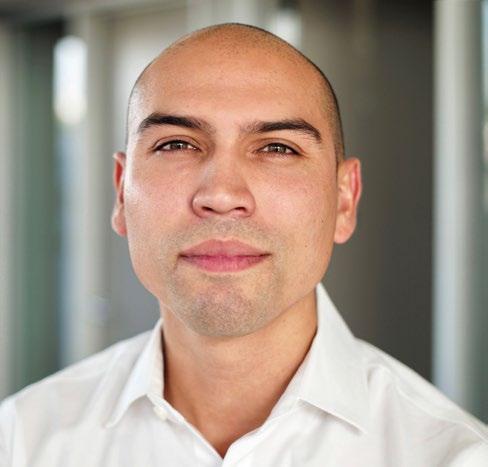 BY BILLY YOST
Steven Amaya VP of Finance TaskUs
BY BILLY YOST
Steven Amaya VP of Finance TaskUs
LIKE MOST
EXECUTIVES
WHO QUICKLY move up the company ladder, Steven Amaya commits to achieving the high goals he sets for himself. When he was headed to college, however, Amaya only had one goal in mind: the kind with a net. “My intention was to get drafted and play professional soccer,” he says. “I went to college to play soccer and eventually enter the draft.”
A life in finance wasn’t something he’d considered—Amaya, now vice president of finance at the global outsourcing company TaskUs, says he enrolled in accounting classes because it seemed like what most of his teammates were doing. “I couldn’t keep taking electives, and everyone on the soccer team either went into business or accounting. I figured the world would always need accountants,” Amaya says, laughing.
Midway through his senior year, Amaya decided it was time to get serious about his prospects. While he’d played well, the path to pro soccer didn’t seem like it was going to work out. He’d already watched too many of his friends and teammates languish for years after college, still trying to find a way to make it to the pros. “I decided that as hard as I’d worked at soccer, I was going to let it go and focus my energy on accounting,” Amaya remembers. That was barely ten years ago, but he is on his way to achieving another lofty goal: to be a CFO.
Amaya’s commitment to improving his professional finance game is clear. Since coming to TaskUs in an assistant controller position, he’s risen to vice president of finance because of his willingness to grow when given expanded responsibilities. “At a point [early on], we didn’t have a CFO, and our executive team was busy trying to grow and run the business. They just needed someone who could help out wherever necessary,” Amaya says. “It didn’t matter if I knew how to do it or not; they were willing to let me run with it and figure it out—and I’m very grateful to have had so much trust placed in me.”
Amaya was promoted to controller, and opportunities to advance continued to arise. Last year he helped take TaskUs through an acquisition by a private equity firm, a deal that wound up getting him promoted to VP of finance. “I’ve been able to keep adding skills to my arsenal to become a true generalist,” Amaya says.
As Amaya’s roles and responsibilities continue to blossom, the local operations of TaskUs have also increased in complexity. “We have a strong culture that we try and duplicate everywhere we operate, but there are other things that you just can’t control,” Amaya says. “Those are most often regulatory or statutory driven, and, from the very beginning, you just have to be honest and say that you don’t know how to do this.”
When TaskUs launched in Mexico in 2019, tax and compliance issues proved to be a sticking point almost immediately. “I had to look in our company and start gathering information and expertise from those who had operated a business in Mexico before,” Amaya explains. Growing means not holding onto ego, and Amaya has embraced the power of not presuming he knows everything. He recognizes the relationships, information, and expertise that the learning process can provide.
Amaya’s commitment to his role includes traveling to TaskUs offices in the Philippines, Mexico, and the US (San Antonio, specifically), while understanding the complexities and what drives each of those cultures. “Working with and helping develop teams in different
“I continue adding skills in the same way I would add pieces to my soccer game, even if it won’t be my strong suit. I’m highly motivated to find different things to do at work, just like I am in my personal life. That’s what keeps me going.”
Hello challenge, meet insight
Whatever your challenge is, and wherever it is, you’ll find PwC providing insight, perspective and solutions. Through our global network of firms with more than 276,000 people in 157 countries, we provide quality assurance, tax and advisory services to many of the world’s most successful companies.
For more information, visit www.pwc.com
parts of the world is a source of great satisfaction for me— it’s an experience that will be valuable in the next steps of my career,” Amaya says. “Teams perform and respond differently in the US than they do in the Philippines or Mexico. There are some talented people around the world who are desperate to add value. It’s important to pave a path for each of them to be creative, take chances, and find their way inside a team.”
This has been a big focus for Amaya over the last twelve months, and it will continue to be as he prepares his team for the next steps in the life cycle of the company. “Maybe an IPO or another acquisition. It would be a culmination of the hard work we have put in over the last few years to support a company that has grown from five thousand to more than eighteen thousand employees worldwide.”
Does this add up to getting that coveted CFO role?
“It’s lofty, and I realize I’m still just getting started in my career,” Amaya says. “But I believe I will eventually be able to put this experience into practice at a different level.”
Amaya says that he got to where he is today by approaching his job like he (still) approaches soccer: he goes all out. “I continue adding skills in the same way I would add pieces to my soccer game, even if it won’t be my strong suit,” the VP says. “I’m highly motivated to find different things to do at work, just like I am in my personal life. That’s what keeps me going.”
“I decided that as hard as I’d worked at soccer, I was going to let it go and focus all of my energy on accounting.”
Taking Higher Education to the Next Level
Miami-based Ilumno has expanded higher education access in Latin America—and for CEO Nuno Fernandes, the mission is personal
BY A.J. ZAKTHE TRANSFORMATIVE POWER OF EDUCATION IS A SUBJECT THAT is close to Nuno Fernandes’s heart. His parents were the first ones from their small village in western Portugal to graduate from a university. In that community of fewer than five hundred people, the most common jobs were in agriculture and fishing. Fernandes’s paternal grandmother was a farmer who didn’t know how to read or write, and when she became a widow, his father had to start working all sorts of jobs at a young age.
“My father had in his mind that the only way to get out of that situation was through education,” Fernandes recalls. His father became a lawyer, his mother became a teacher, and together, they moved north from their village to the city of Porto to pursue their careers.

Today, Fernandes channels that deep-rooted value of learning into his role as president and CEO of Miami-based Ilumno, a company that partners with universities in Latin America to expand access to higher education throughout the region.
“When we say that education changes lives and transforms societies, it can sound like a cliché, but it’s true,” says Fernandes, who was born in Portugal. “I’m an example of that.”
Fernandes has held various roles at Ilumno since joining the company in 2013 and has guided Ilumno along a sustained path of growth. In the last decade, its partner institutions have had a 25 percent average annual growth rate for the number of online students in attendance, he explains. Ilumno serves about three hundred thousand students in Latin America, where less than 50 percent of the population has access to higher education, according to Fernandes. Enrollment has been flat for the region in recent years, and in some countries, enrollment is declining. Schools must compete harder to attract students from a shrinking pool.
But one strong segment in higher education right now is the online market, Fernandes says. Universities often want to grow in that space, but as universities are more traditional institutions, they aren’t always sure how to accomplish that. That’s where Ilumno steps in, providing the technology platform for its partners to grow their online offerings.
Ilumno also harnesses technology to help students who might be struggling. The company uses artificial intelligence to track a range of variables—whether a student pays tuition on time, or how much time they spend on Ilumno’s platform, for instance—to predict how likely that student might be to drop out. Retention is a challenge for univer-
sities around the world, Fernandes says, so helping students make it to graduation is key to Ilumno’s mission.
“The possibility of graduating thousands of people every semester, knowing you put them into the market with new opportunities to pursue better jobs, earn more money, and provide better conditions for their families— for us, it’s the fuel that keeps us going every day,” Fernandes says.
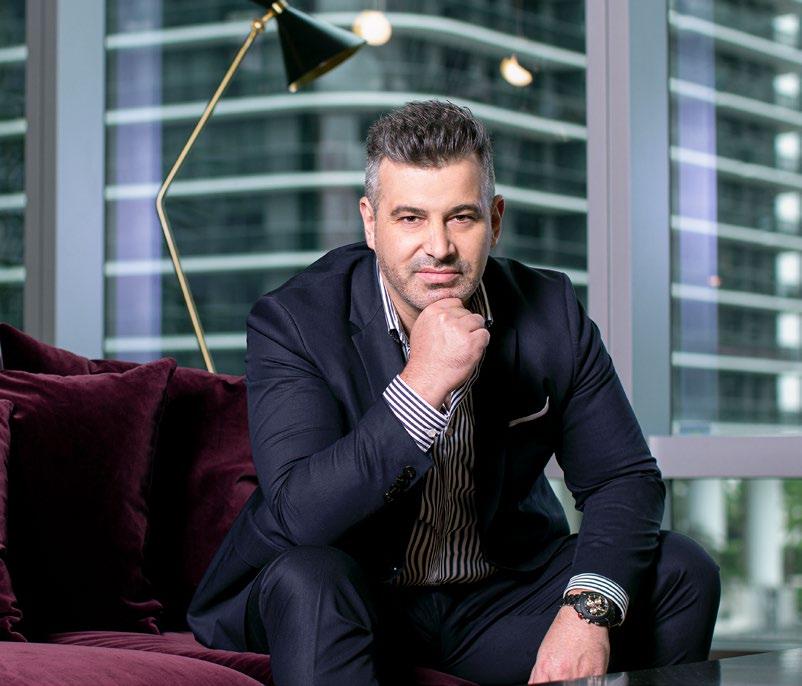
“What you study has such a profound impact on your life. I thought it was fascinating, the possibility of being involved in something like that. That’s really what I found very attractive about Ilumno.”
We were recognized by Great Place to Work as one of the best companies to work in, that's why we are Colombia’s happiest University.

Though passionate about Ilumno, Fernandes has not always worked in the realm of education. Before this, he spent more than a decade in various positions at Bosch, working in Portugal, Spain, Germany, Brazil, Mexico, and the US. He has a bachelor’s degree in economics from the University of Porto in Portugal, an MBA from the W.P. Carey School of Business at Arizona State University, and is trilingual in English, Spanish, and Portuguese.
Ilumno’s social impact is what caught Fernandes’s eye most about the company years ago. As he sees it, a person’s decision about what to study during their time in university is one of the three biggest defining choices in life—right up there with whether to get married and have children.
“What you study has such a profound impact on your life,” he says. “I thought it was fascinating, the possibility of being involved in something like that. That’s really what I found very attractive about Ilumno.”
He still gets excited today about how much more work there is to do. Ilumno is looking at expanding its market in Colombia and also entering the Mexican market in 2020. Peru and Ecuador are two other potential markets the company finds interesting.
Areandina has campuses in Colombia, Panamá and Costa Rica
One of the things Fernandes loves about steering the ship as CEO is that everyone at Ilumno understands the importance of its mission.
“Typically, companies spend a lot of resources and money to tell the employees why they exist and why they are relevant. At Ilumno, everybody knows why we exist. Everybody knows that we exist to expand access to education,” Fernandes explains. “I think that’s really cool, because I’ve never seen that before in such a strong way. We have a great group of people. Our best quality is our obsession with making a positive impact on society.”
“The possibility of graduating thousands of people every semester, knowing you put them into the market with new opportunities to pursue better jobs, earn more money, and provide better conditions for their families—for us, it’s the fuel that keeps us going every day.”
Hispanic Executive
Latino Corporate Directors
A listing of the experienced corporate director members of the Latino Corporate Directors Association*
A
Alex Acosta
Former: US Century Bank
Luis A. Aguilar
Envestnet Inc.
Donnelley Financial Solutions
Milena Alberti RB Media
Odilon Almeida
Millicom International
Carlos Alonso Marum
Former: Esaote, S.p.A .
Joseph (Joe) Alvarado
The PNC Financial Services Group Inc.
Arcosa Inc.
Trinseo S. A.
Kennametal Inc.
Aída M. Álvarez

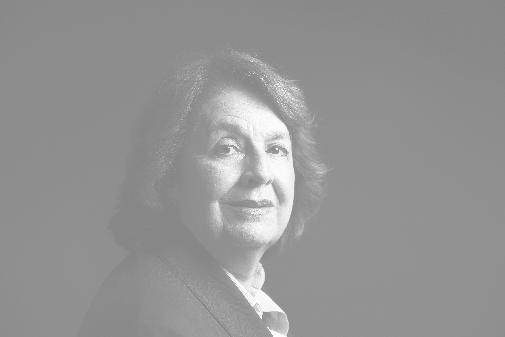
HP Inc.
Oportun
K12 Inc.
Cesar L. Alvarez
Mednax Inc.
Intrexon Corp.
The St Joe Company
Watsco
Fairholme Funds Inc.
Arnoldo Avalos p.106
Cesar A. Baez Lenox Inc.
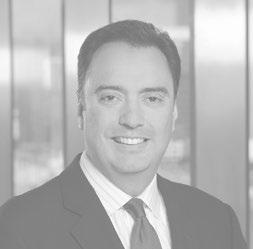
Tetherview Inc.
Ramon Baez
Kaiser Permanente Foundation
Health Plan and Hospitals
Shared2you
C
Anna Cabral Navient
Louis E. Caldera
A.H. Belo Corporation
Lizbeth Ardisana
Huntington Bank
Clean Energy Fuels
Victor Arias
Former: Popeyes Louisiana Kitchen Inc .
Jose Armario
Former: Avon
Former: USG Corporation
Bernadette Aulestia
Denny’s Corporation
Arnoldo Avalos
Entravision Communications Corporation B
Lisa Bacus
Teradata
Culver’s Restaurants
Anna Cabral p.123
Emiliano Calemzuk
Mercado Libre
Roel Campos
Regional Management Corp.
Liquidnet Holdings Inc.
John Paulson & Co.
Michael C. Camuñez
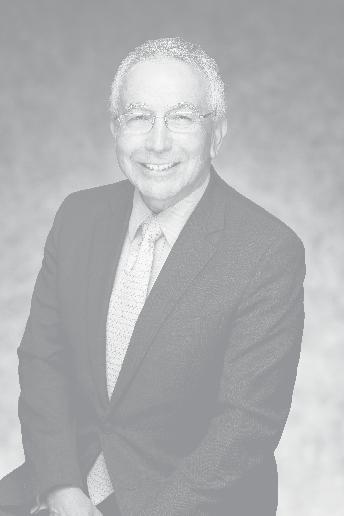
American Funds
Edison International
Southern California Edison Company
Stanford University
Victor G. Carrillo
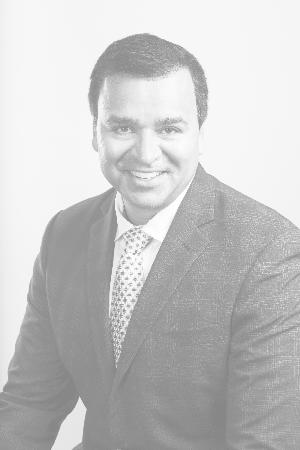
Energy-Hunter Resources Inc .
*Information provided by the Latino Corporate Directors Association in February 2020
Roel Campos p.86, 143
Gilbert F. Casellas
Prudential Financial Inc.
Kimberly Casiano
Ford Motor Company Mutual of America
Tom Castro Nielsen
Cumulus Media
Adela Cepeda
BMO Financial Corp.
Mercer Funds
UBS Funds
CGCM Funds
R. Martin Chavez
Former: PNM Resources
Henry Cisneros Univision
SAT Technologies
Michael Camuñez p.99
208
Hispanic Executive
LCDA Executive Members
As participants in the LCDA’s BoardReady Institute, these members are recognized as board-qualified executives for whom the association is advocating
Anne L. Alonzo President and CEO American Egg Board (AEB)

Carlos Amésquita Former CIO The Hershey Company
Raul A. Anaya President – Greater Los Angeles, Pacific Southwest Region, Executive Global Commercial Banking Bank of America Merrill Lynch
Jose A. Avalos VP of Internet of Things Group and Global Director of Visual Retail & Digital Signage Intel Corporation
Anthony Barrueta SVP of Government Relations for Kaiser Foundation Health Plan Inc.
Kaiser Permanente
Vanessa M. Benavides SVP, Chief Compliance and Privacy Officer for Kaiser Foundation Health Plan Inc. and Hospitals Kaiser Permanente
Ana-Mita Betancourt
Former General Counsel World Bank Group
David Carbajal, CFA, CIRA, JD Former Group Head Pension Benefit Guaranty Corporation
Mario Carrera Chief Revenue Officer Entravision
María-Elena Carrión, CFA
Founder and Managing Partner Multicultural Capital LLC
Patricio Diaz, CFA Head of ISG Capital Markets Bank of America
Romulo (Romy) Diaz Jr. VP and General Counsel PECO Energy Company
Manny Fernandez Managing Partner KPMG
Marcela Garcia-Conti President and CEO OpenCard Group
Sergio Garcia Business Advisor
Rick Gomez EVP and CMO Target
David Rogelio Guzmán Former CIO Staples Solutions
Miriam HernandezKakol Principal KPMG
Veronica Hinojosa Segura Associate Vice Chancellor and Controller
The University of Texas System
Christopher Lalan, Esq. SVP and Director of the Legal Division Banco Popular North America
Anthony López CEO L&L Associates
Francisco LopezBalboa Former CFO Univision Communications
Carmen Ortiz-McGhee EVP National Association of Investment Companies
David R. Perez Entrepreneur & CEO Perez Strategy Group LLC
Cynthia Comparin Cullen/Frost Bank
Universal Display Corporation
Maria Contreras-Sweet Sempra Energy Regional Management Corp.
David Corpus Teacher Retirement System of Texas
D Evelyn D’An Summer Infant Inc. Enochian Biosciences
Pedro DeJesus Jr. Lake Forest Bank & Trust, N.A.
Nelson Diaz
Former: PECO Energy Company
Cari Dominguez p.132
Hispanic
Joseph Dominguez
ComEd
Ana Dutra
CME Group
Harvest Health & Recreation
Greeley & Hansen
Elkay Manufacturing
E
Maria Echaveste
Cadiz Inc.
Edward Escudero
WestStar Bank
El Paso Electric Company
TG Company (Texas Guaranteed Student Loan Corp.) Hospitals of Providence–Transmountain Campus
Irene Esteves
KKR Real Estate Financial Trust
Aramark Spirit AeroSystems Holdings
R.R. Donnelly
F
Jose Feliciano Smart Sand Inc.
FloWorks International
Knight Oil Tools
Gravity Oilfield Services
Wheel Pros
Janus International
Jose W. Fernandez
Iberdrola S.A
Juan Figuereo
PVH Corporation
Luis Fortuño
Former: Abertis Group
G
Art Garcia
American Electric Power
ABM Industries
Elanco Animal Health Inc.
Charles Garcia
Former: Winn-Dixie Stores Inc.
Gilbert Andrew Garcia, CPA Sanchez Energy
Roberto Garcia-Rodriguez
Triple-S Management Corp. Blue Cross Blue Shield Association
BCS Financial Corporation
Medicare and Medicaid Advantage Assoc .
Sarah Nava Garvey Flexshares
Art Institute of Chicago Shedd Aquarium
Amb. Antonio Garza Kansas City Southern Kansas City Southern de Mexico MoneyGram
Linda Griego Viacom/CBS Corporation American Funds
Nilsa Guerrero-Mahon, CPA, CFE NioCorp Developments Ltd. Centura Health Mountains North Denver Operating Group
Xavier Gutierrez
Commercial Bank of California
Artemis Real Estate Partners
Melinda Guzman
Federal Home Loan Bank of San Francisco
Vanir Construction Management
Linda Griego p.94
H
Chris Luna
Melanie Healey
Hilton Hotels Target Verizon
PPG
Carmen Heredia-Lopez
PFM Multi Manager SeriesTrust Catholic United Investment Trust
Maria Hernandez, PhD.

AAA- NCNU (Mountain West Group)
Roland Hernandez Fox Corporation
US Bancorp
MGM Resorts International Take-Two Interactive Software
Beatriz Infante
PriceSmart Ribbon Communications Liquidity Services
Craig Jimenez Air Tractor
Dolores Kunda
Former: Finish Line
Former: Lenox Group Inc.
Grace Lieblein
Honeywell International
Southwest Airlines
American Towe r
Gerardo Lopez
Realty Income Corporation
Newell Brands
CBRE
Monica Lozano
Target Bank of America
Former: Parkland Health & Hospital System
M
Consuelo Madere
Nutrien
Lindsay Corporation
S&W Seed Corporation
Liana Marante O’Drobinak
Carillon Family of Funds (a Raymond James affiliate)
Luis Marconi
MegaMex Foods
JV Hormel Foods
Herdez Del Fuerte Mexico
Guillermo Marmol Foot Locker Inc.
Vitamin Shoppe
Carlos Medina

Horizon Blue Cross Blue Shield of New Jersey
Gil Marmol p.103
Meredith Mendes
Kronos Worldwide Inc. NL Industries Inc.
Quanex Building Products
Lou Miramontes
Rite Aid
Lithia Motors Inc. Oportun
Graciela Ivonne Monteagudo
ACCO Brands
Hon. Pedro Pierluisi
Former Member of Congress (Resident Commissioner for Puerto Rico)
Former Attorney General of Puerto Rico
George Pita EVP and CFO MasTec Inc.
Jaime Ramirez SVP of Global Emerging Markets
Stanley Black & Decker
Julio Ramirez CFO Braidy Industries Inc.
Ed Rivera Chief Strategy Officer and Venture Partner Opes Group
Elizabeth Romero SVP, Client & Franchise Solutions for Small Business Executive Bank of America
Gisel Ruiz Former COO Sam’s Club, Walmart Inc.
Javier Saade Managing Director Fenway Summer
Anthony Salcido Former VP and Corporate Controller
Toyota Motor Sales and Toyota Manufacturing, USA
Jesus Soto, Jr. COO Mears Group Inc.
Elias C. Tavarez Interim VP and CFO Dunns River Brands
Denice Torres Former Chief Strategy & Business Transformation Officer of Medical Devices Johnson & Johnson
Corporate Visionaries
Hispanic Executive
Rafael Torres
SVP of Strategy & Corporate Development Varian Medical Systems
Peggy Turner VP of Lexus Customer Service
Toyota Motor Sales USA
Yasmine Winkler Former CEO, Community and State Central Region and Head of D&I UnitedHealthcare
Sebastian Zugman General Auditor, Global Banking and Markets and Regional Strategy Bank of America
Graciela Ivonne Monteagudo p.88

Michael Montelongo Herbalife Nutrition Ltd.
Larry H. Miller Management Corp. Exostar LLC
Jaime Montemayor
Northwestern Mutual
Angel Morales
Former: Hertz
Former: Rexel
George Muñoz
Marriott International Altria Group
Laureate Education
Anixter International National Geographic Society
Lou Nieto
Fresh & Ready Foods Ryder System Inc.
Patricio Northland
Former: Eutelsat Americas
Former: AT&T Latin America
These honorees of the LCDA Corporate Visionary Awards feature forward-thinking companies committed to advancing Latino representation on their corporate boards
2018 HONOREES
Darius Adamczyk , Chairman and CEO, Honeywell
Bernard Tyson*, Chairman and CEO, Kaiser Permanente
Oscar Munoz , CEO, United Airlines
2019 HONOREES
Peter R. Knitzer, President and CEO, Regional Management Corporation
Patrick J. Ottensmeyer, President and CEO, Kansas City Southern
Pedro J. Pizarro, President and CEO, Edison International
Dr. Ellen Ochoa
Service Corporation International Mutual Life Insurance of America
Gordon and Betty Moore Foundation
Juan Ochoa ComEd
Metropolitan Pier and Exhibition Authority
Stacie Olivares-Castain California Public Employee Retirement System (CalPERS)
Elizabeth Oliver-Farrow
Former: CareFirst Inc .
Margarita Paláu-Hernández Herbalife Nutrition Ltd. Conduent Inc .
Carlos Palomares Banesco USA Regional Management Corp Pan American Life Insurance Group
Rosendo Parra
Former: Pacific Gas & Electric Former: Brinker International
Sonia Pérez Sanderson Farms
Patricia Pineda
Levi Strauss & Co Frontier Airlines
Julio Portalatin Marsh and McLennan DXC Technologies
Jose Luis Prado Hormel Foods Northern Trust Bank Brinker International Evans Food Group
R
Luis Manuel Ramirez
Former: Global Power Equipment Group Inc.
Darren Rebelez
Globe Life Casey’s General Stores
Elena Rios, MD
CareFirst BlueCross BlueShield, Nat’l Capital Area
Dr. Maria Rivas, MD, FACP, FACE Meridata
Emma Rodriguez-Ayala
Former: Fourteen investment funds managed by Mesirow Advanced Strategies
Carlos Rodriguez ADP
Frank Rodriguez
PeopLease Waterfield Holdings
Jose R. Rodriguez

Former: KPMG US and KPMG Americas
Hernando Ruiz-Jimenez Caribe Media Inc.
S
Ken Salazar Target Corporation Mayo ClinicCHi
Maria S. Salinas
Kaiser Permanente School of Medicine
Adalio Sanchez ACI Worldwide Avnet
Francisco Sanchez Archer Daniels Midland
Robert Sanchez Ryder Texas Instruments
Debra A. Sandler
Archer Daniels Midland Co Gannet Co. Inc. Pharmavit e
F. Daniel Siciliano
Federal Home Loan Bank of San Francisco
Jorge Titinger p.118
Alejandro Silva Evans Food Group PrivateBancorp Inc.
T
Marta Tienda
TIAA
Jacobs Foundation
SLOAN
Jorge Titinger
Axcelis
Cohu
Hercules Capital CalAmp Corp
Xcerra Corporation
Francisco Tonarely
Former: Triple S Management
Gary Trujillo
Blue Cross and Blue Shield of Arizona
Wells Fargo Bank of Arizona
Solomon D. Trujillo
Western Union WPP
U
Nina Vaca Comerica Inc.
Cinemark Holdings
Gaddi H. Vasquez
Granite Construction Company
Raul Vazquez
Boards: Intuit, Oportun
Juan Verde
Former: Abengoa Bioenergy
Former: Andes Energy Corp
Adis Maria Vila, JD, MBA MessageComm
Connected Commerce Council
W
Geisha Williams
Former: PG&E
Former: Edison Electric Institute
Former: Institute of Nuclear Power Operations (INPO)
Z
Al Zapanta Planning Inc.
Eddy Zervigon
Maxar Technologies
Bloom Energy
Luis Ubinas
Electronic Arts
Tanger Factory Outlets
Boston Private Bank
Mercer Fund
Aura
Shorelight Education
The Last Word
Wisdom from the Latino board directors featured in this issue
“There are more CEOs named David and John than women CEOs in the entire Fortune 500.”
—JORGE TITINGER, P118
“All ideas cost money, and so strategy and prioritization are absolutely essential.”
—LUCINO SOTELO, P115
“Nonprofits need to be mindful of the bottom line, and for-profit companies need to have a social purpose as well as a financial responsibility.”
—AÍDA ÁLVAREZ, P110

The challenge is to not let yourself be intimidated by your differences and recognize the value and the strength that you bring to the team.”
—MICHAEL CAMUÑEZ, P99



